#his nuances become a lot more apparent during a rewatch
Text
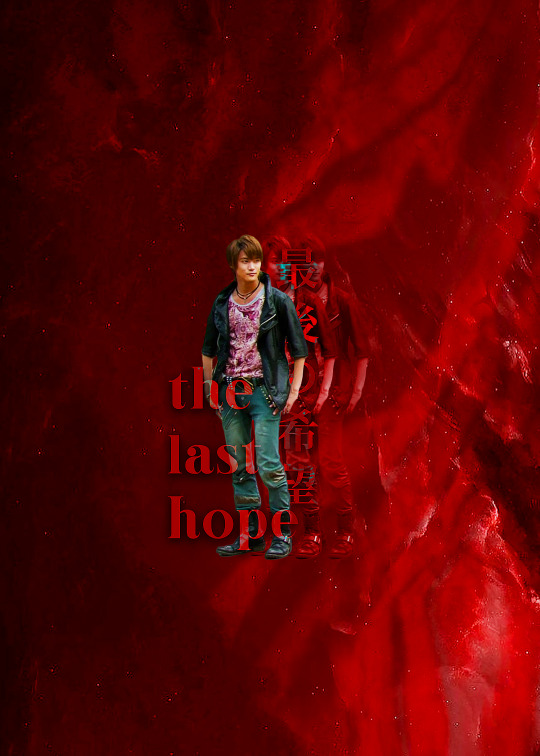
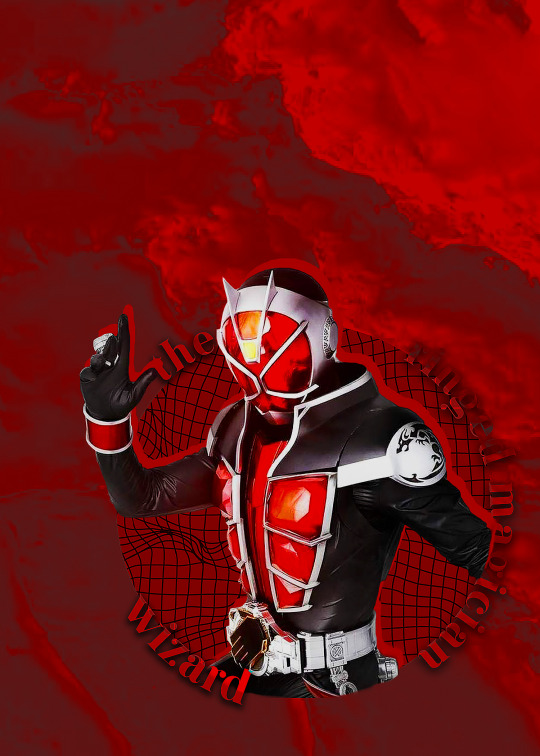

Tokusatsu × Valentines Day! | Your Tokusatsu Valentine! -> Haruto Sōma/Kamen Rider Wizard
"I didn't fall into despair because of my magic. I was able to gain my magic because I didn't fall into despair."
#kamen rider wizard#kamen rider#wizard#haruto soma#soma haruto#tokusatsu#tokuedit#my gfx#my edit#tokuvalentines#haruto is a character that i've come to appreciate a lot more as time goes by#his nuances become a lot more apparent during a rewatch#he's also probably the funniest man in existance#*sigh* why is it always snarky men with a soft side
19 notes
·
View notes
Text
Restless Rewatch: The Untamed, Episode 22 part one
(Masterpost) (Other Canary Stuff) (Previous Post)
Warning: Spoilers for All 50 Episodes!
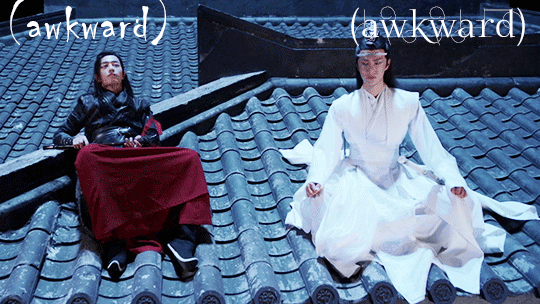
Not Quite Like Old Times
We ended the previous episode in daylight, with Lan Wangji putting Wei Wuxian and swordpoint and declaring his undying love lecturing him about his lack of sword skills.
We start this episode in full night, with the two of them sitting on a roof together. Presumably they spent the missing scenes getting dinner in the mess hall, doing some laundry, and definitely not making out. Fic writers, do your thing.

Finally, FINALLY, Lan Wangji has chilled out enough to actually sit and listen to Wei Wuxian, instead of yelling at and/or physically attacking him. The Zoloft is really helping!
Wei Wuxian is indulging in romantic recollections of their first rooftop encounter. Lan Wangji, who has loved him since he first laid eyes on him and who wrote a whole song with an entire music video about their love, featuring that very same rooftop encounter, shuts him down so completely he might as well have whipped out Bichen again.
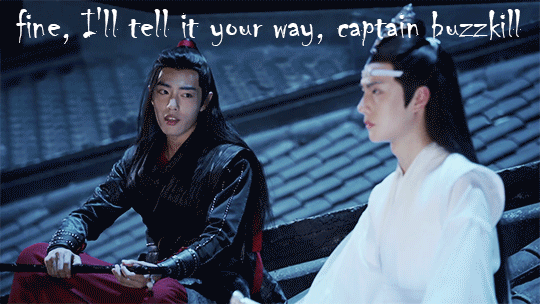
First he corrects his description of events by pointing out they were fighting, not talking, back then. Then when Wei Wuxian continues in his charming, smiley reminiscing vein, Lan Wangji says "things change, how could they stay the same" with a deep, sad, weariness.
He seems like an old man in this moment, and I feel for him, really, I do. But he's not the one who's carrying the actual essence of death around inside him. Wei Wuxian is being much more generous in this interaction than Lan Wangji is.

Wei Wuxian thanks him for not narkng to Jiang Yanli about the whole talisman/forced suicide/ghost hummer/ghost flaying thing he did back in Yiling. Like there is any way Lan Wangji would ever tell Jiang Yanli, of all people, something like that about Wei Wuxian. He's lying to his own brother to cover for Wei Wuxian, and Wei Wuxian totally doesn't get it.
(more after the cut)
Unfortunately, there's no reason Wei Wuxian SHOULD get it, at this point; Lan Wangji has not communicated anything but disapproval to him since his return, and Wei Wuxian, despite their (apparently temporary) mental linkup in the Turtle cave, is not a mind reader.

Lan Wangji is so hurt here, and Wei Wuxian appears to ignore that, continuing to smile and laugh; he’s still sunny, still happy. Seriously, they are so tonally out of step with each other in this conversation, it's excruciating.
Lan Wangji: I’m feeling good about my tear-holding-back ability
Wei Wuxian: do I look more fuckable sitting up? Or leaning back?
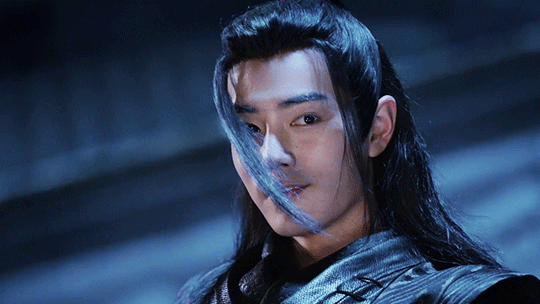
But every one of these smiles is an absolute lie. This is Wei Wuxian appeasing an authority figure; baffling with bullshit and skating by on charm. This is not a young man confiding in his soulmate.
Even when the conversation shifts, and they talk seriously about what is going on with him, Wei Wuxian is barely confiding anything. He briefly acknowledges that he was in the Burial Mounds for three months, and shudders at the memory, but Lan Wangji doesn't respond to that other than to look away from his face.
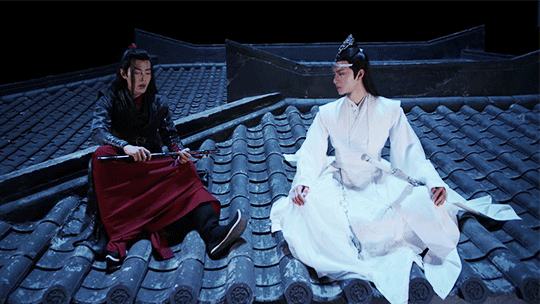
This is almost the last thing Wei Wuxian will ever say to anyone about that experience. He only alludes to it again when Jiang Cheng visits the settlement and talks smack about their corpse turnips. Lan Wangji says he wants to know why Wei Wuxian’s cultivation changed, but he really doesn’t; he just wants to convince him to change it back.
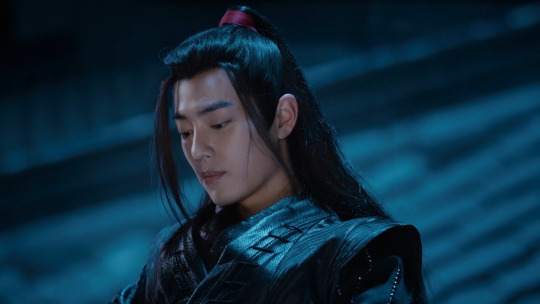
Wei Wuxian explains about using Lan clan techniques to protect his temperament, as well as the flute and talismans, to control the resentful energy. This is a good reminder that Wei Wuxian was never a bad student. He was an outstanding cultivator within the Jiang Clan, and he learned a hell of a lot during his time in Gusu, despite getting expelled for fighting.
His original golden core was stronger than Jiang Cheng's, even though he apparently started cultivating later. Yes, he fell asleep during meditation that one time in Episode 43, but that's not because he's bad at meditating, it's because he was tired from getting railed all night by his boyfriend stabbed in the gut by his nephew.
Lan Wangji eventually manages to ask him a question like an interested fellow human being sharing knowledge, instead of like an authoritarian dick calling him to account.
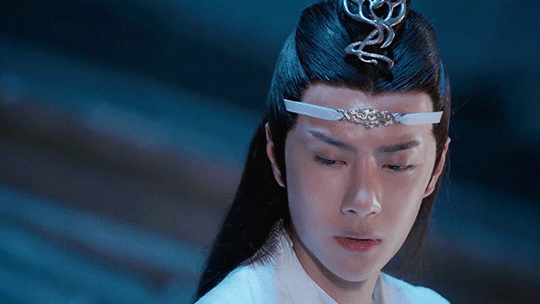
Side note: I still am flopping around trying to find good-sounding English terms for Chinese philosophical concepts. I kind of like "ghost path" vs "sword path" for the two styles of cultivation - I don't know where I saw that, apologies to the translator. I like "necromancy" for the part where the dead are reanimated and controlled, because we definitely have that in English. But there are many layers of nuance in these conversations that English is not equipped to render in a natural-sounding way.
Lan Wangji tells him, again, that it's dangerous, but this time he does it in a gentler and more poetic way, saying it's like taking grain from a burning fire, and says he's in danger of becoming the novel version of Wei Wuxian a demonic cultivator. Wei Wuxian, also gently and seriously, says he knows.
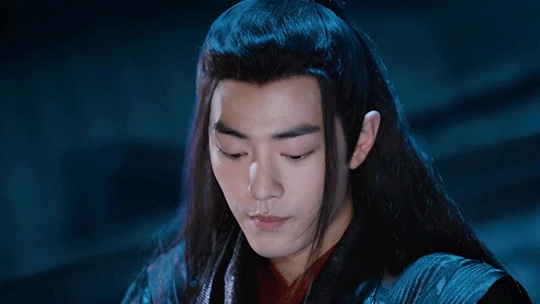
Then he immediately goes back to his lightest tone and promises, with his three-fingers gesture, that he will not fall into demonic cultivation. This gesture is basically the Wei Wuxian "I am totally fucking lying" salute.
He is totally fucking lying, and he MUST know it. He's baking the Yin tiger amulet every day during his meditation, getting ready to use it against Wen Ruohan, getting ready to take over his army of the dead.
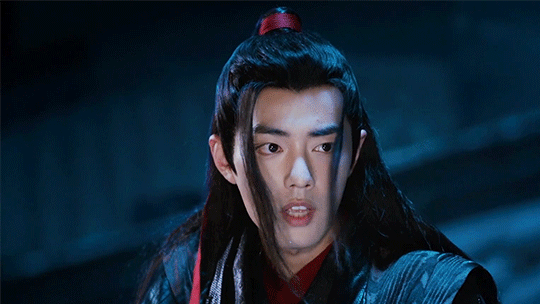
He has the audacity to ask Lan Wangji, "do you believe me?" and Lan Wangji, also totally fucking lying, nods. Their relationship is just as broken right now as it was before their courtyard sparring session.

You can tell it's broken, because after they've reached this apparent place of peace, Wei Wuxian just hops down off the roof and LEAVES Lan Wangji sitting by himself. When has Wei Wuxian ever been like "gotta go!" with Lan Wangji? The last time they were here, he spent the night sleeping on the roof tiles just so he could be near him.
As he leaves, Lan Wanji stands up and says "let me help you." Wei Wuxian is not a fan of that idea, at all, if his expression is any guide.

He agrees, though, and leaves smiling, apparently for real, but maybe just practicing for all the fake smiles in his future.
Hooray for War
In the morning, Nie Mingjue makes an angry speech to the 2 dozen cultivators who apparently make up the army. Extras are expensive, y'all.
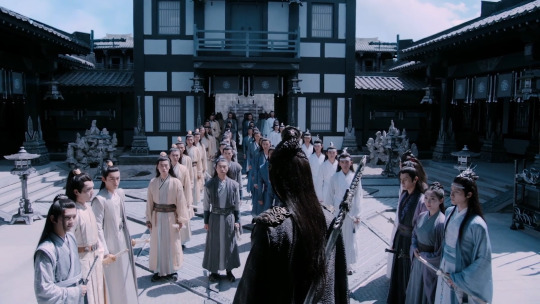
The senior cultivators are standing to the right or left of him, with the Lan brothers bracketing the Yunmeng sibs. Lan Wangji and Jiang Cheng are both staking their claim to Wei Wuxian, while Lan Xichen is standing in the spot closest to Nie Mingjue; Nie Huaisang is on the opposite side with the Jins.
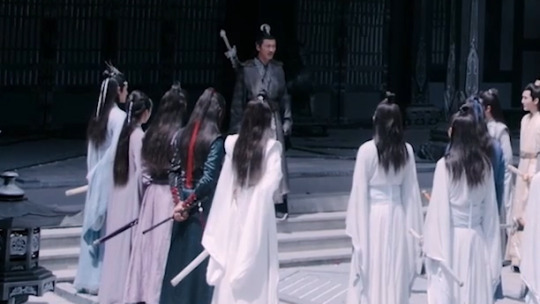
All of the random cultivators yell a war chant in response to Nie Mingjue's speech, while the senior cultivators are like, we don't have to do that yelling stuff, thank goodness.
Nie Mingjue's war outfit includes metal (ish) epaulets on his shoulders and a totally not-kinky belt featuring multiple rings with nothing attached to them (yet) and an angry demon face right above his junk.

Nie Mingjue says we're going to storm into Nightless city and I'm going to chop off Wen Ruohan's head! By which he means, I'm going to get captured and get my ass beat, and then my murder-babie ex-boyfriend who had this belt specially made for me is going to stab Wen Ruohan in the back while he's distracted. They do say no plan survives contact with the enemy.
Side note: Baxia makes a loud metallic "shnk" noise when NMJ takes it off his back during this speech, even though Baxia does not have a scabbard. You do you, Baxia.

All the senior cultivators file out down the center while everyone else parts to let them pass. Then everybody does the Electric Slide.
Jiang Cheng tells Wei Wuxian they should go ahead of the main force to get some killing in early, but Wei Wuxian just pulls a face and looks down, staying with Lan Wangji.
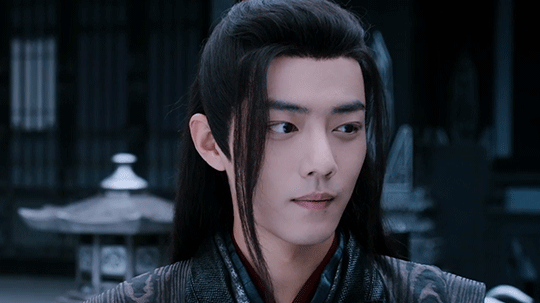
Jiang Cheng is disappointed, and no doubt takes this as a sign of WWX choosing LWJ over him. But actually, WWX can't fight side-by-side with Jiang Cheng without showing his weakness.
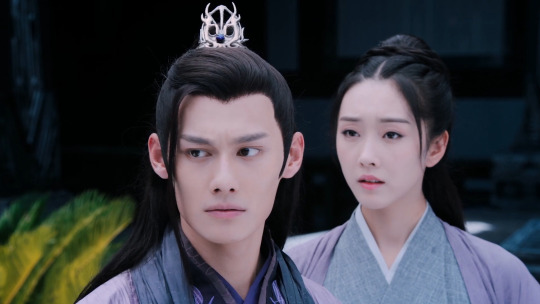
LWJ and WWX exchange one of their unspoken "let's go" eye touches and get ready to ride out together with the main force.
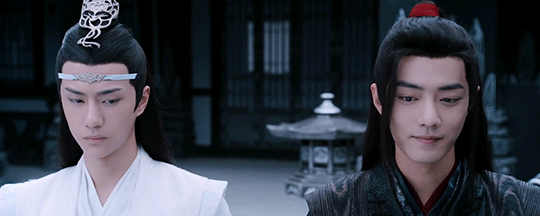
Lan Wangji is still super, super sad. Wei Wuxian is still fake. But something is starting to knit together between them, and once they can hit a battlefield together, it will get a lot stronger.
On A Horse With No Name
Everyone rides out on horses, which will presumably get eaten somewhere along the way, because they appear to travel on foot after this. While Wei Wuxian practices his horseback-flute-twirling, Lan Wangji asks why Wei Wuxian didn't go with the forward force to fight.
Wei Wuxian says that he has a case of the don'wannas, and Lan Wangji snarkily points out that he used to like fighting. Wei Wuxian reacts, just as he did at the end of their sword fight, with embarrassment, and doesn't answer.
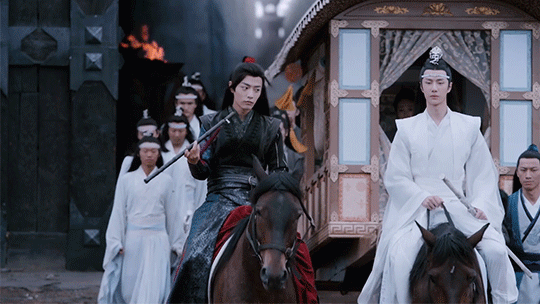
Lan Wangji, sweetie. You are really not helping.
At this point, despite their ongoing fighting, Wangxian are clearly together again. Lan Wangji isn't riding with his brother; he's RIGHT next to Wei Wuxian, and will stay close to him through the rest of the campaign.
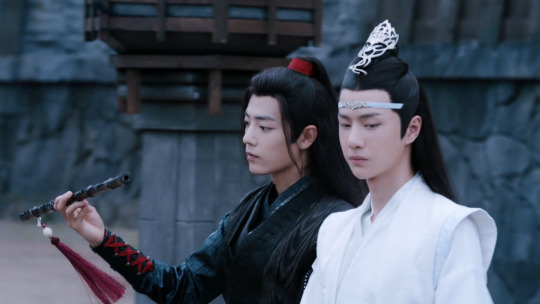
Nie Huaisang hollers "Wei-Xiong" from the top of the battlements and tells him to take care. Wei-Xiong lifts his flute in acknowledgement while Nie Huaisang looks worried. He doesn't tell Nie Mingjue or Lan Wangji to take care, just Wei Wuxian. Wei Wuxian is his particular friend, more than Lan Wangji is, but he may also be concerned because he can tell that Wei Wuxian isn't well.

Nie Huaisang hasn't yet developed the deep cynicism that he calls upon in his quest to avenge his brother, but he has always been a voracious collector of information, and he is keenly observant.
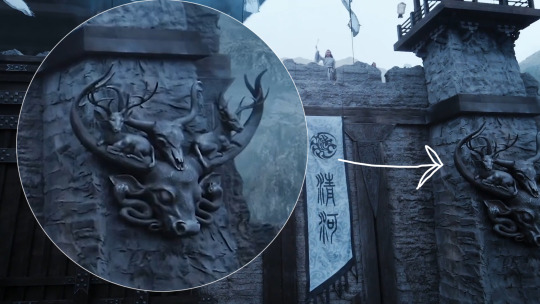
Side note: what the fuck is going on with this sculpture? Kudos to the artist. This has beautiful forms, and is weird and disturbing. The main head is wearing a horned skull on its forehead, small ungulates that I hesitate to call “deer” chilling on its horns, and...snakes? biting its ears?
Boring Wen Interlude
Wen Ruohan is waving his hands around. Sigh. This is one of the more boring villain performances ever, and it's not the actor’s fault. They could have given him a sidekick to yell at or something, so we could get more than just hand waving. I’ve given up screen capping any of this; there are more interesting things to look at.
Battle Moves
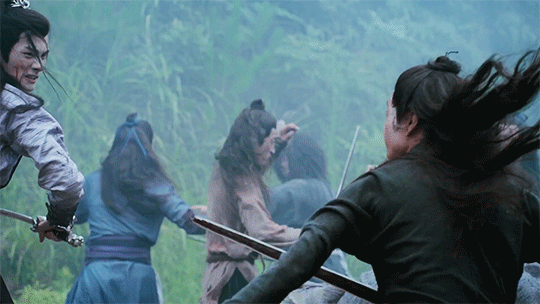
Jin Zixuan and Jiang Cheng and their forces have an extended fight scene with a bunch of puppet dudes and stuntmen in harnesses.
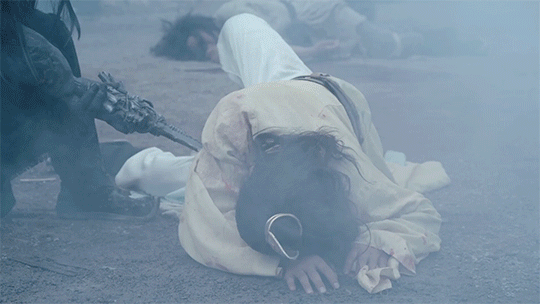
It's pretty fun to watch. (Fanvid with more over here)
The gist of the fighting scenes is that Wen Ruohan is getting stronger, and Klingons are hard to beat.

Battle Planning
Finally we see a sidekick with Wen Ruohan, although he's blurry so it's hard to tell that he is totally Meng Yao.
The Sunshotters have set up a Battle Camp Playset. It's got chunks of gates and walls that don't connect to anything, like a Duplo set. It's just randomly open for most of the back area so that anyone can walk in.

They've got a cage of hilarious definitely-not-zombies set up, and the rest of the wounded cultivators are lying on the ground.
The main battle trio go chill in Nie Mingjue's incredibly fancy tent. They talk it over and say it's impossible to kill unkillable enemies, "even when we have millions of troops." And by “millions” they mean “dozens.”
Nie Mingjue decides the way to handle it is to kill the leader and everyone else will collapse, because he has watched vampire movies and the last season of Game of Thrones and that's how it works. Watching the last season of Game of Thrones is why he is so angry all the time He says he's going to sneak into Nightless City and assassinate Wen Ruohan.
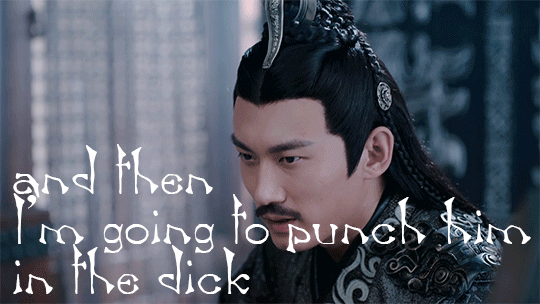
Okay, first of all, Nie Mingjue can sneak? I don't believe it. Second of all, if that was possible, why didn't he do it as soon as Wen Ruohan attacked his clan?
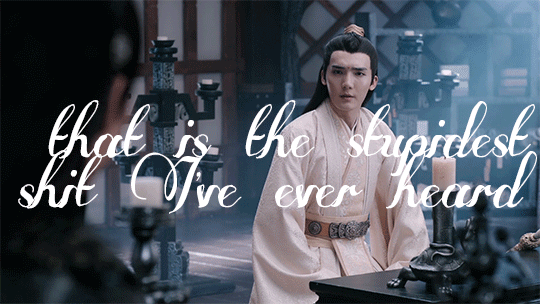
Nie Mingjue wants to take the biggest risk because he's the commander in chief, which is not how commanding is supposed to work, but okay.
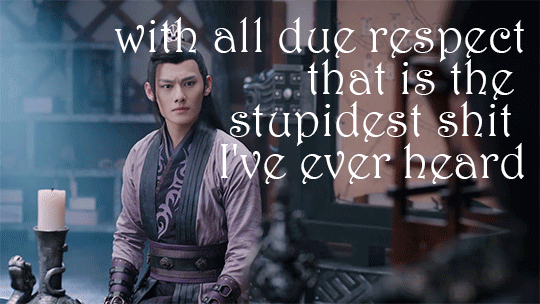
He says if he dies, Zewu Jun will take over. Jiang Cheng starts to protest but Zewu Jun appears as if conjured, and shows them a map that will...dear GOD his hands are beautiful.
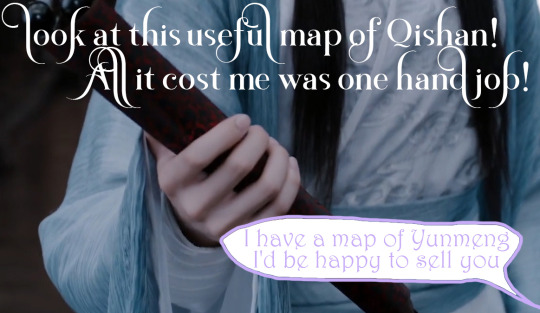
It's a helpful map, painted in multiple colors with careful writing on it, so if anyone were to show it to Nie Huaisang he would probably go "oh cool Meng Yao painted that" because anyone who could paint that well probably spent a fair amount of time at it on a regular basis. But, Nie Huaisang isn't here so, nope.

It’s always nice to see Jiang Cheng smile.
Wei Wuxian and Lan Waniji examine some of the puppets to see what's up. It's transmitted by touch, and Lan Wangji says that curing one dude takes three months of spiritual power. Ain’t nobody got time for that.
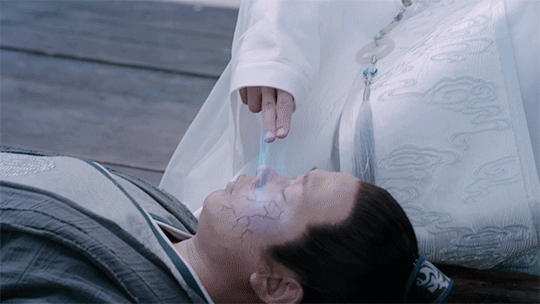
Writing Prompt: Missing scene! How did they get from the fight in the courtyard to the talk on the roof?
Soundtrack: 1. Shine on You Crazy Diamond, by Pink Floyd 2. Electric Boogie, by Marcia Griffiths
#the untamed#the untamed gifs#wangxian#the untamed meta#canary3d-original#my gifs#wordcount 2379#restless rewatch the untamed
219 notes
·
View notes
Text
“The 02 characters didn’t get any character development”
Yes, they did.
“But -- “
Yes, they did.
Having had the gift of having rewatched 02 recently, I have to say that it still really, really confuses me how the hell people get this impression. It’s not even “I’m trying to see the best out of this” but that I genuinely do not get it, because as far as I’m able to see it’s pretty much literally right there!! This isn’t even tinfoil hat tier!
But in case you have any doubts, sit down because Shiha’s gonna sit here and write a meta about the 02 kids, and how they are perfectly reasonable characters that developed properly fine over the course of the series.
(All below translations of 02 dialogue are by PositronCannon.)
So the first thing to understand about 02 is that it is fundamentally made with a very different writing approach from Adventure in the first place, and therefore it is not meant to be compared in a one-to-one fashion.
This is a point I’ve said many times over and over, and I think it’s to the point where it shouldn’t even really need official clarification, but I’m just going to go ahead and bring up the words from Director Kakudou himself:
For instance, we had the prior series stick out in terms of its points about “what it means to be oneself”, and for 02 we made it so that you would pay attention to “the relationship between yourself and other people”.
Right, so: 02, by design, does not use Adventure’s character development methodology of “self-awareness”. It is built from the ground up by having its characters and character development predicated on relationships instead of singular characters. This might seem a bit odd on its face, but no man is an island, and, in fact, changing the way you interact with other people and with the world in general does speak a lot about one’s personal growth in its own way. And this also means that if you try to analyze 02 by holding it to Adventure-based standards of “character focus episodes” or the like, you’re already on a losing battle.
This means that character growth in 02 is not presented in a way where it’s up-front and center, but rather something you have to glean over the natural course of the series. We’re working off relationships, so you have to actually pay attention to the natural interactions between the characters or what they say even during “off-hours” -- the focus-episode format used by Adventure doesn’t apply here anymore. And it’s something apparent enough from how “evolution” is a metaphor for “personal growth” in this franchise -- in Adventure it was via the Crests, which meant self-awareness, but 02′s key evolutionary trump card is Jogress, which relies on the strength of relationships.
One thing I have to say in terms of my experience as a 02 fan is that I’ve found I actually appreciated it significantly more as an adult than I did as a kid, and that, in general, a lot of the things to appreciate about 02 are things that you really viscerally feel and understand when you’ve gotten that degree of life experience under your belt. Unfortunately, this is kind of a double-edged sword, too, because it ends up becoming the kind of series that often risks going over the heads of the very audience of children it was supposed to be targeting. It’s got a lot of very nuanced depictions of mental health and the childhood experience that are maddeningly subtle, to the point of possibly going over one’s head or even coming off as illogical without sufficient life experience, or simply just not being as visceral (the entire theme of “parents stroking their own ego with their kids’ achievements” hits the hardest when you’re college age).
So what this means is that 02 doesn’t exactly hand its themes or character development to you on a plate. But it is there, once you actually start looking for it.
Let’s start off by talking about our main core cast of characters. Adventure and 02 prided themselves on the fact that they tried very hard to not be adherent to anime tropes, but rather to portray well-rounded, nuanced characters that felt more like actual kids you might meet at school. So how does the 02 cast fare in not being pigeonholed anime tropes?
Daisuke: Even though official freely admits he has “the most anime-like personality”, it’s hard to say he actually falls that much into the generic shounen archetype. For one, he’s actually shockingly humble and polite in certain situations (he’s consistently polite with his elders, and is very quick to admit his own limitations). Actually, he comes off as a surprisingly friendly and deferential person -- it’s just that he happens to have somewhat of an abrasive exterior, and even then it’s implied heavily in the first half that this stems from a lack of validation and purpose. (He actually “deflates” really easily, so you can’t even say he’s all that arrogant past the surface.) Certainly he’s simple-minded, and kind of an idiot, but his abrasive exterior is actually pretty deceptive.
Miyako: Miyako floats an interesting duality of simultaneously being aggressively feminine and being aggressively un-feminine -- not necessarily in the sense she tries not to be feminine (on the contrary, she absolutely embraces it), but more that she’s also an aggressive, “inelegant” mess in ways atypical for a lead heroine in a shounen show, who are usually either cute or “badass action girls” and not...a mess. Despite that, she is also consistently portrayed as capable of heavy emotional depth and being very genuinely kind and concerned about others, which are not in any way diminished by the fact she happens to be an aggressive mess with a severe case of foot-in-mouth syndrome. It’s an interesting mix of character traits that you don’t see often.
Iori: “Designated young characters” usually fall into the “cute” archetype a la Adventure!Takeru or Tomoki, so it’s interesting that the youngest one is actually the most mature one, and impeccably polite at that (having been raised by a family that emphasizes formal manners and propriety). Even more interestingly, nobody actually treats him like he’s that much younger, and he’s given the weight of respect in a sense that has nothing to do with his age (think about how there are indeed quite a few kids who simply just get along better with older kids). Yet the series doesn’t shy away from his youth, and his overly black-and-white view of morality is portrayed as immaturity in its own way, along with the occasional “slips” in his facade or manners indicating that it’s still something he has to consciously focus on.
Ken: Ken’s development goes without saying (it’s one of the most consistently praised aspects of 02), but it’s also interesting to note the unusual way the series plays his redemption arc. Instead of making him a typical “jerkass anti-hero who learns to get a bit better”, the series completely blindsides you by revealing that Ken is, in fact, a naturally soft-hearted and kind boy, and then plays up the mystery of the severe kinds of trauma that would lead him down that path. And ultimately, even though the cause is revealed to have supernatural influence, the series also makes it clear that it doesn’t matter -- that, whether it was his conscious “fault” or not, he still is responsible for what he did. And on top of that, it also scorns the usual “redemption by sacrifice” mentality by pointing out that it’s a cop-out -- it doesn’t actually solve the problems that were caused, and, in fact, a much better way to make up for things is to fix them going forward.
Takeru: Takeru had the “designated young character” role in Adventure, and it turns out that once one of those gets a few years older, they’re naturally not going to be nearly as pure and innocent! The “sweet child” from Adventure has now grown into having slightly pettier emotions, even to the point of grudge, and things he won’t let go of. Oh, and also, trauma from three years prior is still going to have impact on an eleven-year-old kid. Who would have thought.
Hikari: Adventure’s most infamously inscrutable character also seems to have gained some individualized, not-quite-innocent traits of her own (observe how she deals with Daisuke’s advances), and, moreover, it turns out that her deferential humility and refusal to open up about her problems is...not a good thing! when it starts to actually bite her in the rear in front of her friends. Yeah, it turns out that being the “quiet cute girl” actually has its own mental health drawbacks. Oops.
We’re doing pretty well, actually! At the very least, they certainly feel like they already have the Adventure/02 brand of character nuance, where their personalities are inherently varied and nuanced enough that you may not quite find characters like them elsewhere. On top of that, we definitely get to see what makes these characters “tick” -- we get a lot of depth into their thought processes and what their likes and dislikes or strengths and weaknesses are, and that’s something 02 still completely beats out a lot of other kids’ shows or even certain other Digimon entries with.
But here we’re talking about character development. So what do we know about them at the very beginning of the series?
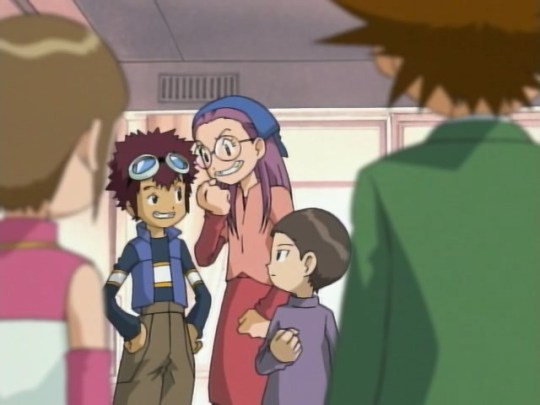
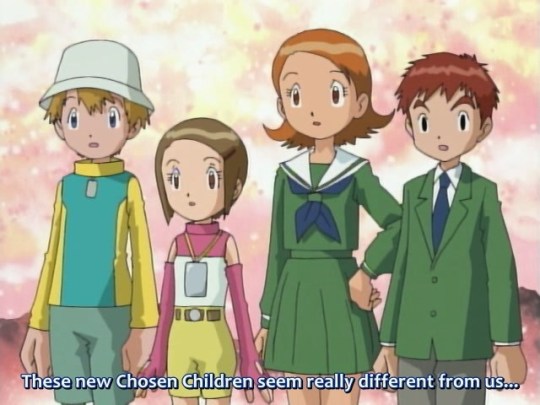
Having watched 02 in Japanese a few times and being very used to the core cast’s latter-half characterizations, rewatching the early episodes always strikes me really hard in the face with genuine shock at how shallow the kids -- especially Daisuke and Miyako -- start the series off as. It’s understandable in terms of the context of the series -- unlike the Adventure kids, who were thrown into a “survival, need to get home” situation off the bat and thus already understood the need to be wary, these kids started off having comparatively easy access to home at any time, and didn’t have a constant sense of danger and survival looming over their heads. It naturally took a lot of time for the gravity of the situation they were in to start really hitting them, and so even the relatively straight-laced Iori didn’t exactly take it all that seriously at the beginning.
Yet while it took them a significantly more delayed time to understand what they were dealing with and take it as seriously as they needed to...they started cultivating something else in the meantime.
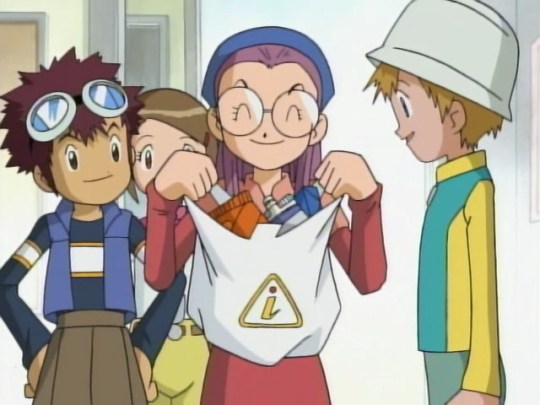
02′s first half is especially full of “random banter conversations” that seemingly involve nothing in particular, but, in fact, that’s actually part of the point. One thing I have always been quick to point out in regards to 02 is that it is rather unique among Digimon series in how it goes out of its way to portray its core cast as having become friends even in pure daily-life social friend terms, even if it had absolutely nothing to do with Digimon incidents -- these are kids who genuinely enjoy each other’s company even in the most mundane of situations. This was something that wasn’t the case for the original Adventure kids -- having been a group of kids thrown together by necessity, even though they most certainly kept in touch and trusted each other as fellow Chosen Children deeply, they started floating back into their own different social clusters after the events of 1999. Relationships are multifaceted, after all; you can still have a deep relationship and bond without necessarily being friends on a social level.
But already, off the bat, Miyako brings food for her new best friends, and it’s implied that she’s the main ringleader behind holding the picnic -- a picnic that started off having no intended relation to the Digital World territory war -- in episode 6. And, to be quite honest, can you really blame these kids? Even the Adventure kids wistfully entertained the idea of a long-term fun adventure through the Digital World in Adventure episode 54, wanting to enjoy its beauty and fun in a situation where they weren’t constantly running for their lives. Now that this luxury is actually available, why not take advantage of it -- and bond further with the others in the process? And for the rest of the year, these kids actively end up spending mundane conversations together and bonding to the point that, by the time we get to the end of 02, these kids have just genuinely bonded so much that they really come off as a cohesive, inseparable unit that would actively choose to spend time with each other if given the opportunity. In fact, even going through all of the TV Digimon series that exist as of this writing, I would say Appmon is the only one that really competes with 02 in portraying its core cast in this manner.
Again, remember: this is a series where characterization is dependent on how the kids treat others and interact with them, so you do actually have to pay close attention to these interactions and see how they change over the course of the series.
So once the episodes start coming in play, we actually learn a lot more about what happens when the characters start breaking away from their shallowness. For instance, episode 8, one of the first key episodes to understanding Daisuke’s character:
Daisuke: He'll be a great opponent. We didn't face off in the last tournament.
Takeru: If you had made it to the finals, you would have, right?
Daisuke: Don't remind me...
Hikari: Can you win?
Daisuke: It's not about winning or losing. Right now, all of the boys who play soccer in this country want to be like him. Just thinking about playing against him makes me excited!
For all Daisuke initially seems to be arrogant, he’s actually not that incapable of humility. Far from it, actually; he does have a genuine love for soccer and the spirit of the game, and, when completely and obviously unmatched, fully admits he has no chance and is set on enjoying the most he can out of it anyway. I feel like Daisuke’s surface-abrasive attitude really does throw off the fact that he’s a lot more genuinely humble than he’s given credit for. In the end, he’s satisfied enough with the accomplishment of pulling off one sliding tackle against Ken, and is able to enjoy that -- a foreshadowing of how the latter half relies so much on the fact that he’s capable of enjoying simple pleasures and being straightforward about them.

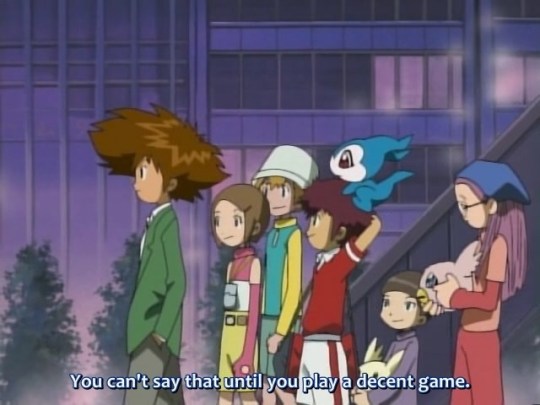
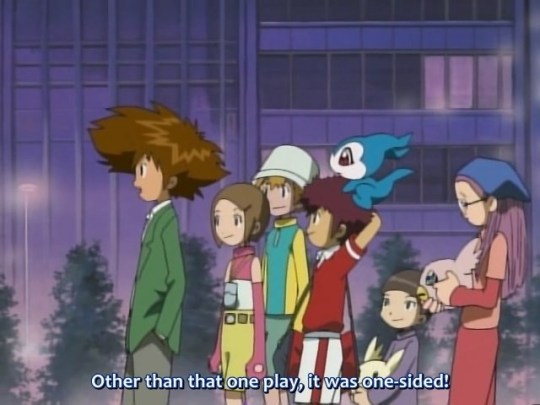
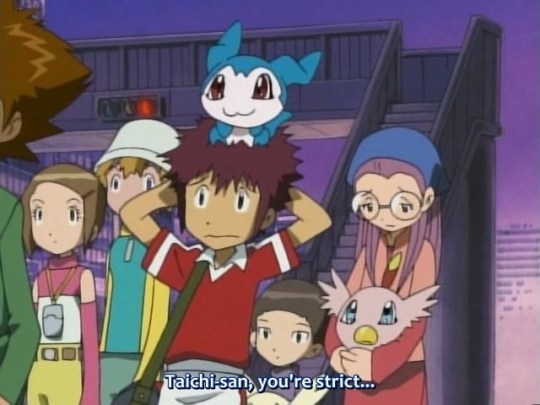
I find that this scene is really underappreciated, too (mainly because it gets lost in all of the other major things in this episode) -- while Daisuke jokes about his accomplishment, it only takes a single comment from his respected senior Taichi to shut him down.
There’s a huge reason I constantly emphasize that Daisuke respects his elders -- this part tends to get lost in translation a lot (especially the American English dub, which just smashed this aspect out of him wholesale, among other things) due to it being a bit reliant on Asian senior deference and cultural propriety, but Daisuke is respectful not only out of societal obligation but also because he genuinely respects his elders! The way he looks up to Taichi and chases after his approval is genuine, and even his interactions with the other Adventure kids have a major hint of him having genuine respect and deference to them. Daisuke is just a deferential person in general -- note that while his crush on Hikari tends to manifest when he’s at his most shallow, he’s actually the one putting Hikari on a pedestal (considering it his own responsibility to impress her), so he’s not actually as assertive as he tries to come off as. The first half of 02 arguably has him deflating more often than he actually stands his ground...and this is a trait of him that starts to actually change quite a bit over the course of the series.
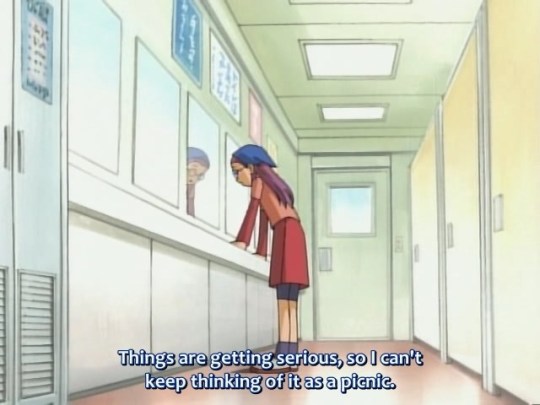
Miyako comes to terms with the fact that maybe she’d been taking this whole Digital World adventure thing too lightly in episode 10, indicating that she actually does have a good sense of priorities when they become increasingly clear! This is actually very important, because it fleshes her out as someone who’s emotionally sensitive -- too emotionally sensitive, to the point that “emotional sensitivity” is just as much of a driving point behind her later breakdown in episode 18, this time from taking her duties too seriously. Miyako is a very id-driven person, and so a lot of the early series is her struggling to find a proper balance on how to adjust her emotions in an increasingly escalating situation. Her heart is in the right place, she’s just not someone with an inherent sense of preparedness to deal with this kind of problem.
We get into the secondary Digimental arc, and there’s a noticeable consistent thread that all of them involve admission of personal faults. This is something that tends to throw people off at times -- wait, having bad traits about yourself is what awards you? -- but the point is that this isn’t like Adventure’s Crests, where things came from proof of exercising the virtue, but rather admitting that there are ways you need to improve, and showing a will to improve in that manner. In the end, people are not perfect human beings, and sometimes even understanding that you’re deficient is half the battle -- after all, the second half is all about a certain character named Ichijouji Ken coming to terms with some very, very serious personal problems.
In episode 11, Daisuke completely admits that he doesn’t feel he understands the concept of friendship the way Taichi and Yamato et al. see it, also latently admitting that he doesn’t see himself as worthy of the Digimental of Friendship. Beyond betraying a lot deeper issues within Daisuke that he seems to have actually had a background lacking in friends and sources of validation, he actually acts very self-effacing when admitting his issues to Taichi and Yamato, ultimately culminating in him calling himself pathetic. Or, in other words, he does want to be a better friend and to understand the concept better, and is harsh on himself for not doing better (which, of course, ultimately leads to how he eventually does gain better relations with the rest of the group and reaches out to Ken).
In episode 14, Miyako admits that she’s shallow and judgmental and tends to jump to conclusions based on first impressions. Recall that she’s comparing herself to Mimi in said relevant scene -- Mimi, whom she admires, and actually spends part of the episode trying to understand and empathize with the mentality of. This is not a statement of Miyako being proud of herself. Rather, this is Miyako being very straightforward about the fact that she needs to try harder to see through the essence of things and to see through to the emotional core of. Again, something she actually does start developing over the course of the series.
In episode 16, Iori gets his first major lesson on the limitations of being too stuck on principles in his attempt to be honest. Recall that Iori’s later character arc is very dependent on him realizing that his own view of the world is too black-and-white. It’s great if you could never tell a lie to anyone, ever, but in the end, that’s going to reach limitations of practicality -- after all, as Jou points out, what Iori did ended up not actually hurting Jou in comparison to the incredible amount of hurt it would have caused everyone by being too stubborn, and thus Iori would have failed to keep his responsibility to help the others because of one narrow-minded principle.
Hikari even gets in a bit during the infamous episode 13, where we learn that her “passive” attitude is biting her in the rear. In Adventure, Hikari’s passiveness and reticence had mostly been used as satellite development for Taichi (his insecurities as an older brother and his obligations to her), so this is actually the first time we get to see a proper perspective from Hikari’s side, and it turns out that his overprotectiveness has actually caused her to get dependent. But even though Taichi is the one the episode actually focuses on, the larger focus is more specifically on the fact that Hikari is too passive -- that she sees being taken by the Dark Ocean as an inevitable thing that’s just going to happen unless someone else steps in on her behalf. Takeru, of course, is having none of it.
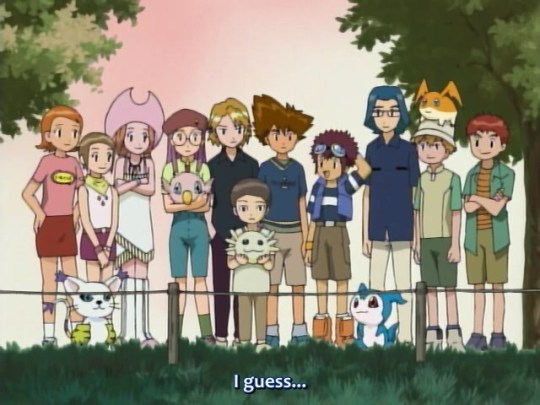
Once that’s out of the way, we go back to taking a look at the subtleties of everyone’s interactions. While everyone generally tends to focus on the second half of episode 17, it’s also pretty interesting to see how the 02 kids react to hearing about their seniors’ adventure in the first half -- remember that this is the first time the 02 kids are actually given any real depth about the degree of 1999′s events that’s not just random points of hearsay, and the way the new kids react to it indicates that they’re thoroughly floored. It’s later established that they didn’t even get the full story (it may not even be possible, given that the Adventure kids’ experiences may well have gone even further beyond what we got to see in 54 episodes), and yet the new kids are overwhelmed. 02 itself does not shy away from the fact that the younger kids really have no qualms about deferring to their seniors if need be, and treating them with utmost respect.
Another minor note, which I pointed out in my Daisuke meta earlier, is that the beginning of this episode is pretty much the last time Daisuke ever shows outright hostility towards Takeru for his relationship with Hikari -- it’s something you have to glean by squinting, but the implication is that the insecure and clingy Daisuke actually got to learn this episode that the two of them had a pre-established shared experience that he himself may not understand, and that it wasn’t just Takeru randomly swooping in and snatching away the closest thing he had to a friend for no good reason.
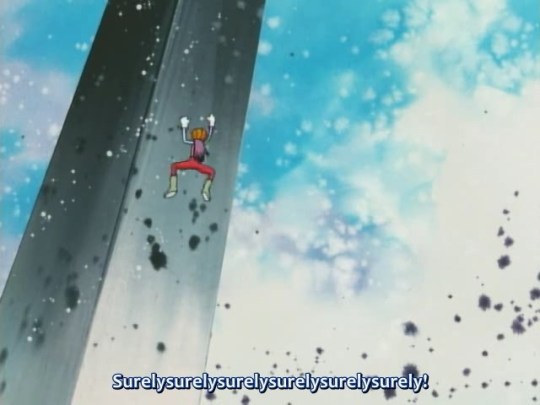
Once the Kaiser infiltration arc begins, episode 18 ends up being one of Miyako’s funniest episodes, but it’s a bit distressing that a lot of people in the fanbase often never let Miyako live this incident down, when in actuality this was explicitly not a good mental health day for her. (This is basically the equivalent of pinning Mimi as a conceited, self-centered jerk based on the fact she was one for a fashion in Adventure episode 25.) The beginning and ending of this episode establish that this is basically a result of Miyako...trying her hardest. She’s scared as hell, but she also learned in episode 10 that this is something she needs to take seriously, and the stress puts her into a mental breakdown. This is why she ends up having a heart-to-heart with Hawkmon at the end; her heart is in the right place, but she needs to find a way to channel her emotional sensitivity in a way that doesn’t make her into a complete mess.
And note that her own voice actress, Natsuki Rio, even pointed out that Hawkmon’s actions had enough of an influence on Miyako’s character that she had to play her differently thereafter.
At first I always played her with Maximum Excitement, and I kept thinking “someone, please, stop her,” but the more straight-laced Hawkmon did his best to pull her in and hold her by the reins (laughs). Thanks to him, Miyako became a lot more of a put-together person…thank goodness Hawkmon is her partner!
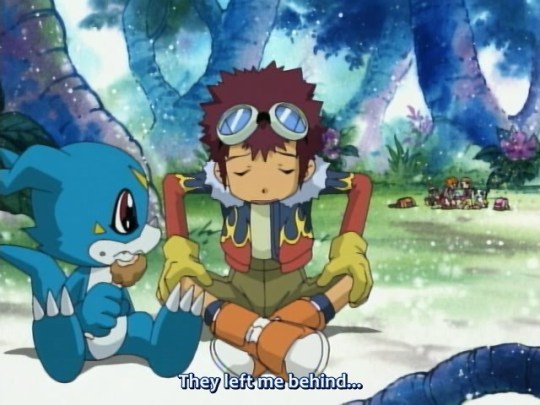
Episode 19 has two interesting things of note that I want to point out -- first of all, starting from the very beginning of the episode, everyone ditches Daisuke because they’re independently going in to infiltrate the Kaiser’s base. Note the complete lack of a plan here whatsoever -- everyone’s just going in on their own -- and the fact that everyone expects Daisuke to come up with what he wants to do on his own. For all it’s worth, even though Daisuke may have a designated protagonist aura to him, within the story itself...nobody actually sees him as a leader at this point in the series (and, to be fair, he’s never really tried to claim the position, either).
It’s similar to how Taichi was never recognized as a particular leader of the Adventure group until Adventure episode 28, but in regards to the full team dynamic, it’s actually inverse -- the Adventure kids were capable of making tactical plans together as early as episode 20, but fell apart emotionally in short order as soon as Taichi was gone, whereas here, the kids are fond enough of each other to hang out socially and support each other emotionally, but they take a while to get any real cohesiveness as a fighting group.
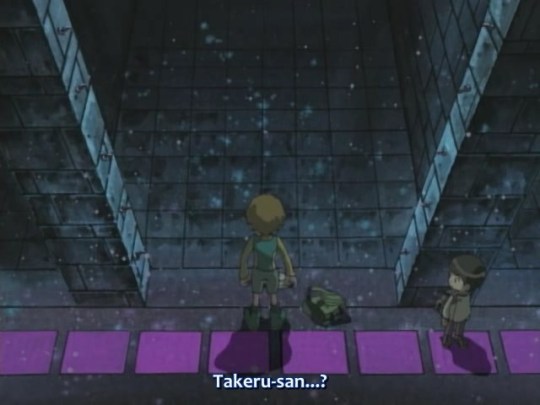
The other is that Iori personally witnesses Takeru’s sudden whiplash into his grudge against the darkness and the Kaiser, and it scares the hell out of him.
Takeru eventually laying a punch on the Kaiser is a pretty awesome moment (and, really, Ken kind of deserved it, so it’s hard to not cheer for him), but it’s also important to note that within the context of the series, this is not a good mental place for Takeru to be in. Iori, the person who should by all means sympathize with hatred of evil things at this point of the series, is still extremely unnerved by Takeru’s actions here, because he’d always seen Takeru as a mature person who’d always kept his composure, only to show a drastically different side of him that he hadn’t even shown a hint of before. That kind of “two-facedness” and emotional repression -- and this way of venting trauma in general -- cannot be good for Takeru at this point in time, and it’s also an important moment for Iori when he later admits during the two’s Jogress arc that he’s having a bit of a hard time understanding him.
And so episode 20 comes, and Chimeramon pretty much takes out the entire party, leading to this conversation.
Takeru: Let's escape.
Daisuke: Escape?
Takeru: We can't fight anymore. Our mission has failed. We'll retreat and wait for another chance.
Hikari: You're right. We have no other choice.
Iori: Understood.
Daisuke: No.
Miyako: Daisuke?
Daisuke: We can't just say "another chance" like that. If we leave now, they'll keep attacking anything in sight. We don't know if we'll be able to get into the fortress again. So this is our only chance!
Hikari: That's crazy...
Iori: Exactly!
Miyako: They're all back to their Baby forms...
Chibimon: Daisuke...
Daisuke: But...didn't you all see it? Destroying those towns...and all we could do was watch quietly. I don't want to see that ever again. I won't let them do whatever they want! So I'm going, even alone. I won't give up now. After getting this far, all I can do is go forward!
Why is this moment important? This is the first time Daisuke has actually stood a firm ground against anyone else in the party -- and not only that, with the entire party standing against him.
Recall that I mentioned earlier that, in spite of Daisuke’s abrasive attitude suggesting otherwise, he actually has a tendency to “deflate” pretty quickly when people tease or criticize him. He spends the first half of the series having a lot more bark than he actually has bite. Earlier in the series, if the entire party were to go against him, he’d be more likely to begrudgingly go along (while complaining) -- in fact, he actually did just that at the beginning of episode 7! But now that push has come to shove, Daisuke’s own sense of morals and bleeding heart have won out. (While his decision here is definitely a bit reckless, he does have a point; if they’d retreated, they might genuinely lose any future chances.) Even with the entire party telling him to pull back, he refuses to accept what they want him to do, and pushes forward.
This is where Daisuke first starts to really make strides towards what becomes his eventual major role in the group as “the one who pulls people forward”. It’s a moment after which the rest of the group themselves also start to treat him with more respect now that he’s proven he’s not just a doormat, and that when it comes to there being a real problem with real priorities, he does have the resolve and initiative to keep going.
Also, a very important point is that he immediately says he’ll go alone if he has to. He doesn’t begrudge the others for wanting to fall back, and has no condescension towards them; he just can’t stand the fact that he himself is being asked to sit it out.
So, you know. Episode 21 happens. Ichijouji Ken goes through some real trauma as Wormmon dies in his arms. And all Daisuke has to say is...
Daisuke: You should go home. There are people who are worried and waiting for you! Go home!
Remember when I pointed out that 02 takes a very unique perspective on Ken’s redemption arc, pointing out the futility of being too trapped in the idea of symbolic penance and focusing more on actively taking steps in the future to make up for and fix things? Here’s our first major sign of this, and Daisuke’s eventual approach to Ken -- Daisuke does not choose to scorn or lambast Ken for what he’s done, even though there are a lot of things Ken deserves to be harped on for, but rather instructs him to take the first active step towards fixing his mistakes, in this case fixing things with his family.
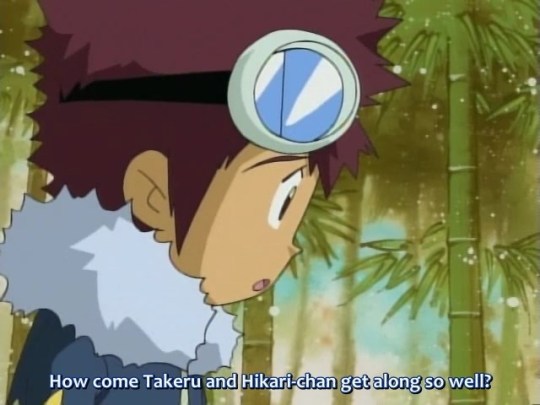
Episode 22 is Daisuke’s own “fanbase will never let him live this down” moment, but there’s still some interesting things to note here. Firstly, Daisuke’s “relapse” happening exactly when it seems like his duty to the Digital World is done and there’s nothing to do besides community service doesn’t seem coincidental, especially when this exact episode actually dedicates a full scene to Takeru, Hikari, and their partners going “...now what?” Secondly, as I touched on earlier, note that Daisuke’s never really seemed to have any resentment against Hikari for not responding to his affections -- in fact, he still considers it his own (and V-mon’s, by extension) duty to be the one to impress her. It’s a surprisingly refreshing take on the “shounen hero with a crush on a girl” trope, because in the end...Daisuke isn’t actually all that possessive of her, he just really wants validation from her, and respects her a lot.
More importantly, though -- note the way Daisuke handles this topic. He’s not actually mad at or resentful of Takeru anymore. In fact, he’s mulling on the topic and wondering what he could do to be on that level. Yup, even when Daisuke’s being shallow and jealous, he’s still learned to handle this issue ever so slightly more maturely than he would have at the beginning of the series.
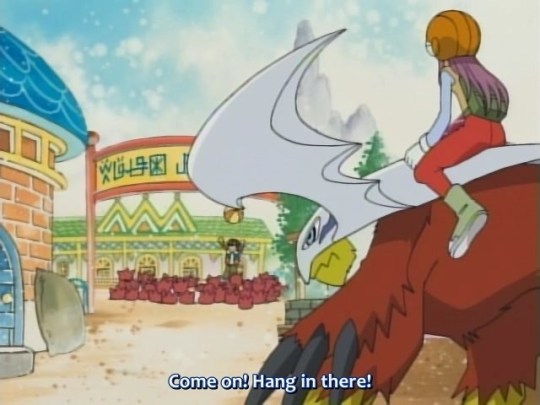
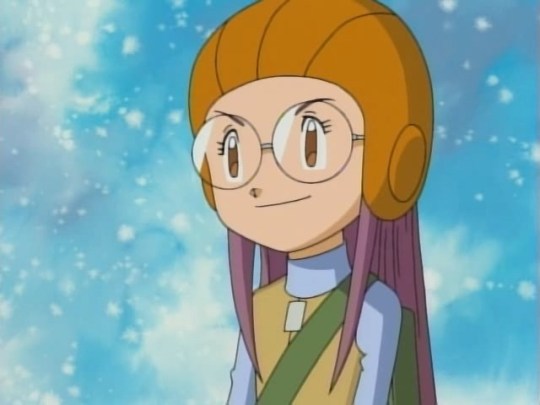
This is also important because only one episode later, once Daisuke becomes disappointed again at Takeru and Hikari walking off on their own, Miyako intervenes -- not only so that Takeru and Hikari can have their space, but also so that Daisuke can have some genuine fun and something to do. This is a very blink-and-you’ll-miss-it moment in episode 24, but it makes it very clear that Miyako was looking out for Daisuke’s welfare, too, and I think it’s very important in light of the events of the prior episode. Miyako, who had always been fumbling on what to do with her emotions, is starting to properly channel them into managing the dynamic between the team and checking in on how everyone’s doing, and that starts to guide her actions and relationships for the rest of the series.
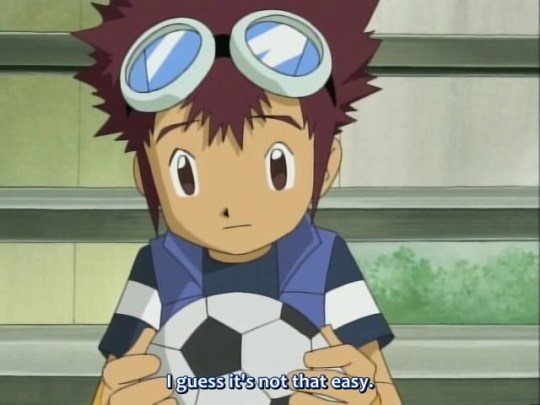
The next episode (25) is where we kick off not only the Jogress arc, but also the arc where we start going into everyone’s attitude towards Ichijouji Ken. This is important not only because Ken happens to be the effective central figure of 02′s story, but also because -- well, remember, 02 is fundamentally founded on the concept of relationships, so it’s only natural that the other kids’ relationship with the “team newcomer” will be a key aspect of the second half, and in relation to their own characters.
Remember how I said that Daisuke’s first-half character involved him being extremely deferential and often deflating whenever he was criticized or someone stood against him? At the time of episode 25, once again, pretty much the entire team is standing against him -- he’s the only one who’s this level of open-minded about getting Ken into the group, and everyone else is showing differing levels of opposition. But while Daisuke doesn’t begrudge the others for thinking this way, he also doesn’t back down, either, and reaches out to Ken on his own because he still really believes in what he’s doing. Now that he’s settled into what it means to be a Chosen Child, he’s started to gain a proper idea of what he wants to do, and what he feels needs to be done.
So, let’s recap everyone’s stances on Ichijouji Ken at the time of this episode!
Daisuke: Forward-thinking and optimistic; willing to believe that Ken should be given the chance to make up for his mistakes and that they should put everything behind him, even to the extent of believing that there’s probably a good reason for the more suspicious aspects about him (prior to the events of episode 25, it was unclear whether Ken was being a bit too callous about killing Digimon). Also the most actively aggressive in reaching out to Ken and trying to get him to join them.
Miyako: Forward-thinking; she openly states at the beginning of the episode that she thinks Ken’s learned his lesson, she’s just worried about whether he’s going to keep doing questionable things in the future (killing Digimon). Once it’s on the table that he’s not just doing this callously, she immediately is on board with him (to the point of even being the first in the group to use given name basis with him), but her stance on what to do with him is more on the edge of “give him space and wait for him to come on his own terms” (she ends the episode saying she’ll be waiting for him to come).
Takeru: States in the episode that he does believe that Ken’s changed, but doesn’t really know what he’s thinking (i.e. too inscrutable to really be sure about). The later episode 35 implies that Takeru was inclined to be a bit more sympathetic than you’d think otherwise, because he understands the trauma of losing a Digimon partner.
Hikari: Wants to wait a little longer and see how things play out. (Remember that Hikari has a known, consistent thread of taking a very passive approach towards things.)
Iori: Absolutely against it on sheer principle.
It should be noted that none of these stances are wrong. Iori sometimes gets a lot of flak for being the one with the most infamously cold stance towards Ken, but when you really think about it, Daisuke and Miyako are very lucky that their hunch about Ken was right and that he actually did happen to be a very kind boy who had a little too much trauma and some supernatural influence. The fact that Ken is a very emotionally withdrawn person for the rest of the series meant that the two of them ended up breaking through to him the most, but there’s nothing wrong with Takeru, Hikari, and Iori’s skepticism; Ken did some pretty shockingly horrible things in front of their eyes for the first half, and it’s entirely within their rights to determine how forgiving they want to be with him.
In any case, we get to episode 26 (the first Jogress), and most of that episode goes without saying, but I do want to emphasize Daisuke’s lines right before it happens.
Daisuke: If you die now, you won't be able to accomplish anything...I don't want that!
Ken: I don't want that...There are still many things I must do.
Daisuke urges Ken not to go for the “suicidal penance” route not only because it sucks, but also because, as symbolic as it may be, it’s also counterproductive to the whole point of doing penance to begin with. If Ken really wants to make up for his mistakes, he’s only going to be able to do that if he’s actually alive to do it! There’s only so much you can do by drowning in self-pity by going “because I did this, because I did that” instead of actually taking responsibility for your actions.
02 itself is deliberately ambiguous on how much Ken’s transformation into the Kaiser was Ken’s own conscious will and how much of it was Dark Seed-induced supernatural influence, but one thing it’s consistent about is that it doesn’t really matter. Regardless of what the cause was, Ken did what he did, and it’s his responsibility to make up for it, and the only way to actually do that is to keep moving forward. The fact that Daisuke is so able to viscerally and directly address what Ken needs the most right now is what fuels their first Jogress, and why Daisuke becomes Ken’s closest friend through the rest of the series.
People have pointed out that 02 has a lot of moments of physical hits, but, notably, other than Takeru punching the Kaiser in episode 19 (which he really deserved, honestly), all of these hits are done with the express intent of bringing the other person out of a very, very deep mental abyss (Yamato punching Taichi in episode 10, Daisuke slapping Ken in 26, Miyako slapping Ken in 30, and Miyako and Hikari’s mutual slaps in 31), because they were in a state where words would no longer reach them otherwise. These are all circumstances of the kind where the person on the receiving end understands that they really needed a drastic wake-up call because of how deeply they’d fallen (and these aren’t some average mental abyss problems these kids are getting put through, either). It’s actually hard to imagine any of the 02 group getting in the kind of genuinely angry and vicious fistfights Taichi and Yamato would in Adventure, because of how close they are (the closest being Daisuke and Takeru grappling in episode 11, but it never got near that level) -- in fact, these kinds of things are done with the implication that they’re doing it because they trust the other person to not hold it against them (and in fact, the fact Yamato does this with Taichi in this way is intended to be read as a sign of how much better they’ve come to understand each other).
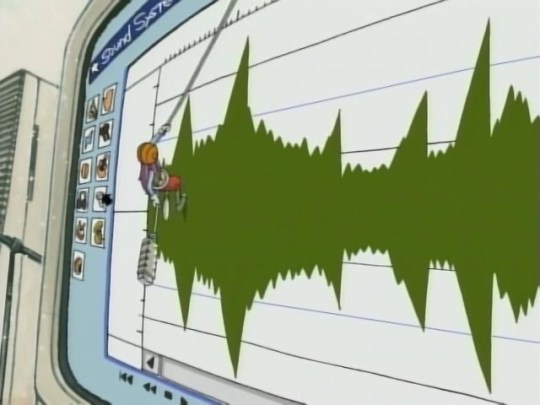
So, moving on with the series! The Giga House incident in episodes 28-29 is the first time the group works together in an organized effort, which is notable not only because it’s their first time coordinating with Ken, but also because it’s their first time properly coordinating at all. Remember when I mentioned that, back in episode 19, as much as the kids were pretty fond of each other and were great friends, they still hadn’t figured out how to actually fight as a team? Here we are, with them actually having started to figure that process out.
We then get to episode 30, where there’s actually quite a lot of interesting things to unpack.
Miyako: What's wrong with you?
Daisuke: E-Eh? Mi-Miyako-san?
Miyako: It feels weird when you add the "-san".
Daisuke: Shut up! Man, you're all the same!
Miyako and Daisuke’s relationship is often misconstrued considering that they’re the two most chaotic in the group (their temperaments are very similar at times, which causes them a lot of friction), but I also think this blink-and-you’ll-miss it moment is pretty much their actual relationship in a nutshell. They fight a lot, and they’re ostensibly vitriolic, but they’re actually two of the most like-minded in the group -- they banter because they’re comfortable with each other. Recall that I mentioned that Daisuke is normally respectful with his elders, yet he’s the only person in the group who won’t use the -san honorific on Miyako (even though she’s the oldest)...but the one time he gets flustered and uses it on her, she tells him that it’s weird and he needs to cut that out. Or, in other words, “it’s not like you to be weirdly respectful of me like that, we shouldn’t have that kind of distance between us, stop it.”
(It’s also pretty notable that Miyako has never seriously used -kun or any other honorific on Daisuke, even right after meeting him -- the only other person she dropped honorifics on was Iori, whom she’d known prior to the start of the series, but she seems to have deemed Daisuke enough of a fellow disaster child that he merited dropping it.)
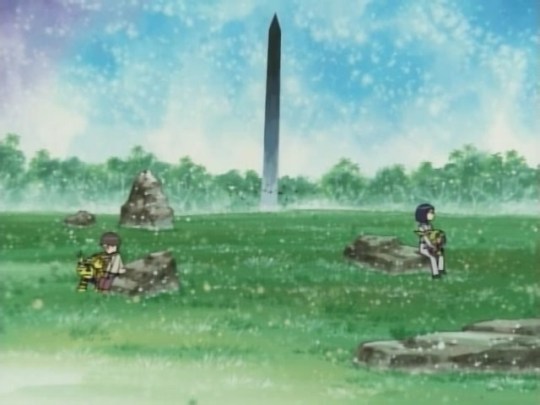
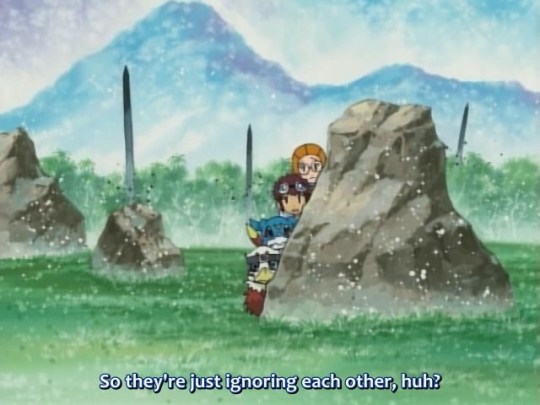
This is especially because, right after that, she recruits Daisuke into her plan to get Ken and Iori to get along -- in the end, when things really get serious, the two are incredibly like-minded (look at how in-sync they are when they scheme together).
30 is actually a surprisingly Miyako-centric episode, despite not ostensibly being one. For one, it says a lot that right now, her biggest priority is to get Ken and Iori to get along -- something that has absolutely nothing to do with herself. In episode 14, Miyako freely admitted that she had a tendency to jump to conclusions about people, and that she was shallow about aesthetics, but this is a very different Miyako from the one who harassed Daisuke for Ken’s autograph in episode 8, or immediately became distrusting of Digitamamon in episode 14. Instead, she’s simply just genuinely invested in seeing people she considers friends get along, and in a selfless manner -- one that has nothing to do with herself. She just really, really cares, a lot.
After all of the first-half hubbub of Miyako really having no idea of what to do with her emotions, the second half has her start channeling that energy into what’s always been one of her biggest strengths: checking on, connecting with, and caring about her friends. Daisuke may be an aggressive forward-thinker who can push everyone in the right direction, but unlike his predecessor Taichi, he doesn’t actually have particular charisma or leadership skills that can necessarily hold everyone together. In the absence of that ability, Miyako fills in for him, checking on the moods and feelings on everyone in the team and making sure everyone’s doing well. And that’s why she loses her temper and slaps Ken late in the episode -- because, really, she’s reached her limit on her “give him space” philosophy when he’s abusing it to be standoffish in a crisis situation, and, on top of that, she really, really did have a huge emotional investment in him.
Moving onto more Miyako in episode 31, her Jogress episode with Hikari, we get to see a little bit of the old emotionally compromised Miyako again, but -- much like the second Digimentals arc -- it involves the two of them acknowledging that both of them are not going about things the best way, and that there are things they can learn from the other.
Hikari: Miyako-san, you're a handful sometimes.
Miyako: I knew that's what you thought of me...
Hikari: But...I've always envied that.
Miyako: Huh?
Hikari: Because I can't be honest and say I'm scared or scream like you.
Miyako’s tendency to lose control emotionally results in her being insensitive much of the time, which she calls herself out on multiple times during the episode, and she can’t always be as “kind” as Hikari is -- but, on the flip side, her antics are something that can be a “light” (pun not intended) towards those who are falling in a bad mental state or into the darkness, and Hikari even acknowledges this when one of her trains of thought makes her break out into laughter. Miyako ultimately manages to get through to Hikari this way at the end of the episode, which results in a Jogress and mutual growth for both of them -- Miyako puts more thought into how to approach others (it’s pointed out at the end that she’s still thinking about understanding Ken and Hikari better), and Hikari gains more resolve and determination to fight against things instead of passively accepting her fate (she tells Takeru very directly at the end "I’m fine now. I’ll never go there again.”).
Iori and Takeru's Jogress is a little more complicated to the point where it spans multiple episodes, but a lot of it ends up having to do with the fact that the events of the BlackWarGreymon arc start really putting Iori's black-and-white principles into conflict -- it's wrong to kill something that's been proven to be alive, but it's also wrong to be evil. Putting a huge nail in that is that there's a stake in him forming a relationship with Takeru, but he doesn't really understand Takeru either -- the "two-facedness" he witnessed back in episode 19 scares even him, and he's so intimidated by Takeru that, in episode 35, he goes to approach Yamato about Takeru's past instead of asking the person directly. Takeru, hearing about this, complains that he could have just asked directly, but admits he understands why Iori did so.
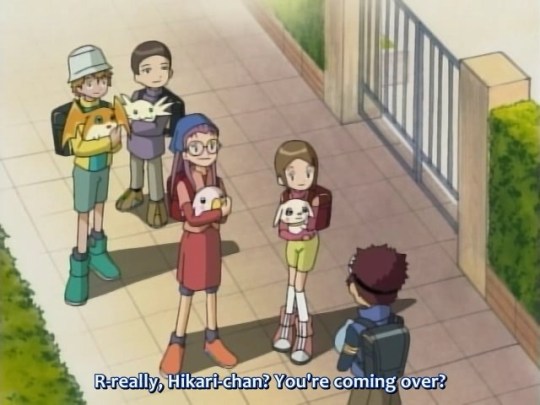
By the way, I should point out that episode 35 is the last time within the TV series that Daisuke is portrayed as having a particular interest in Hikari, and it’s just in terms of being slightly more excited that Hikari is joining his meeting. At this point, there are actual important things happening in the Digital World, and he needs to take care of Ken, too, and so...in the end, once again, Daisuke proves that he’s actually capable of putting aside those kinds of more shallow things when he really needs to.
On top of that, this is when the kids start actively working with Ken in the real world (and, if post-02 materials are any indication, continue to hang out with him even for social outings). The choice to have Ken live in Tamachi instead of Odaiba facilitated his isolation from the group during the Kaiser arc, and during around the third quarter they were all grouping up in the Digital World anyway, but the fourth quarter actually has the kids make an attempt to include Ken in their real-world outings despite the distance. Tamachi is not temporally far from Odaiba (approximately half an hour by train), but it’s a bit of a nuisance to get to, requiring crossing a bridge to/from the Tokyo mainland and paying extra for the Yurikamome. But at this point, he’s an important enough friend to them -- and them important enough friends to him -- that they’ll make it work.
At the end of episode 35, Iori finally decides -- to the point of recklessness, something that would have been previously very uncharacteristic of him -- to try and appeal directly to BlackWarGreymon to get him to stop destroying the Holy Stones so that they won’t have to fight. It’s emblematic of Iori’s heart being genuinely torn, because he’s having such a difficult time rationalizing all of these conflicting feelings. This comes to a head in episode 36, when Iori loses his temper at the rest of the group for “playing around”, but Armadimon snaps him back to reality to remind him that they’re tired and hungry, and this can’t be neglected. Iori himself ultimately becomes the one to proactively suggest that they take time to sit down and eat, indicating that -- little by little -- he’s starting to shift his thinking a bit, after being so incredibly stubborn for much of the series.
This is what leads to Iori and Takeru’s Jogress at the end of the episode, now that Iori is flexible enough in thinking to understand the emotional id behind Takeru’s mentality. And likewise, Takeru’s started to loosen up by 36, too --
Takeru: Sure, darkness is frightening, and we would feel at ease if we could get rid of it completely, but I'm sure that's impossible.
Ken: Impossible?
Takeru: Where there's light, there's always darkness.
Hikari: The brighter the light, the darker the shadow, right?
Takeru: Yes. That's why I think it's important not to lose sight of the light inside you, no matter how dark it is.
The thing about Takeru is that while he deceptively seemed more open and playful than Hikari for most of the series, he was actually bottling up a lot of emotions in a way not entirely different from the way she did. (Note how, despite how tied at the hip the two constantly are, they almost never actually talk about their thoughts on each other; it feels like a relationship where they implicitly trust each other but are practically reliant on that implicit trust to maintain that close of a friendship at all.) And he’s been keeping those emotions bottled up until they exploded in less-than-healthy ways, initially distancing himself from Iori. But being a lot more open about his thoughts on the matter allowed them to connect better, and eventually Takeru came to embrace a somewhat more reasonable stance on the matter after observing Iori.
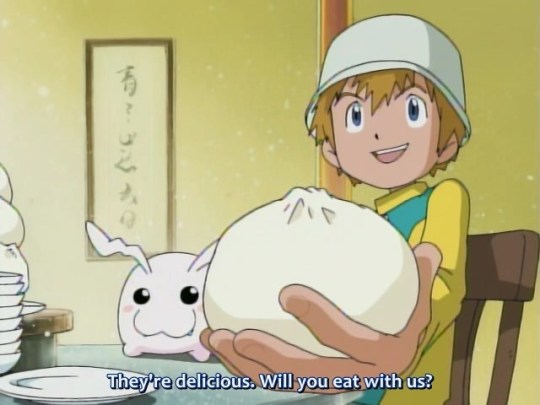
It also doesn’t seem like coincidence that this is the episode that ends with Takeru’s first major act of goodwill towards Ken.
This leads into episode 38, the Christmas episode. Fun things to note!
The episode opens with Daisuke and the other younger kids giving a “Christmas present” to their seniors in the form of letting them reunite with their partners. Remember how I said that the 02 kids always admired their seniors and looked up to them? Even this late in the series, the series does not shy away from the fact you’re supposed to see the 02 kids as their deferential juniors.
The Christmas party is, of course, notably, the first major moment of reconciliation between Iori and Ken, with Iori having gone through major harsh lessons about morality in the last few episodes, and Ken opening up more to the rest of the group. Said party is also yet another notable example of how much of a priority it is for the 02 kids to be “social life friends” and not just friends working as a Digimon incident team -- after all, having genuinely emotionally present friends is what Ken needs most in his life right now, considering that the party is treated as the first time he’s been truly happy in a long while.
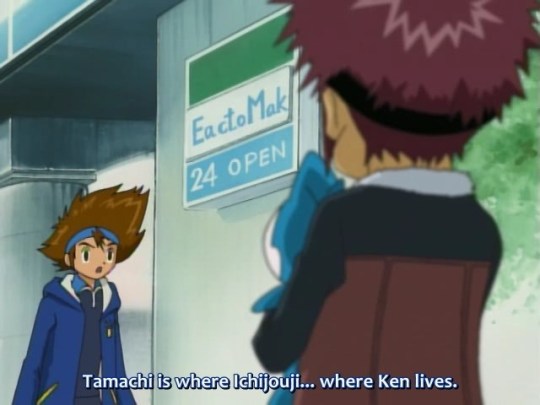
This is followed by episode 39, which is notable as the time when Daisuke finally commits to switching to given-name basis for Ken, and actually opens the episode standing against Taichi -- because he's so worried about Ken that he needs to go join him. This is something that's lost a bit in translation, but although Daisuke stands down against Taichi, he's not rude nor does he overstep his boundaries with his respected senior (he even opens his statement in polite-form Japanese) -- he's just saying, firmly and politely, "I'm sorry, but I can't go, I have to go help my friend." It’s a notable moment because while Daisuke has been becoming increasingly assertive and aware of what he really wants to do, this is the first time we’re actually seeing him refuse to defer to the very senior he’d spent so much of the series idolizing and looking up to.
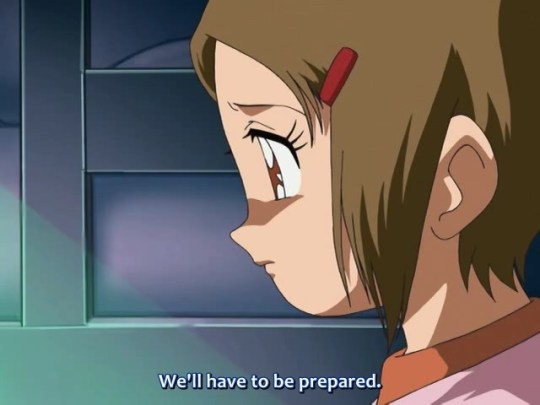
We get to episodes 43-45 (the Demon mini-arc), which is also the culmination of the 02 kids having to face the limits of pacifism. This tends to throw off people who are coming in from Adventure, since the Adventure kids ended up killing Digimon with a lot more ease in the original series, but it’s also important to make note of the fact that the episode itself deliberately portrays a gap in mentality between the Adventure and the 02 kids -- with Hikari torn between the two. It also creates an interesting subversion of expectations when Hikari, the one you’d expect to be more on the pacifist side, is the one who’s already accepted that it may be inevitable, whereas Miyako, the more aggressive and belligerent one, is the one staunchly against it.
The reason for this “paradox” comes out of a single line from Hikari in episode 44:
Hikari: You’re the one who saved him, Miyako-san.
The Adventure kids never liked killing. They were never enthusiastic about it -- it was just that they were almost immediately put in a situation where the entire fate of the multiverse was at stake thanks to some unambiguously evil Digimon who wanted nothing but wanton destruction. Even then, it was pretty clear that they never enjoyed it -- Takeru professed a desire to avoid fighting in Adventure episode 12, and the pacifist Mimi went through a breakdown in Adventure episodes 45-50 trying to avoid casualties. But one of the most important lessons Mimi learned at the time was that pacifism has its limits -- there’s no point if it ends up in more deaths than it saves, because at that point you’re adhering to moralistic principles more than you’re actually saving lives.
The fact that the Adventure kids and the 02 kids have a “different mentality” isn’t just happenstance, but outright embraced. Daisuke, Miyako, and Iori never had to actually deal with a conscious Digimon that was unambiguously evil for most of the series, and Archnemon revealing that her motives were pretty much nothing but wanton destruction in episode 29 was the first major warning signal to Iori that his pacifism might have limits. And during this Demon mini-arc, it’s not like these Digimon are threatening multiverse destruction or anything -- it really does seem like a constant “glimmer of hope” that maybe, just maybe, they can save people non-lethally. Alas, they can’t.
Daisuke, being someone who’s inherently practical-minded, starts entertaining the idea that push may come to shove as early as episode 25, and finally makes his first statement about practical limits in episode 43. But the more emotionally caught-up Miyako and Iori end up taking another episode to swallow it, and they don’t take it well. Most of the attention in 44 is given to Miyako, and it reconfirms that, despite her aggressive exterior, she’s emotionally sensitive and empathetic -- and while killing LadyDevimon is framed as truly the only thing that could have been done in that situation, Miyako is not faulted for being emotionally compromised, nor is Iori likewise when he faces a similar situation with Takeru and is forced to confront the people whose lives were at stake.
Episode 45, when Ken opens the gate to the Dark Ocean, doesn’t really have much to add on top of what’s already there, but this is basically “the point of no return” when everyone confirms their own emotional investment in Ken and understanding that he’s not just reformed, he’s genuinely struggling under the pain of what’s been happening -- and this is before they find out about the truth behind the Dark Seeds, and that Ken’s transformation into the Kaiser may have been supernaturally influenced, too.
It’s also interesting to see the different ways each kid reacts to Ken as they support him:
Hikari, the most outwardly compassionate, goes to support him the second she notices him in physical pain; Takeru notices that it might work, realizes Ken needs the support, and joins.
Iori and Miyako reflect on how Ken’s putting all of his efforts in, and lambast themselves before joining. Interestingly, given the circumstances behind what’s happened up until now, Iori and Miyako criticizing themselves take a different meaning -- Iori, who’d been scornful of Ken until recently, seems to be regretting that he distrusted him when Ken had been trying so hard, while Miyako, who had been open to him since episode 25, seems to be upset that she’s sitting there and not doing enough when he’s in all of this pain.
And Daisuke, of course, the most “forward-thinking” of them all, gives Ken a speech about what he’s done so far and reminds him that he’s already done more than enough for “atonement” -- which is, of course, what directly reaches Ken the most.
And when we get to episode 46, and the kids, now knowing about the Dark Seeds, hold a roundtable (and emotional support group) to discuss what to do about the Dark Seeds, Daisuke’s the one with the most spirit and energy about it, but...
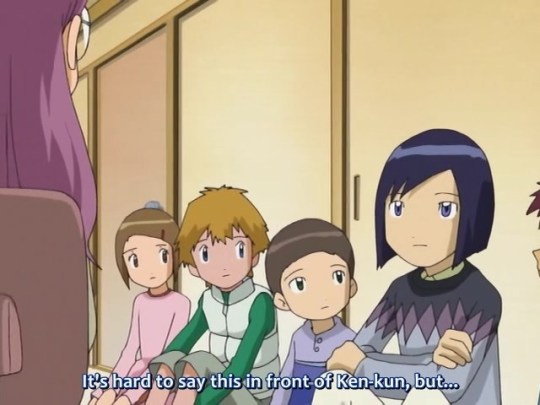
...the one actually leading the roundtable? Miyako.
Miyako: Sorry, that's all I can think of.
Ken: Please don't worry about me.
Miyako: (nods)
It’s subtle, but the scene in question does actually make a deliberate move in indicating that Miyako’s continuing to channel her emotional sensitivity and desire to go out of her way to help Ken -- of course, they all know how traumatic this is for him, but she’s the one who’s actively calling attention to how he must feel about it first and foremost.
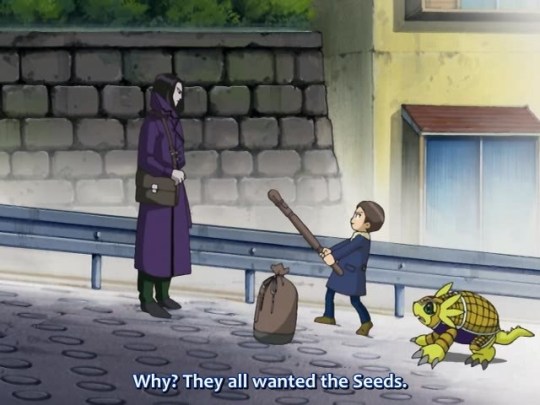
Episodes 47 and after end up becoming yet another major wake-up call for Iori (seriously, I do not understand why people claim he had no character arc when this wasn’t even remotely subtle) when he learns that Oikawa, whom he’d pinned as “evil”, has a deep relationship with the father he’d grown up idolizing so much, and it completely flips his world around -- even though he had started to get a bit more open-minded, he’s still trying to rationalize what should have been, in his mind, two diametrically opposite things. It fuels his confusion and desperate desire to understand more, not just about Oikawa, but about everything he’d thought about morality and why people turn to evil.
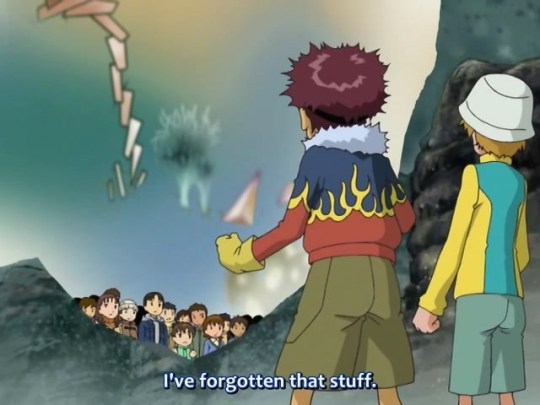
So we get to the final arc of the series, and it involves a confrontation with BelialVamdemon -- but said finale is heavily dependent on talking to the Dark Seed children and inspiring hope back into them. This results in a conversation where everyone talks about their career dreams, and Daisuke admits that he wants to be...a ramen chef, which completely blindsides even his friends.
What’s with this arc?, you might think. And moreover, why is Daisuke ending the series still kind of an idiot? Even Miyako still seems to be a bit of a mess and chaotic. Weren’t they supposed to be growing into dignified heroes, like Taichi and his friends were last series?
Well, here’s the thing -- the fact that the 02 kids end the series comparatively “undignified” is actually very inherent to the core theme of 02 itself. There were more than enough episodes that established that said kids are heroic in their own way -- caring about others, fighting on others’ behalf, and learning important lessons about what’s important to fight about. That doesn’t mean they don’t get the right to continue being disaster children while they’re at it.
Why?
Let’s look at a few official statements behind the creation and intent behind 02 as a series. From producer Seki Hiromi, from the Digimon Animation Chronicle:
That came from an idea I had while reading a newspaper article. I read a story about a nine-year-old boy going to Columbia University, and I thought, “This boy is going to college because he’s considered a genius, and everyone around him will be in their twenties, and he won’t get to have any friends his age. What kind of life would this boy end up having?”
Or some very interesting statements from head writer Yoshimura Genki from the 02 Blu-ray box:
When I was writing Ken Ichijouji, the main idea for him I used as a basis was the conflict between “the self that has to be a well-behaved child when adults are watching” and “being able to be oneself”, and the pain that came from it as a result.
So for instance, in the same way as the Pinnocchio fairytale, or the short story A.I. that was adapted into a movie, or many other works, there are probably universal worries that all children feel as they grow, but also, there were ongoing unimaginable, atrocious incidents happening with children at the time, and perhaps it was those social conditions that gave me a hint on what to do. I think I had some thoughts that I wanted to convey to the children who were living through that time.
I was given the opportunity to put those kinds of feelings, as much as I liked, into episode 23, and I am truly grateful to all of the staff, including the director.
...
Also, this is about Daisuke’s character, but I believe I paid particular attention to making him “a child who could be himself”.
He has no special talents, and although he’s clumsy and scatterbrained, I wanted him to be someone whose strength was in his straightforwardness, and wrote him that way.
Lying underneath the entirety of 02 itself is a theme about “children who are not allowed to be children”. Or, in other words, the pressure placed on children to be “talented” and “dignified” and “well-behaved”, often imposed on them by well-meaning parents who are unfortunately taking the opportunity to stroke their own ego, robbing them of the happiness and mental freedoms they should have as kids.
Ichijouji Osamu and Ken, who were placed under the pressure to be “genius children” and cracked under the pressure to please their parents. Oikawa Yukio, who was cut off from the Digital World in childhood by a well-meaning Hida Chikara, worried about his son getting into “foolish” talk. The Dark Seed children, who also fell victim to similar pressures that Ken did, and lost hope for life unless they could force themselves into that mold.
Takeru: If you want the Digimon to exist, if you believe in that, they will. Just like our feelings...Just like every child having the power to make their dreams come true.
Keiko: That's just childish.
Daisuke: You all have dreams for the future, don't you?
Noriko: Dreams for the future?
Takashi: I've forgotten that stuff.
Daisuke: No way! You must have one!
Takeru: It's nothing to be ashamed of.
Takashi: Then, what's your dream?
Daisuke: Mine? Mine's a ramen shop. I love ramen! I'll become the world's best ramen maker!
Ken: I had no idea...
Noriko: Well...actually, I wanted to be a kindergarten teacher.
Hikari: Me too.
Daisuke: What about you guys?
Takashi: A baseball player!
Keiko: I really want to be a pastry chef.
Hiroshi: When I said I wanted to be a manga artist, everyone laughed, so I gave up...
Takashi: We all had aspirations, and at some point we thought that wasn't allowed...But we were wrong, right?
Daisuke: Let people say whatever they want!
Noriko: You're right, we should be free to dream.
Miyako: Not just dreaming. If you work hard, your dreams will surely come true!
Notice something about all of these careers mentioned? They’re all the kind of “overly childish” “wild dream” “undignified” “too simple” kinds of dreams that an average parent might be uncomfortably quick to shoot down because that’s “not good enough”. These are the kids who willingly accepted the Dark Seeds; they, much like Ken, probably grew up under parents who prioritized school performance and other “societally dignified” things that ended up eating away at their happiness.
02 has a lot of different themes, but the one that lies in its undercurrent from start to finish is “so why does a child have to be this way? As long as they still understand what’s important, do they have to be dignified people? Why can’t they just be free to have dreams and be themselves?” And Daisuke and his friends are there specifically to stand up against this mentality, and to remind Ken and the other victims of it that it doesn’t have to be this way -- that it’s okay to be your true self, and be a child, and not succumb to all of those arbitrary, shallow standards people put on you. Even if that means you’re still a bit of a chaotic disaster at the tender age of eleven.
Digimon, in the Adventure and 02 universe, have always been treated like a part of the self (they were literally conceived as a physical manifestation of the soul), but in 02 they gain an extra meaning of representing “the inner, deepest part of yourself that represents your wildest ‘childish’ dreams”. The symbolism of Ken spending the first half of the series trying to reject Wormmon for being “weak” -- in other words, rejecting his own kind-hearted self for not being the kind of “strong” entity he was pressured and groomed into being -- is not lost, nor that of the Dark Seed children gaining partners when they reconnect with their dreams and wishes, nor Oikawa finally, finally meeting his partner when he comes into contact with the past he’d really lost (and especially not the fact that his attempt to reclaim shallow reminders of said childhood involved trying to make his own Digimon).
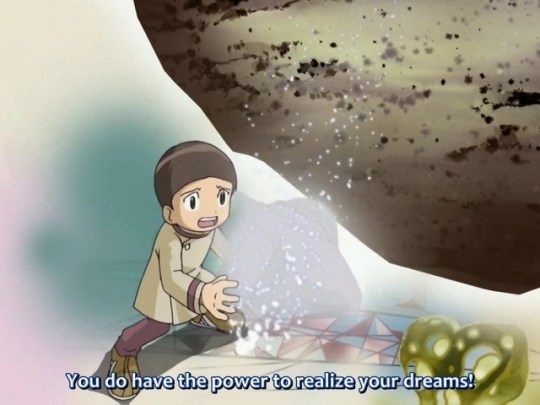
And notably, the series’s finale (prior to the epilogue) ends not on Daisuke but on Iori, escorting Oikawa to the Digital World despite how completely impossible it would have been for early-series Iori to even entertain the idea, finally coming to truly understand what happened with him and being most personally impacted by his death.
But in any case, where are we with the characters? We’re here to talk about how they’ve grown and developed over the course of the series. Let’s recap:
Daisuke: Started off the series as an abrasive kid with more bark than actual bite, constantly deferring to others and easily deflating, relying on shallow sources of validation like wanting attention from Hikari; gradually gained an ability to identify what was important and put his foot down for it, embraced his forward-thinkingness to reach out to a heavily troubled child as a friend, and ended up surrounded by a friend group that loves and respects him.
Miyako: Started off the series as a shallow, flighty girl with poor control over her emotions and difficulty in appreciating the gravity of things; came to channel her emotional range into empathy for others and compassion, bringing other people together and taking care of them.
Iori: Started off the series as a straight-laced but too principled child who stuck to “rules of what’s right” not only in morality but also in way of acting; started to appreciate the emotional nuances and heart behind why people do what they do and how it’s possible to be more flexible in “doing good”.
Ken: Well, his character arc is pretty obvious, but -- again, while his arc of learning to forgive himself is well-known, less often pointed out is that it centers very heavily on not only having penance but also not being too hung up on the past, and the futility of drowning in self-pity and regret instead of choosing to take responsibility and act more productively going forward.
Takeru: Started off the series as a seemingly mature but deceptively inscrutable character whose duality made him hard to approach; eventually opened up with the help of others and showed a capacity for being more flexible with his personal grudges.
Hikari: Started off the series emotionally repressive and passive to the point of self-destruction; eventually embraced connections with her other friends and became more active in taking a stand for herself.
Hey, not bad!
And, again, this is not a series you should be reading in terms of “self-awareness” in the same way Adventure was, but in the sense of their “relationships” and how they interact with others. By being less abrasive and more assertive, Daisuke gained the respect of his other friends. By putting her emotional capacity into caring about others, Miyako became someone who holds the group together. By learning to think a little more flexibly and be less stubborn, Iori arrived at a position where he could more easily sympathize with others in the group. Takeru and Hikari both moved from their previously relatively inscrutable positions to ones who could more effectively interact with and open up to others. And Ken, of course, became someone who managed to integrate himself into a group of true “friends” despite everything he had done against them in the first half.
This, in the end, is how you get what’s one of the tightest friend groups in Digimon history. In the end, the relationships themselves are almost like characters of their own that got development -- I say very often that you could take two of the characters and have an excellent scope of how they’d interact and play off each other by the end of the series. And although they end the series as possibly one of the most shameless, undignified disaster groups out there...they’re certainly still heroic, and in any case, given the lessons they learned throughout their own series, they probably wouldn’t have it any other way.
247 notes
·
View notes
Text
Rewatching some Star Trek: Enterprise
3x13 - Proving Ground
There is an unending “Previously On Enterprise” to open the episode. A full minute and a half to remind the audience what’s going on. Whew, the signs of how convoluted and serialized the show had become. This episode is deeply mired in the Xindi arc, which is decent but not what I love about the show.
One thing I will say about the Xindi arc is that it’s not about xenophobia or total war. The idea that Archer becomes an unreasonable war hawk is pure fanon. It only takes a few of episodes into season 3, way before this point, before Archer starts seeing nuance in the Xindi species.
They’re still enemies of Earth, still trying to attack and destroy it, but the show almost immediately sympathizes them. Whatever parallels were supposed to exist to America right after 9/11, it doesn’t hold up long.
The major highlight to this episode for me is the return of Shran and the amazing Jeffrey Combs! It’s awesome that the episode starts with Shran, and we get a long look at an Andorian ship.
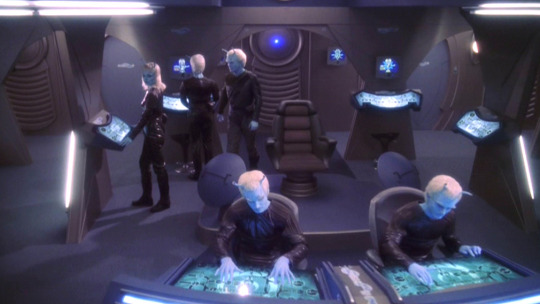
One of the many drawbacks of the forced overhaul of the show was the dismissal of the slow-building Federation arc. And thus Shran. Even now he gets shoehorned into the Xindi stuff, rather than as a step towards the Federation.
Still, it’s awesome to see T’Pol, Shran, and Archer back together. And it is another favor called in, another instance of Archer and Shran (and T’Pol) forging a special relationship.
I forgot how much the retooled theme song sucks. I mean, the original was cheesy but at least it was heartfelt and sincere. The retool saps all of that out, and seems empty and failing at edgy.
“Typical humanoid arrogance.” In general humanoid refers to body type not facial structure. So most of the Xindi are humanoids. Besides that point, though… what were the “humanoids” called before the Xindi learned about humans?
It takes nearly five minutes before we see Enterprise or anyone on it. I didn’t check, but that seems pretty long.
The network tried to make this a military show, instead of an exploration show. That’s the real tension, tragedy of this season. There has always been shades of military in Star Trek, but ultimately that’s not (and shouldn’t be) it’s center.
The shot from behind Archer that reveals Shran’s antennae is one of the most memorable images of the whole show.
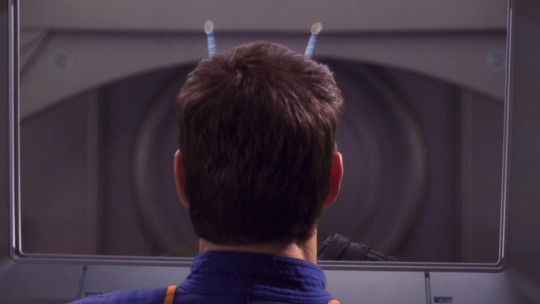
“The Imperial Guard thought you would be grateful to have an ally… considering no one else (pointed look toward T’Pol) came rushing to your aid.” An unnecessary shot at T’Pol, considering she actually came along.
Shran and T’Pol have great chemistry too. Barely restrained animosity but tempered with grudging respect. It’s the relationship of all three that is important for the Federation. The trust that develops between Archer and Shran is important, but T’Pol’s presence too, constantly making choices that shock Shran and disrupt his attitude toward Vulcans, is as necessary as the other dyad.

T’Pol actually has a similar impact on Shran as she does on Archer (and Trip, for that matter). Because of her loyalty and uniqueness among Vlucans, she shocked and awed them both out of deeply held animosity towards her species. And not just on an interpersonal level, but in a way that would help shake up centuries of moribund relations.
In fact, Shran points out how huge it is that T’Pol remained on Enterprise. A point that doesn’t get emphasized enough, either in show or IRL, is the amount that T’Pol gives up to continue supporting Archer.
Shran: What happened to your uniform, Sub-Commander? Not that I don’t find your new look becoming… but it’s not exactly regulation is it?
T’Pol: I resigned my commission.
Shran: Yes, I believe I heard something about that.
Archer: Why are you here?
Shran: Your world is in jeopardy, and where are your friends, the Vulcans? Where is their mighty fleet? They couldn’t even spare one officer. She was forced to abandon her career to remain on your ship! A remarkably selfless act… for a Vulcan.

Archer/T’Pol walk and talk. We get some Vulcan and Andoria backstory, which seems a little late in the game. Shouldn’t they have had a talk about this at some point during their initial meetings with the Andorians?
Either way, she ends up being right about the need for security and about the Andorians’ duplicity. In retrospect, Shran’s scheme was well-played. Both Archer and T’Pol could buy the Andorians coming into the Expanse simply to one-up the Vulcans, but T’Pol’s knowledge of their history made her hesitant.
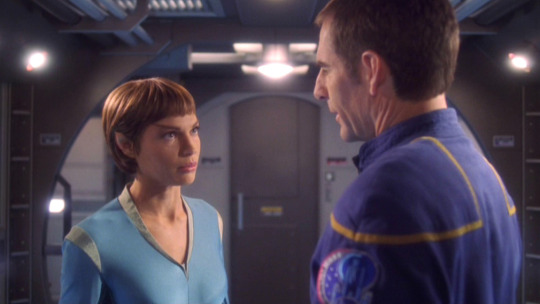
Some good stuff between Reed and Talas. I always found Reed very engaging and interesting as a character, and it’s a shame he didn’t get more attention.
Trip has a great moment of sass while watching Reed and Talas banter. “Well, I’ll leave you two to get acquainted.” Reed and Trip were always a good duo, even from the pilot.
Awesome romantic dinner in the captain’s mess between Archer and Shran. Even though Shran is playing a part here, I think a lot of it is also genuine. Shran, manipulative bastard that he is, both uses aspects of the truth to make a lie believable AND using his lies to reveal some truths he had kept hidden up to now.
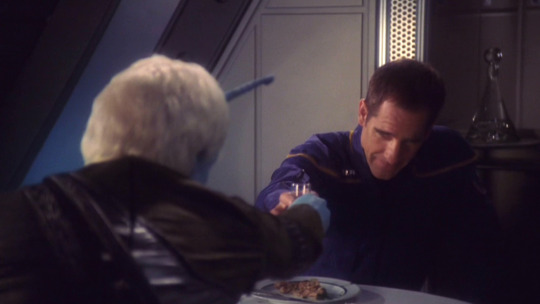
Then there’s a Trip/T’Pol scene. Three VP sessions a week, jfc. The network was trying so hard, although these are the scenes between them that I prefer. Not the neuropressure crap or the ultra-dramatic plots they throw at them, but when they are connecting over their responsibilities and duties. I mentioned earlier in the season that the writers already had a great way to kickstart any Trip/T’Pol romance they wanted, which was their co-research on Trellium. They would be isolated, passionately invested, and facing high-pressure from the Captain. Perfect combination... but... alas. Anyway, I digress. I find it interesting that T’Pol doesn’t share her suspicions about the Andorians with Trip.
Reed and Talas bickering!
Intense Trip/Shran scene. A duo you don’t get to see much of, so it’s nice to see them interact.
Degra’s test… and then the Archerite scene, which is pure brilliance. One of the funniest scenes of the whole show.
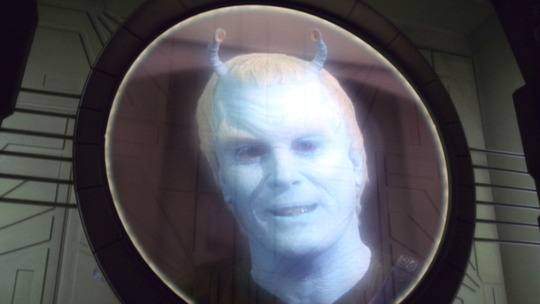

At this point the plot really starts to kick in, so my thoughts become sparser. I care more about the quiet moments and character beats, especially on re-watch.
Reed and Talas scene… Talas is really up to something this time. Archer/Shran/T’Pol debrief… the reveal of Shran’s duplicity begins to become apparent. In a second debrief scene, its’ even more apparent to everyone that the Andorians are about to pull a double-cross.
The connection Archer forged with Graelik comes through!
Interesting scene between Shran and the general. The clearest picture in a while of how much of a maverick Shran is for an Andorian, akin to Archer and T’Pol.
Then the double-cross goes down! But Shran telegraphed what he was going to do, so everyone on Enterpise already knew and had prepared.
And Shran sends the scans in secret in the end, showing that while he might play his part for his military/government, he still personally feels a connection to Archer and T’Pol. He is willing to risk his career in the same way as T’Pol, though not quite as openly as her, to keep his relationship with Archer viable.
Archer and T’Pol were both right this time. The Andorians couldn’t be trusted… but Shran ultimately came through.
The episode ends up back where it started, on the Enterprise at least, with T’Pol, Hoshi, and Archer analyzing data.


Archer invites Trip and T’Pol to dinner to drink some Adorian ale. And like usual now, the show pretends that Archer/T’Pol/Trip have nothing to discuss that might be awkward or uncomfortable.
Screencaps: https://ent.trekcore.com/gallery/thumbnails.php?album=117&page=5
Transcripts: http://www.chakoteya.net/Enterprise/65.htm
9 notes
·
View notes
Note
For the character thingy, romana and leela?? ❤
ROMANA - I’m going to answer for Romana I, since I already did Romana II!
favorite thing about them: so I fell in love with Romana I instantly when I watched The Ribos Operation. I was like “wait no one told me that Romana’s basically a recent graduate who always thrived in school but has now suddenly been thrust into the Real World and is a bit of a mess” and oh my god why is she so relatable, also I love that about her. I love that she doesn’t quite know what she’s doing, and her academic brilliance doesn’t necessarily help in the situations she’s finding herself in, but she keeps trying and learning, so by the end of season 16 she’s much more confident and capable on her own than she was when she started. I just absolutely adore the premise of her character and how she develops during the key to time quest. also her banter skills are so excellent. (….this wasn’t one thing whoops. 😄)
least favorite thing about them: I feel like it’s something about how she’s portrayed in the Gallifrey audios, but I can’t quite articulate what? but I feel like somehow, some of the things I really liked about her on TV (her witty fun banter, her determination even when she’s out of her depth) aren’t represented as much when we get glimpses of Actual Romana I (not Pandora or an alternate universe version). idk if this is even fully true, it’s just….she doesn’t quite have the same vibe as the character I remember from the TV show (but this is also tricky because the Lies scene, the Matrix projection in Lies (which *isn’t* really her technically) and the remains of her consciousness in the body that Pandora’s using are the only times we get Actual Romana I - which isn’t that much time to express all the nuances of her character.)
(continuing to skip the favorite line question because it’s too hard)
brOTP: her and the Doctor!! (like I said in the Romana II ask, I used to ship them more, but lately I’ve been more into a platonic interpretation.) I just as instantly fell for their dynamic in the Ribos Operation - two people with very different personalities who don’t get along but are forced to work together and gradually become friends?? this is exactly the kind of relationship arc that I adore. Their banter and snark is So Good (I was so entertained by their interactions in Ribos Operation that my brain refused to pay attention to anything but their scenes, and I ended up having issues following the plot later oops). And I love their growing respect and care for each other - how they go from being mutually dismissive of each other to valuing each other and being a solid Team and just really genuinely liking each other! their friendship is just Very Good (…..and now I really want to rewatch season 16….I’ve only seen it like one and a half times but I loved it very much….)
OTP: I don’t think I have any ships with Romana I that I would consider an ‘otp’? (the closest would be her and the Doctor since I have sometimes shipped them and I adore their relationship in general)
nOTP: Brax/Romana again….and tbh with Romana I it’s more of an actual nOTP (rather than ‘kinda nOTP, kinda ‘it’s complicated’’) because this is the time frame when she’s actually his student and so my discomfort with student/teacher relationships really rears its head (although there’s still one fic out there that I just think is so well-written.....but it does show the relationship as very unhealthy).
random headcanon: .....so sorry to continue Sartia posting, but oops the first thing that popped into my head is my new maybe-unrealistic headcanon that Sartia was Romana’s first kiss. in a teenage “I’m curious and want to try this thing and you’re the only person I hang out with, but it doesn’t mean anything....or does it??” way. (.....this is so self-indulgent in such a terrible way rip.)
unpopular opinion: Armageddon Factor is my favorite Key to Time story! (I gather this is an unpopular opinion in Doctor Who Fandom At Large, it doesn’t seem to be liked as much as some of the earlier stories in the season.) technically I’ve only seen it once and it was a couple years ago, but I remember loving it as a Romana story, there were a lot of really interesting character bits for her!
song i associate with them: hmm I don’t really have one? my Romana playlist is specifically for Romana II in Big Finish so....yeah.
favorite picture of them: anything with her Ribos Operation outfit (with the full cloak), it’s iconic and beautiful! on a similar note, I love this Romana I art by @volucris-liga, it’s the first Romana fanart I ever reblogged and it’s so pretty!
more under the cut!
LEELA
favorite thing about them: her resilience and her kindness. Leela goes through so much grief and pain, she has her world upended again and again, she never really finds a place where she belongs. and yet she still keeps choosing to love, choosing to keep fighting for what she believes in, choosing to rebuild again and again. and sometimes it’s really hard and she doesn’t want to go on….but she does, and she finds moments of happiness again. and that strength is really powerful. and no matter how cruel the universe (and other people) are to her, she is still relentlessly kind - she listens, she protects, she wants to help, she cares.
least favorite thing about them: I mean, the “savage” stereotype that her character references is a racist/anti-indigenous trope (especially the whole dynamic of the Doctor trying to “civilize” her ugh). and I hate that characters keep calling her “savage” (even when they’re the Bad Guys, it’s still bringing up this trope again and again, and it’s even worse when it’s the Good Guys). why are they still doing this.
brOTP: see all characters listed under otp, every relationship that I ship is also an incredibly important friendship in Leela’s life and I love all of them <33 as far as relationships that I see as entirely non-romantic….I really love the version of Leela and Ace’s relationship that exists in my head (and in fandom) - they didn’t get to interact enough in the audios, but I absolutely think they were really close, because of their shared experiences and the ways their personalities mesh. (I feel like I should also say the Doctor here, but tbh I don’t remember her TV stories that well, so I don’t really have a solid memory of what their relationship was like.) and of course, Leela’s parental relationship with Rayo is very important to me!
OTP: once again, ot3 my beloved <33 and Leela/Romana first and foremost (I already rambled about them here, so I’m just going to second everything I said earlier).
and I also ship Leela/Narvin, although I’m not quite as invested in that pairing? (due to a combination of ‘Romana is my favorite character and so I’m just more interested in her relationships with other characters,’ ‘I joined the fandom when things were pretty much all Leela/Narvin all the time (I say with great respect and affection for the artists and writers putting out amazing content for that ship) so I was motivated to write fic primarily for R/L and N/R to balance out the ot3 content,’ ‘apparently I have a contrary streak with Gallifrey and the more the writers push a romantic interpretation of a relationship, the less interested I am in actually shipping it,’ and ‘I’m not really into Leela/Narvin as a pairing on its own - although I do love a lot of fic that portrays them that way bc it’s just very well-written.’) But just. how they form a grudging alliance for Romana’s sake and then develop genuine respect for each other and then build this really solid foundation of teamwork and fondness and care and really relax and feel comfortable around each other….the way they become ride-or-die for each other and just trust and love each other so much….it’s Very Good!! (And I did love writing scenes with the two of them in Call It Home - I might not focus on them, but I do genuinely love their relationship.)
And of course Leela/Veega <33….I debated if they even interacted enough in the actual audios for me to consider it an otp, but I love the idea of their relationship and the story of them in my head so much?? going to link to this post because it really captures my feelings about them - they’ve both been through so much grief and pain by the time they meet, they’ve both lost people they love before, so the idea of them choosing to love each other and build something together against the odds is just. very powerful. plus I have a whole playlist for the family they’ve built together, which is a strong indication that I really love this ship. 😊
nOTP: Leela/Andred. last time I answered an ask meme about Leela, I had this complicated response about how I hated Leela/Andred when I watched Invasion of Time (bc it’s so abrupt and arbitrary), and then Louise Jameson’s voice acting Convinced Me To Care because oh she really did love him....alas i am a Leela/Andred detractor at heart, and I have been nudged back to my default state by re-listening….I simply hate how he treats Leela in Gallifrey.
random headcanon: I really like the idea of Leela being more politically involved in her own right after they all return from the Axis. She’s just spent a lot of time leading a group of people who don’t have a voice in the government, fighting for their rights against the established injustices of Gallifreyan society. I don’t think she’d easily slip back into only being Romana’s bodyguard after experiencing more political autonomy on the other Gallifrey. What exactly this looks like in practice I’m not sure about - in my one fic ‘verse, I wrote about her being more directly involved with the Academy as a political liaison and guest tutor, and also advocating to Romana for policies that would benefit those who live outside the city on their home Gallifrey. but there’s probably a lot of options to explore here!
unpopular opinion: hmm I don’t think this is necessarily unpopular but idk and I want to talk about it: even though Leela identifies so strongly as a warrior, a “happy ending” for her would, I think, need to involve getting away from fighting. too often she throws herself into a fight to try to avoid thinking about how much she’s hurting, and it doesn’t work, it doesn’t stop the pain. and in the Time War, she’s tied her identity so strongly to war (it’s inevitable, inescapable, and she will Fight and Defend because that’s all she has left). there’s a difference between “I am a warrior” and “all I am is a warrior,” and Leela’s slid too far into the second one, and she needs to untangle her own identity from war to heal.
song i associate with them: Freedom by Karmina (it’s a song about going on defiantly in the face of heartbreak - “Tearing my room apart, I’m starting over” / “Take my pride I can still survive I’ve got my freedom” / “Hunt me down you’ll never find me now that I’ve got my freedom”)
favorite picture of them: the first one that came to mind is this gorgeous art by @laurelhach (which I didn’t realize was based on a picture until I stumbled across the original picture and was like oh my god!! it looks exactly like the art!!)
#thank you for sending these!! <33#sircarolyn#asks#gallifrey audios#romana#leela#ramblings#gallifrey spoilers
5 notes
·
View notes
Text
An analysis of Kagami’s character in season 3
Warnings: discussion of anxiety and not good parenting
I hated Oni Chan when it first came out, because it seemed like it was really butchering Kagami’s character, but I just rewatched it and... all of her actions seem really justified. Looking at her thought process has lead me to a way deeper understanding of Kagami’s character
(under the cut because this got fairly long)
So obviously she acts way over the top while she’s akumatized, that’s how akumas work, but the parts where she’s acting of her own free will? Everything she did made perfect sense.
To review, just before being akumatized, Kagami is practicing fencing with her mother. She gets a message on her phone, and her mother makes her wait until after she’s done practicing to open it. Kagami looks really disappointed in herself for getting in trouble with her mom. This is speculation, but that is her mom’s only spoken line in the entire episode, so there’s a chance that the only comment Kagami’s mother made during her entire practice was being upset at Kagami for her phone, and that would force Kagami to fixate on the message throughout practice. She clearly wants her mother’s approval, and the message was getting in the way of it. Even if it wasn’t the only thing she said, it’s been shown that Kagami takes any criticism from her mother really hard.
Also, this episode comes before Ikari Gozen. Kagami’s still has basically no friends (except maybe Adrien) and desperately wants to be accepted. There was a reason that she picked up her phone immediately and tried to look at the message; Kagami isn’t the type to just forget her mom’s rule. So either getting messages on her phone is so rare that it’s something she never really had to deal with before, which would make the message something really special to her, or she just desperately wants friends enough that her eagerness to see the message won out over her strict discipline enough to make her forget the rules.
And then, after all the mental buildup, Kagami finished practicing and opens the message. So, keep in mind, on top of what I already said, that Kagami’s going to be physically exhausted because she just finished a workout, and probably also frustrated because her mother definitely didn’t give her the validation she wanted. She’s going to be sort of on a knife’s edge anyways. And, judging by her brief smile as she put her phone away while her mother told her off, the message was probably something that she was looking forward to as a way to ignore all the other pain.
Then comes the part that everyone criticizes. In the course of about 30 seconds, she 1) opens the message to see that it’s a selfie of Lila kissing Adrien on the cheek, 2) sort of growls as she throws her phone across the feild, 3) opens up a notebook, gently touches a photograph of her and Adrien at fencing practice that was carefully tucked between the pages, 4) pulls out the rose Adrien gave her which is now pressed, 5) we see a brief flashback Adrien handing her the rose in Frozer, and then 6) she picks up her sword, 7) we see a few tears run down her face, and then 8) she gets akumatized. That all seems super sudden and needlessly dramatic at first viewing, but let’s break it down.
No matter what, it’s going to hurt to see the picture of Adrien who’s apparently casually hanging out with some other girl in his room. Kagami “never hesitates” and I think it’s safe to assume that she’s already asked if she could visit him multiple times and been turned down because he’s “never allowed to have friends over” or something, so this is going to feel like a slap in the face. She doesn’t have enough time to think everything through, but just the brief suggestion that her only friend might have been lying to her to avoid her because he didn’t actually want to see her is an enormous blow to her fragile self-confidence. Just by merit of having Adrien as her only friend, she’s going to hear a whole lot of “sorry I can’t interact with you ever my dad doesn’t want me to have friends” and by merit of being Kagami she’s got some huge doubts and trust issues, so I can almost guarantee that the fear that he was actually lying to her and just disliked her had probably been bubbling for a while and wouldn’t take much to set it off. Especially in during a post-fencing practice adrenaline high, throwing her phone was a pretty understandable reaction.
Then, there’s the photograph and the rose. So Kagami obviously cares deeply about Adrien if she’s carrying those around with her, but it makes sense. He gave her the rose like it was something deeply special, he’d probaly be expecting her to keep it safe, and it makes sense that she’d want to preserve it forever. And keeping photographs with friends is a pretty normal thing.
Now, we don’t know the exact details of Kagami’s home life, but from experience interacting with my friend’s parents, her mom strikes me as the type of parent who’s obsessed with control and doesn’t believe that their children deserve privacy. and 90% of the time, that kind of parenting leads to children who try to hide everything they can from their parents and are really good at sneaking away (like, maybe, lying to their mother about participating in a harmless game? Knowing enough about their car’s security to hack it without a second thought? Sneaking away from a fancy event the first chance they get? Only having one number in their entire phone because their mom won’t let them talk to others? Impulsively lying to their mom about interests? I could go on forever but yeah Kagami’s a very familiar type of person that I see in a lot of my classmates and it hurts my heart.)
So back to the photograph and the rose being kept on Kagami’s person at all times: it makes total sense. She doesn’t have any privacy anywhere else. She’s going to be afraid to talk to her mother about any of her interests anyway for fear of being ridiculed, and even more terrified when that interest is friendship. Look at Ikari Gozen. Kagami brings up Adrien in front of her mom for the first time on screen, she says his first and last name like she’s trying to be really formal and distance herself emotionally from him. Then, her mother immediately insults Adrien and you can physically see Kagami regret what she had said and try to change the conversation by just agreeing with her mother. She knows she won’t ever change her mother’s mind and she does her own thing regardless of what her mother says, but that doesn’t make her mother’s disapproval not sting. Of course, in a world where she has to hide any interest she has if she doesn’t want it to be attacked, she’s going to keep the photograph and the rose away from anyone else’s prying eyes.
And then, I’ll admit, at first I made fun of her impulsive reaction: where she saw a selfie of Adrien with another girl and then immediately started petting a photo of herself with him, but this time I thought about all of this from Kagami’s point of view and I had a huge realization.
I headcanon Kagami as having both anxiety and autism, and it’s pretty well supported by the show anyways, which is a conversation for another time. But specifically, having both means that they can feed each other a lot. If you’re having an anxiety attack because you think your friends might hate you, it’s a lot harder to break out of it if you also know that you’re terrible at reading social cues, and it’s easy to become overwhelmed by the fear that people are just subtly telling you they hate you and you’re missing their cues. And that would relate to Kagami’s situation incredibly well: she doesn’t have anyone else to validate her, and Adrien’s nice and all but it’d be really easy, especially in the clutches of an anxiey spiral, to think that maybe his “excuses” are actually his way of tellling her that he doesn’t like her, and that her own lack of social nuance is keeping her from seeing it.
This is obviously not a good place to be mentally, but as someone who has been there and who has a therapist, the best advice I’ve ever gotten to deal with it has been to step back and look only at concrete things, because my brain will take anything open for interpretation and turn it into an attack on myself.
And this is exactly what Kagami does. I’d bet that this has happened several times before, because Kagami had been overwhelmed by so much emotion that she had growled and thrown her phone; I think she was acting on instinct when she pulled the notebook out. And it makes sense that this would be Kagami’s impulsive response: she was just flooded with an unmanageable wave of fear and doubt that Adrien had been lying to her, and then she turned to the concrete evidence she had that he did care about her. Remember, this isn’t just about romantic fantasies, this is about the only friend she’s ever made and her own fear that she can’t even trust herself to read interactions; it’s going to be really overwhelming. So she pulls out the photo of herself with Adrien. It’s real, it’s proof that Adrien was there with her and acknowledges that she exists and smiles at her like that. In the midst of a breakdown, that photograph would be a huge means of grounding herself in reality. And then she pulls out the rose, even more solid evidence that he cares about her. No matter what else, he did give her this rose, it’s real and it’s here.
So I can completely see why she that was her immediate reaction: the message triggered a specific panic attack that she’s had multiple times before, she freaked out, and then she turned to calm herself down the best she could. It may have all turned out fine and deescalated quickly. Except, the rose is connected to a very specific memory: a very sad Adrien told Kagami that he was in love with someone who didn’t like him back when he gave it to her.
Take a second to think about this all from Kagami’s point of view: she’s ridiculously emotionally unsteady at the moment, she’s thinking about a time when Adrien was left brokenhearted by some girl who he’s still waiting on, and then she gets a photo of a girl being all flirty with Adrien. She knows Lila Rossi specifically, I don’t know how much she knows about her lies, but she seems to know her enough to know that she’s a manipulative jerk. So any implication at all that this could be the girl who’s continuing to break Adrien’s heart, and who he’s still loyally waiting on? Of course Kagami’s going to go absolutely mental. She cares about Adrien enough to want to protect him from anyone who’d toy with his emotions for their own benefit.
I don’t know exactly why she picks up her sword, whether she was going to blow off some more steam practicing or what, but it was a time when Kagami had every right to act rashly. Same thing goes with the fact that she started crying in that moment. She’s so so overwhelmed. And then of course Hawkmoth akumatizes her.
I’m almost done, but seriously, if you haven’t seen this episode in a while, please take a look at Kagami and Adrien’s interactions at the very end. Kagami is so ridiculously happy when Adrien is nice to her, and in context of everything else, it’s almost sad. But she very clearly does care about Adrien and wants to be able to trust him to make his own decisions.
58 notes
·
View notes
Note
27-29 for the get to know my favorites game
Hello, lovely! Thank you for these. :) Trios turned out to be a surprising challenge (I apparently have more favorite groups of four than three), but I’m pretty happy with the ones I remembered after giving it some thought. The final picks are under the cut! <3
Top 5 BROTPs
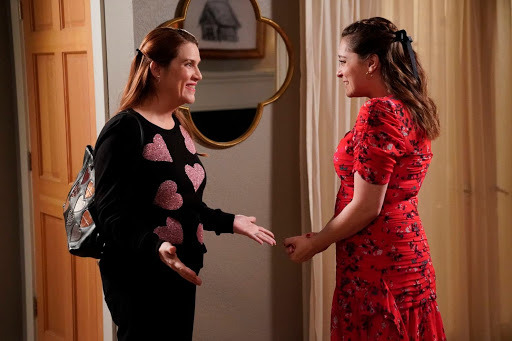
1. Paula Proctor & Rebecca Bunch (Crazy Ex-Girlfriend) - Naturally, this was the immediate choice that sprang to mind. It’s the first relationship on the show I really fell in love with, and it’s the one friendship in the series that consistently tugs on my heartstrings. It’s flawed, complicated, and messy but the genuine connection underneath it all is strong enough that I’m hopeful they can work through their problems. I would’ve preferred to see more emphasis on that effort in the fourth season (and a lot more work on Rebecca’s friendships with Heather and Valencia as well), but I want to believe things improved between them after the finale.
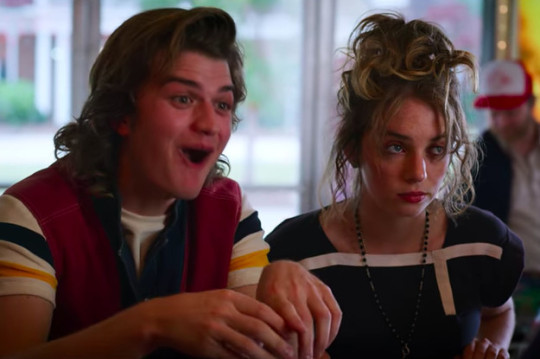
2. Steve Harrington & Robin Buckley (Stranger Things) - The general public opinion of Steve Harrington has been on such a journey since Season 1, bringing him now to a status of common fan favorite. As such, I think a delicate balance needed to be struck in finding a suitable match to team up with him on adventures. This person needed to:
A) Have good chemistry in their interactions with Steve
B) Bring a new dynamic to the table that he didn’t already have with an existing connection
and most importantly
C) Be a unique and engaging character that the audience would care about individually, so they didn’t get lost in simply being an offshoot of Steve’s story. They couldn’t be relegated to perpetual sidekick with little else to define them.
As far as I’m concerned, Robin Buckley fits the bill on every account. She’s artistic, resilient, loyal, and - especially endearing to me - a movie buff. She has a quick wit, a sharp mind, and a big heart. Being friends with Robin helps Steve take the specter of his high school self less seriously so he can put it behind him, and she helps him more fully embrace the person he’s becoming in the wake of that lost status. Having Steve for a friend helps Robin resolve some lingering emotional scars from school as well. It gives her an opportunity to share her authentic self with a peer and - to her relief and ours - find acceptance after revealing a pretty important secret. I can’t wait to watch the two of them be adorably nerdy and goofy bros at Family Video in Season 4, presumably with some daring fights against dark forces when they’re off the clock. Does saying I hope Kali comes to Hawkins somehow and bonds with one or both of them mean I can speak that into existence? I’m doing that now. It’s worth a try. If it happens in some capacity when the time comes, know that I will throw a One Blogger Party of epic proportions.
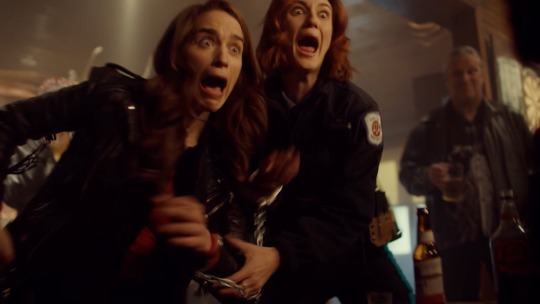
3. Wynonna Earp & Nicole Haught (Wynonna Earp) - I had to use this specific screencap because it perfectly encapsulates the chaotic energy that makes me loves these two together so much. Their separate approaches to their shared work environment are at pretty much polar opposite ends of the spectrum, but they make a pretty solid team when they play to each other’s strengths and communicate. They also both love Waverly most of all, so it feels like they were bound to work out their differences eventually since neither would want to make her feel torn between her sister and her girlfriend. The hijinks they get up to in each other’s company are just top shelf. I look forward to at least a little bit of fun like that from every season. If I wind up having a lasting partner later on down the road, it’d be cool if their personality balanced well with my sister’s on this level. I’d also be really happy if I ultimately gelled with her person in a way that sounded unlikely at first but worked. Fingers crossed for both outcomes, but I guess we’ll have to wait and see.
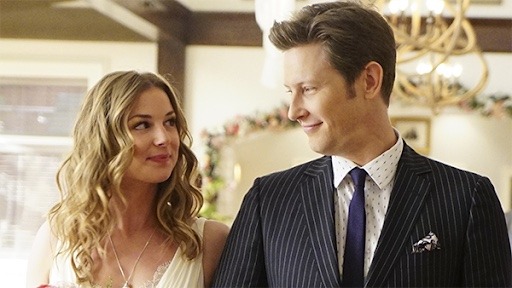
4. Emily Thorne [Amanda Clarke] & Nolan Ross (Revenge) - I have two things to quickly clarify for those who are unfamiliar with this show.
#1 She has two listed names because she was born Amanda Clarke but goes by Emily Thorne for most of the series to hide her true identity.
#2 Despite the impression this picture may give, Nolan is not marrying Emily; he is simply walking her down the aisle.
These two are there for each other through so much - the looming threat of discovery, jail time, capture, near death experiences, heartbreak, the passing of loved ones, etc. - and they make it to the other side with a deep bond the likes of which they’ll never experience with another person. It is at times heavily one-sided because of how much drama Emily deliberately dives into, but it’s something that she tries to make up for during her more self-aware and less self-involved times. There’s genuine love and mutual respect there by the finale and it’s really gratifying to witness the journey they’ve taken together.
[~Slightly spoiler-y closing statement after these brackets~] I was pretty sure I knew where the show was going with romantic ships by the end. I knew for certain it wasn’t my personal OTP for her because they’d already killed that person off quite some time ago. There was a part of me that could’ve found some contentment in leaving the story with these two as a couple. After all, one of my favorite ship dynamics is Reluctant Acquaintances to Best Friends to Lovers, but it was not to be. That being said, the platonic friendship they shared was a big part of the heart of the show and I cherish it for that. Nolan was a rare exception for Emily, a genuine bond formed in the years when she was tried to operate like her heart was made of stone. I also think working with Emily gave Nolan a sense of purpose and let him flourish in his area of expertise. I’m not sure how either of them would feel about the musical reference but, to slightly paraphrase from Wicked: because they knew each other, they have been changed for good.
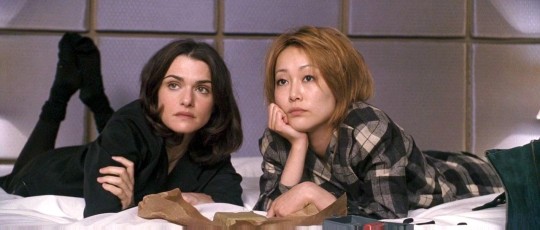
5. Penelope Stamp & Bang Bang (The Brothers Bloom) - I have seen Rachel Weisz and Rinko Kikuchi in more roles since this movie than I had prior to watching it for the first time so, if anything, my fangirling over this friendship has gotten worse rather than more manageable. x) This post classified the film under the subgenre whimsical noir. It turns out that’s a style I instantly adore every time I stumble upon it. One of the titular brothers, Stephen, lives so deeply immersed in the variations of the world he writes for their heists that even those closest to him are essentially characters he can interact with on a daily basis. His feelings for them as people can get very muddled with his feelings for them as interesting OCs to move through narratives. A big trouble with this is that his living archetypes can often get reduced to clichés. He’s not always mindful of their nuances or allowing for the full range of their autonomy. Penelope is selected by Stephen to serve as the “manic pixie dream girl” who will be his brother Bloom’s forever love and Bang Bang is essentially presented as a “dragon lady” stereotype. I haven’t done a rewatch in years so I may be giving the movie too much credit here, but I remember this choice feeling at least semi-deliberate. It could be interpreted as a way to illustrate how Stephen warps real life to fit his vision. At least, I can definitely remember scenes that felt like they debunked the one-note assessments of these two. What I genuinely love, though, are the little moments when Penelope and Bang Bang are able to just spend time together with little to no interference from Stephen or Bloom. They share their hobbies and teach each other new skills. It feels like they truly perceive one another as whole human beings on a level that neither guy is capable of doing since they’re both so immersed in the drama of the plot. When the women are with each other, they get to be more than an extension of the men who maneuver them; they get to be themselves. Penelope is the only one Bang Bang clearly wants to maintain contact with once the heist is finished. I think that says a lot. Honestly, this is another BROTP that could slide to OTP. If someone wrote fic of them completely severing ties with the brothers and going off on their own - romantically or platonically - I wouldn’t be upset at all.
Top 5 Trios

1. Luke, Leia, & Han (Star Wars Episodes IV - VI) - Oh dear, I’m overwhelmed just looking at a picture of them together. Star Wars has been a part of my life since childhood. Getting to watch the original trilogy felt like a rite of passage (when I was really little, Mom used to find things for us to do outside the room while Dad watched because she was afraid some of it might scare me). Princess Leia resounded with me on a level that almost no other fictional royalty has ever quite matched. Han’s wardrobe is still some serious #aestheticgoals and I would 100% wear replicas of his jackets and vests if I had them. I also remember thinking that Luke’s new look in Return of the Jedi was SO COOL with the all-black wardrobe and green lightsaber. Wow, imagine that, an edgy costume change that shared vibes with the common Disney villain color palette called to me as a baby fan of antagonists and antiheroes! Who ever could have foreseen that sudden spike in appreciation? :P Anyway, one of my lingering sorrows about the more recent trilogy is that we never got to see all three of them as aged adults in each other’s company. I still wanted our new cast to get their time to shine, of course, but I do lament the absence of at least one little trio reunion.

2. Luna, Neville, & Ginny (Harry Potter series) - The Silver Trio, pictured here with the first set of three that comes to mind when thinking about the books and movies. I do still love Harry, Ron, and Hermione, but I’ve found a growing appreciation for this other team-up over the years. They’ve been through a lot too, even if they are not always present where the main action is. Bullying, loss of parents, manipulation of the mind and body, abuse at the hands of authority figures - they’re all left with internal (and probably external) scars to bear. There’s also something to be said for how strong they all were in the school year set during Deathly Hallows, when the Golden Trio wasn’t around to inspire and unite those who wanted to stand up to ever-increasing tyranny. It can be easy, unfortunately, for them to get written off based on the oversimplified stereotypes that have gotten associated with them. People remember Luna as being weird and spacey, Neville as awkward and hapless, and Ginny as bland and lovestruck. They’re all far more nuanced than that, and they accomplish great things while fighting for and beside their friends. I’m planning on doing a re-read of the books at some point, and I really look forward to revisiting these brave kids.

3. Irma, Marion, & Miranda (Picnic at Hanging Rock) - Ah, yes, my very recently discovered darlings. I have many thoughts about them all. I’ll try to keep this as condensed as I can while still making sense. Some spoilers will follow, although those won’t answer every question the story poses. There are audience members who ship the above characters as a throuple, which I totally get, but for me it’s like soulmates of a different kind. These three have met at a point in their lives when they all burn with compatible intensity. They long for the same dream version of youth, for a way to begin life free from the confines of a world that won’t accept all their hearts contain. While the people that surround them may not be willing to bend the rules, nature itself appears to show them mercy. How often do we see a story of girls who just... love other women so much that a sacred location goes, “Y’know what? I’m gonna help you escape your restrictive society. Permanently.” This miniseries definitely depicts the setting as being involved in messing with the investigation, as a mystical place that befuddles unwanted intruders. I love the way these three fortify each other in times of pain and fear, and there’s something deeply moving about how standing side-by-side helps them defy the odds.

4. Sarah, Alison, & Cosima (Orphan Black) - Okay so, technically, when I picture our core team in this show, the net is a little wider. My mind tends to also include Felix, Mrs. S., Kira, Helena, Donnie, Delphine, and Scott. However, I think you could kinda argue that those characters have a stronger connection to one of the above three than they do to the other two. Thus, this ends up being the central triangle. They’re all such solid performances and the fact they’re all played by the same person is incredibly impressive (not to mention the, like, twelve other clones Tatiana brings to life throughout the series). Watching them go from tense strangers to sestras was wonderful. I’m glad they had each other through the increasingly complicated web of lies and schemes they had to unravel and survive.
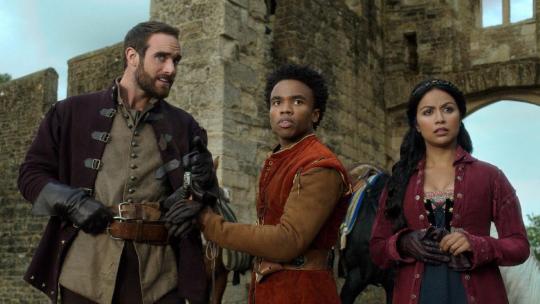
5. Galavant, Sid, & Isabella (Galavant) - Remember how James Marsden was in Enchanted? If you dialed down the deliberately cartoonish quality of that performance and allowed for more not-so-G-rated humor, I feel like you’d have a general sense of what Galavant is like as a character. Sid is his squire and Isabella is a princess whose mission happens to combine with Galavant’s, albeit fueled by different driving motivations. They find themselves involved in a lot of shenanigans because of Galavant - even in his own universe, he’s into the whole dashing knight thing more than is strictly necessary - but they make a fun little team to follow through the world of this musical television series. I’ve gotten fuzzy on the details since I watched it air live four years ago, but I remember the series being enough of a summer feel-good time that I’d be game to revisit the show again someday.
Top 5 Family Relationships

1. Stevie Budd & The Roses (Schitt’s Creek) - The whole fish-out-of-water setup for this series was already pretty fun in and of itself, especially given how outlandish their lifestyles evidently were before the show begins. The thing that makes it special, though, is how the absence of all their expensive distractions finally helps them prioritize being a family. The Roses do a lot of work to reconcile who they were with who they find themselves becoming in the present. It’s sweet to see them collectively conclude that growing closer to each other is one of the few things they do not regret in the slightest. They also silently agree to adopt Stevie along the way and, boy, does that give me a lot of Big Feelings, particularly in the later seasons.
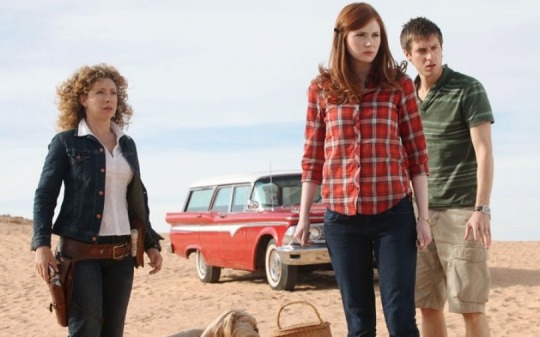
2. River Song & The Ponds (Doctor Who) - I think it’s been like seven years or so, give or take, since I watched Doctor Who with any regularity. These three have resurfaced in my mind many times since then. They all love with such fierce and unwavering devotion, spanning lifetimes. It’s fascinating - and often heartbreaking - to learn about the things they’ve experienced and endured. Oh gosh, and once the show reveals how River’s story overlaps with theirs, and you pay attention to how she looks at them, IT HURTS but it’s so engaging to watch. The emotions are all flooding back just remembering them now. Argh, what great characters... </3

3. The Tico Sisters (Star Wars Episode VIII: The Last Jedi) - Rose appears in two installments of the third trilogy, but this is the episode that has both Tico daughters. We never get to see them interact onscreen in the film, but I still feel the bond between these sisters so intensely. I found out later that Kelly was present for the filming of Paige’s death scene (which happens so early in the movie that it doesn’t feel like a big spoiler - please forgive me if it is). I’m glad that was something they decided to do behind-the-scenes, because it definitely informs Rose’s grief. She’s sitting in the dark, picturing her big sister’s final moments with such horribly vivid detail that it feels like she was there, and yet she can’t do anything to change how it ends. The shape of the sisters’ necklaces immediately establishes that they were a unit even when acting independently, that they felt like two halves of a whole - all they had left of their family. Now there is only one, and that fact is a weight around Rose’s neck both figuratively and literally. It serves as a visual reminder of how she carries Paige’s absence always, trying to discover and embrace who she is on her own while still honoring the memory of a relative she loved so deeply. I think she reaches the end of Episode VIII feeling like she’s someone of whom her sister would be quite proud. I’m very proud of her, too.
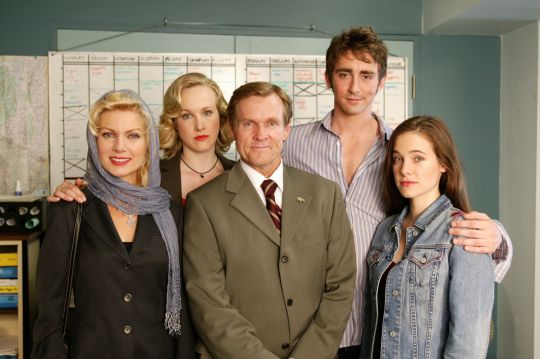
4. The Tyler Siblings (Wonderfalls) - Jaye is comically different than the rest of her family, and the show establishes that right out the gate when we learn that she’s the only one whose name doesn’t rhyme with the rest (left to right, the others are Karen, Sharon, Darrin, and Aaron, respectively). Her relationships with her parents could certainly lead me off on some analytical tangents but, predictably, it’s the sibling stuff that interests me more. I think it could be said that all three do more living inside their heads than they do out in the world, and that they’ve all grown up to be borderline loners (Ironically Jaye, who is considered the most troubled, is the only one I remember being shown to have formed and maintained a friendship). Aaron’s a very philosophical and analytical person, so you get the sense he talks to himself more than to others, although he still manages to resurface from those deep contemplations so he can goad and tease his sisters from time to time. Sharon is high-strung, competitive, and brings that “disaster lesbian” energy to basically every social interaction she has. Jaye’s standoffishness seems to stem from both the difficulty of fitting in with people and the fear that connections will fall apart once they manage to form at all. They’re all just messes trying to make the best out of the situations they face, and I appreciate that. I also enjoy how prominently the Jaye and Sharon sister bond features throughout the show’s only season. It starts out on pretty rocky ground, but they grow a lot in regard to how willing they are to communicate and express their love for one another.
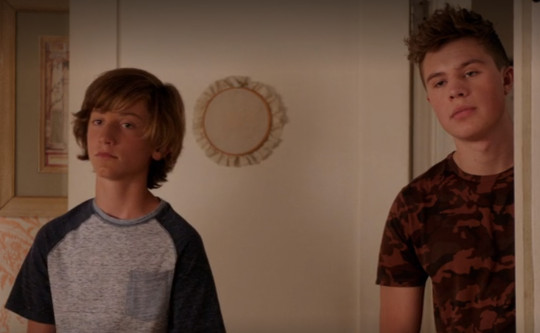
5. The Brothers Proctor (Crazy Ex-Girlfriend) - The family dynamics in their house are in need of some serious work, without a doubt. I’m just really touched by how close these two have become without Paula’s notice. It’s possible they always were, in that we-fight-but-we-care way that siblings can often be, but the supportive side of that really moves to the forefront as they get older in the series and it warms my heart. There’s such a glaring difference between The Household As Paula Views It and Things That Are Happening While She’s Not Paying Attention. I can’t help using fic as a way to explore that. I happily find excuses for her sons to make pop-in appearances, just to check up on them. I'm so pleased that, as of Season 4, they seem to have become fairly well-adjusted in spite of everything. Oh, and I am still not over the revelation that they attend renaissance festivals together, in character, for fun. What precious cuties who would no doubt dislike me referring to them as such! Paula, please give them an extra hug from me!
4 notes
·
View notes
Text
Nicholas Hoult, Lily Collins and the love story that inspired J.R.R. Tolkien’s writing, by Emily Zemler.
(click here to see the photoshoot and here to go to the website.)
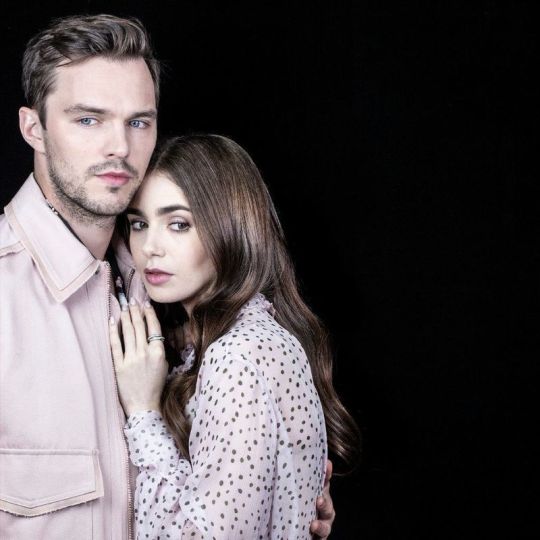
The early years of J.R.R. Tolkien’s life play out very much like fiction in Dome Karukoski’s biopic of the famed author. So much so that Karukoski doesn’t really consider “Tolkien,” in theaters Friday, to be a biopic at all.
The film, which stars Nicholas Hoult as the “Lord of the Rings” author and Lily Collins as his wife, Edith Bratt, recounts Tolkien’s young life, from the loss of his parents to his school years to fighting in World War I. Much of that personal saga is unknown, even to super fans of Tolkien, a category in which Karukoski puts himself.
“I didn’t know anything about his younger life,” the director said during a recent press day in London. “When I started digging it was surprising. It was this fable of emotions he had experienced that are so readable in his own books. ... It’s a story about youth and love and friendship and exploring his mind. It’s quite stunning that this story hasn’t been told.”
Hoult, who also grew up reading the author’s works, looked for fine details and nuance in his research, pulling from books and video interviews Tolkien did later in life. His goal wasn’t to do an impression of Tolkien, but to try to get inside his head and capture his essence.
“Nowadays, even if you don’t know someone’s work you seem to know them, just through how much news is covered and through Twitter,” the actor reflected. “You seem to know a lot about a lot of people’s lives. And this is someone who I was a fan of and when I read the script I was like, ‘Wow, I didn’t know any of that.’ It was ... lovely to get to go back through his work and learn about what inspired him and the relationships that meant something to him.”
The actor prepared while shooting “X-Men: Dark Phoenix” and spent time between takes — in full costume and makeup as Beast — painting watercolors in Tolkien’s style.
He added, “You do all this research and then hopefully in the back of your mind, when you’re on set, it’s subconsciously there. Detail is where it all comes from.”
Collins had less to work with because Edith and her life aren’t well documented. A few photographs, including some of the couple together, do exist — the actress sensed a cheekiness to Edith, which she brought to the performance — and Collins was able to research what it would have been like for women during that period in general.
She also learned piano for the role, since it is known that Edith played very well. Ultimately, though, much of Collins’ performance is drawn from knowing that Edith inspired Tolkien to write the characters of Luthien and Arwen.
“With a real person I feel, even if they’re not alive anymore, a karmic responsibility to do them justice,” said Collins. “We don’t know much about her and this is a chance to tell a story of a woman of the period that wasn’t told before. I would want to feel represented in a way she would be proud of. But ... there was only so much I could do. The rest of it was based on me thinking about the characters she inspired and me loving magic and fantasy. I wanted to formulate a person who would have all these qualities and be inspiring.”
While the film is ultimately not about Tolkien’s writing (there are very few moments where the character actually sits down to put pen to paper), a key scene reveals Edith dancing in the English forest, an instance that apparently inspired the author to base those characters on his wife. To find the right free-spirited vibe, Collins convinced Karukoski to let her dance to an actual song: Florence and the Machine’s “Dog Days Are Over.”
“She is magic when you watch her,” Collins noted of Florence Welch. “That was the one person I thought made sense to be inspired by. I just went crazy dancing.”
“Tolkien” balances these magical, light-hearted moments with heavier ones, eventually leading the characters into World War I, where the author served as a communications officer. Tolkien and his group of close friends from school, which the film suggests inspired the fellowship in “Lord of the Rings,” all enlist, but only two of them come home.
To better understand the horrific impact of the war, Hoult listened to 25 hours of Dan Carlin’s “Hardcore History” podcast on the subject. Karukoski didn’t want to present a straight-forward depiction of the trenches, however. He intersperses the images of war and gunfire with hallucinations of the sorts of fantastical beasts that appear in Tolkien’s stories.
“He’s a genius in building worlds, so wouldn't I want to see the inspiration for those worlds?” the director said. “Throughout the film he’s sketching his masterpiece — he sees a line over there and a line over there. It’s yet not the thing it will become. ... Watching an author create I wanted to avoid. It’s a story of growth, of how he became an artist.”
In order to tell this story well, Karukoski noted, it was necessary to make a few adjustments to the timeline and the events. For instance, the love story between Tolkien and Edith is somewhat simplified and compressed, and a few of the years are changed. But the director met with numerous researchers during the preparation for the film to ensure the scenes and characters resonate with authenticity.
“The film is very truthful in emotions,” he said. “We’ve taken artistic liberties. ... But the events are emotionally true. We were very, very accurate with the characters, but you have to find your interpretation of everything you discover about them.”
The Tolkien estate, which was not involved in the making of the film, recently released a statement that it does not “endorse [the film] or its content in any way.” Karukoski said he’s not bothered by the statement, especially since no one from the estate has actually seen the movie.
“I’ve approached them myself to arrange a screening,” he said. “I would love to sit with them and hear their thoughts and explain why some artistic licenses have been taken. The statement itself is not actually hostile — it’s more like they had to do it so that journalists wouldn’t call them. It was actually quite respectful. But I’ve given them the opportunity to watch the film with me and they haven’t responded yet. And I understand if that never happens.”
He added, “This film is done with huge respect. It’s not demonizing [Tolkien]. We can stand by the beauty of the story. We wanted to celebrate his life.”
The celebratory aspect is compelling to Hoult and Collins as well, who have both found a new respect for Tolkien’s life and work since making “Tolkien.”
“It’s really important to see this side of the story,” Collins noted. “To see what came before the actual stories. Maybe now people rereading the books or rewatching the movies will find little Easter eggs. Those unexpected beginnings are really fun to know about.”
“He changed literature and inspired so many things we love nowadays,” Hoult added. “It’s so ingrained in culture that it’s remarkable. I’d sit around trying to be as imaginative as him, which is impossible. You go around in circles trying to do that.”
Vía LA Times.
12 notes
·
View notes
Text
The Master (2012) | Written and Directed by Paul Thomas Anderson
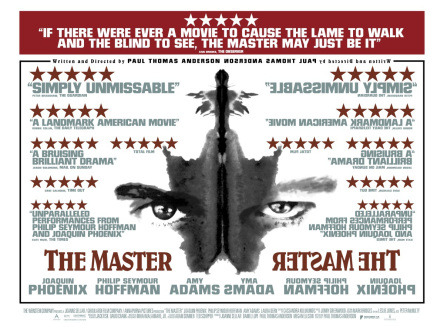
youtube
Intro and Technical Details
I try to figure out why I gravitate to certain films. Most of the time, it’s after someone asks me what my favorites are. I tell them, and then 90% of the time they don’t understand why I like those particular films.
I’ve asked myself if it’s just some kind of wanna-be elitist, cinephile phoniness or something...but that’s not it.
The reason I love films like The Master is due to their elusiveness. The Master shows you an approximate direction, but doesn’t overtly tell you what the answer is. In my eyes, this places it in a special category of cinema which is mysterious and often transcendent. It has something profound to say about us as humans and morphs with each viewing. It is alive because it doesn’t spoon-feed you an agenda or proposed concrete “truth” or “moral lesson”.
My goal in this post is to take what I know and implement my personal thoughts and film knowledge to try to gain a better understanding of what this film is. This is my third post analyzing a film of my choosing. The first was about two women (Persona), the second was about a man and a woman (Cold War) and The Master is about two men.
When people ask me what my favorite movie is, I tell them The Master by Paul Thomas Anderson. This is also PTA’s favorite film of his own. I remember the first time I watched it was at the NoHo Laemlle Theater a couple of blocks from where I live, right off of Magnolia, which happens to be the title of the first Paul Thomas Anderson film I ever watched.
But while watching The Master that day in the theater, I remember feeling lost and dumb. I knew A LOT was happening but I didn’t know what.
It left me behind.
As a short filmmaker, when I first started (around the time The Master came out) I would just have stuff in my films (images, sounds, lines, etc) that were superfluous and didn’t have any legitimate reason for existing. My intentions were good...I was trying to create an atmosphere, even though a lot of the attempted atmosphere didn’t connect to the story or the idea being examined. I think it’s because a lot of the movies I was watching during that time I didn’t understand. I didn’t know why the director was making the detailed choices he or she was making. I still don’t always know the reason, but I do have a better idea.
I must’ve thought these choices were just there spontaneously or by accident...for style-sake maybe! I was just going along the ride without consciously considering the nuanced decisions the director or actors were making. And oddly enough, this particular film is about a cult called “The Cause” and every cult’s main philosophy-based objective (in some odd form or fashion) seems to be to awaken your consciousness to yourself and/or to reality. If one is a film lover, and is so inclined to dig into this film, I believe one must watch consciously to understand it and not just go on the ride.
And at first glance, one might make the mistake of thinking there is no rhyme or reason for certain moments, but Anderson is a filmmaker that does a vast amount of research and is very aware of what he’s packing in there. A literary example (which is much more elusive) is Finnegan’s Wake by James Joyce. Many believe Joyce was just goofing around with words, but if you read Joseph Campbell’s Skeleton Key or do some independent research on each phrase and term (if you have 10 years), one will realize there is meaning within the puns and riddles and melding-words. Finnegan’s Wake is a circular book and I believe The Master is a circular film.
Finnegan begins again and I believe Freddie begins again.
Roger Ebert gave the film 2.5 out of 4 stars and I love the first two sentences of his review:
“Paul Thomas Anderson’s "The Master" is fabulously well-acted and crafted, but when I reach for it, my hand closes on air. It has rich material and isn't clear what it thinks about it.”
Of course, I disagree mostly.
I agree that the material is rich, but I think it’s clear what it thinks about itself more than Ebert thinks...and I’ll elaborate on this opinion throughout this detailed post.
The next sentence in the review (after the quote above) is about how the Dodd character is based on L. Ron Hubbard, the founder of Scientology, but how in the film there is no clear vision of what the cult is or what it becomes.
I believe we see quite a bit of what it is and we see that it has expanded to England by the end of the film. The film never lays out the exact tenets of the cult in list form, but Dodd himself is making it up as he goes along and this is expressed multiple times in the film. I also believe enough is revealed to get a fairly good idea of the cult’s philosophy and the methods being used for “curing”. Also, in my opinion, I don’t think understanding “The Cause” is entirely relevant to what the film is trying to say. The film is mainly about the symbiotic relationship of the two main characters, Freddie and Lancaster.
I rewatched There Will be Blood last night (Anderson’s film before The Master) and the thought came to me that you have to watch the expressions of the characters closely during these films and follow what’s happening inside of them. This seems so obvious to point out, and could definitely apply to any film-watching experience, but the acting in Anderson’s films is so strong and subtle one will be lost unless you watch the silent moments and what the faces show you.
I'm really trying to pick the right words to express this...but you have to consciously tell yourself while watching (in your thoughts) what’s happening with these complex characters if you want to understand the transitions. I don’t think the camera movements are as important in The Master nor the lighting, but it’s the characters’ internal life expressed in their faces manifesting from their psychological states, needs and wants. Of course, Freddie’s gait is a big part of his character and various body language from the all the characters are important, but their faces tell you most of the story.
Also, I believe some knowledge of Spiritualism is needed to bring to the table, but I don’t think it’s absolutely necessary to understand what the film is trying to say.
But anyway, perhaps I’m over-explaining too soon. I was trying to figure out how movies like this get away from people (including me) and cause so much confusion.
The last time I saw the film was about 6 months ago at The Egyptian Theatre in Hollywood where the premiere was in 2012. The screening I saw may have been the same 70mm print from the premiere, but I could be wrong. I just tend to think there’s not too many 70mm copies out there. The Master was the first fiction film in 16 years to be shot in 65mm and then 5mm is added for the audio track. I didn’t know for a long time the reason why such a big film stock made a difference, but apparently it’s because more information can fit on each frame, therefore it’s crisper and more details can be seen...which makes it epic and ambitious and a filmmaker is really swinging for the fences if they use this big stock!
Anyway, there was quite a large crowd at the Egyptian and I remember laughing at a few spots where no one else was and kinda had to pull myself back. I also remember noticing a lot of things I hadn’t noticed before and I’m sure this will be the case when I rewatch it again for this post.
Before getting into the film, I'd also like to mention I will probably come off as a bit of a fan boy in this excerpt. It is because I believe Paul Thomas Anderson is one of the best filmmakers in the world of the past 25 years and has much to teach in a field that I’m passionate about. Also, I believe The Master is a master-piece and there are new interpretations of depth and reference that I am still uncovering (or think I’m uncovering).

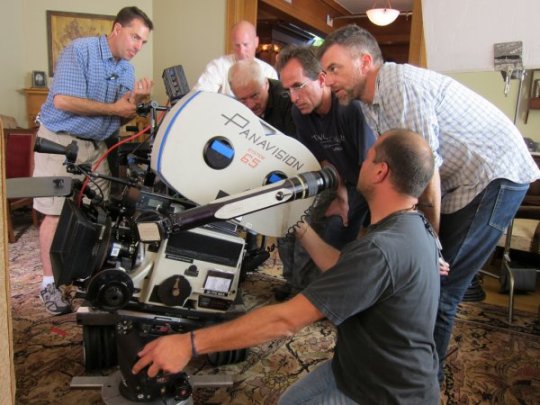
Freddie Quell, Navy Man at Sea
The opening shot is of aqua blue water behind the back of a ship, which is also the dominant color in the palette of the film and the color I think of when I think about the film. Johnny Greenwood’s score crashes in and then we see the first shot of Freddie Quell in a bunker with a military helmet on. I can’t remember where I read it but Paul Thomas Anderson told Joaquin Phoenix to mimic the monkey in the hot spring from the documentary Baraka for this shot, which also coincidentally was filmed in 65mm. I’m sure it's partly a nod to the film’s use of the same stock size, but I also think it's covertly setting us up for Freddie’s animal-like nature...or pointing to the animal-like nature of war and how this particular primate, Freddie, is expected to change his entire behavior, which is attempted by Lancaster Dodd throughout the film.
Simplistically put, Freddie indulges in his animal nature. Dodd denies it. A dichotomy that will also act as a magnet between the two throughout the film and something that I will point out several times.
Also, we wonder if war broke Freddie or was Freddie already broken?
Or is he actually “broken” at all??


We immediately see that Freddie drinks heavily and how he is markedly different from the other soldiers in the group. He takes things too far and is much cruder than the others.
He drunkenly simulates sex with the nude sand woman the guys have made and then masterbates into the ocean. He then lays down and closes his eyes next to the sand sculpture bosom, almost oedipal-like, sweetly spooning its side. This exact same image will pop up again and I believe it holds a large significance in the key to understanding the film.
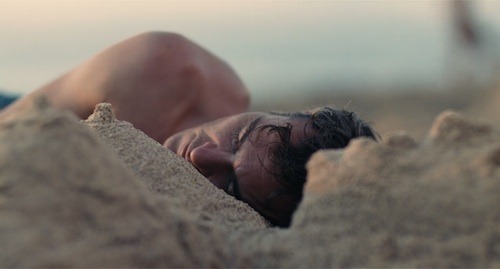
It is next revealed Freddie can make booze out of pretty much anything as he drains what looks to be the ship’s missile fuel into a cup. This also seems to be Freddie’s way of making friends with the other troops, as it is simultaneously announced that World War II is over.
The camera scans the room and shows all the interesting yet shell-shocked faces of the troops as it’s explained to them by their superior they are now able to enter the world. They are told they can now open up their own businesses with the skills they’ve acquired. This doesn’t come off so much as anti-war, but obviously points out that a lot of these men are damaged psychologically, and the military either comes off as naive or willfully ignorant regarding the mental state of the guys entering the world post-service. This is magnified by a comical scene of Freddie sitting in a room with a hardened military psychologist who shows him rorschach blots as Freddie interprets every single one as extremely sexual.
Phoenix is amazing in these closeups and the camera is able to hold on him for long periods of time. This was after his fake retirement from acting and I think he was hungry for this film. His face is gnarled with lines. He has this mumble that’s slightly distracting but makes you lean in as he moves in and out of the camera’s shallow depth of focus. This film has so many closeups and doesn’t include the long steadi-cam and dolly shots like in Boogie Nights or There Will be Blood.
The comical scene is followed by a sad scene showing us that Freddie has some real psychological pain. He talks little and very uncomfortably to another military psychologist about his family and an old sweetheart. Freddie mumbles, “you can’t help me” and later sarcastically says, “thanks for the help”.
Later on we wonder if Dodd gives him real help opposed to these psychologists.

Freddie Enters the World
Freddie has a job as a photographer in a department store. The portraits look lovely.
The song underneath during this scene is perfect (”Get thee Behind Me, Satan” by Ella Fitzgerald).
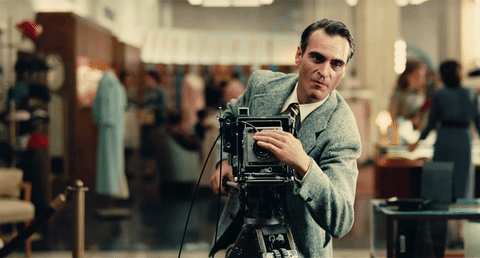


Freddie flirts with a woman that models clothes for customers. He later then mixes some of his potion in a photo-chemical room like an Alchemist. They both drink from the flask and then kiss. She shows him her breasts. Freddie asks her to go out that night, which cuts to Freddie passed out drunk at the restaurant table and the woman annoyed.
The next day Freddie is hung over at work and gets into a fight with a large male photo client. Freddie comically runs from the man and throws various items at him while dodging and weaving behind columns. The camera covers the commotion in wide shot in the department store so well! Then Freddie does something peculiar and funny by grabbing the hand of the model (his date from the night before) like he’s leaving the job and she’s coming with him. She looks at him baffled as they hurry out.
Music comes in perfectly here (once again) with a jagged discontinuity of woodwinds which takes us to Freddie now working in a lettuce field in Salinas, California. The shift to this new, vastly different environment is dreamlike. Freddie continues to make booze and gives some to an older man that Freddie says looks like his father. The man gets ungodly drunk and Freddie is run out of the work group after being accused of poisoning the man, which leads to one of my favorite shots of the film. It is a long tracking shot of Freddie running through a foggy field away from the workers chasing him. I liked it so much I tried to slightly copy it while shooting a silly annual family short film in a cotton field in Texas, also running away from farmers.
And worth mentioning (assuming my short film is worth mentioning), I remember reading somewhere that Paul Thomas Anderson read about the life of John Steinbeck (from Salinas, CA) and incorporated some of the stories in The Master.
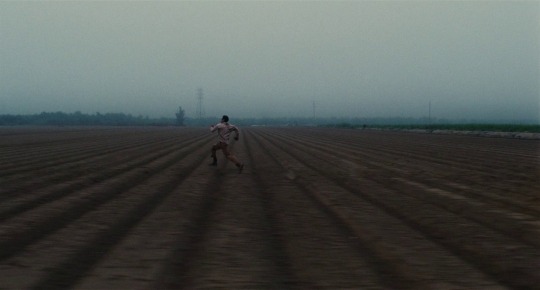
The Master (2012) Paul Thomas Anderson (Panavision 65mm)

The Jackel (2016) Cory Aycock (Canon 7D Crop Sensor)
Freddie Meets “The Cause”
Next, it cuts directly to Freddie walking on a dock, looking cold and dejected. In the distance is a boat docked with a lively party and warm lighting. Music plays and we get our first glimpse of Lancaster Dodd. He dances charismatically with his wife in the middle of an admiring group as Freddie, the misfit loner, decides to sneak onto the boat. The boat is then shown setting out to sea, which looks to be departing from San Francisco under the Bay Bridge.
The next morning, Freddie is hungover and has a humorous conversation with Lancaster, the leader of “The Cause”. Such a great opening scene with these two and Phillip Seymour Hoffman is so great in this role. I think it’s his best performance...but I’m biased.
As mentioned, the conversation is humorous, but not funny-haha. Again, I will try to explain as best I can what I feel when watching some of these scenes... They talk in such a way, not necessarily about funny stuff, but they are such characters and there’s such chemistry it puts a smile on your face. You see the inner-game they are both playing and it’s delightful to watch. They are opposites, which creates this lively synthesis and makes you laugh sometimes, but also gives you such a large mindscape to enter during these rich, concentrated dialogue sessions.
In this first conversation, Lancaster and Freddie both mention that the other seems familiar, which comes back later. Their association is sweet yet ridiculous at times. A likable naivety exists, but also a sense of intrigue and darkness lies underneath.
Dodd tells Freddie, “I am a writer, a doctor, a nuclear physicist, a theoretical philosopher...but above all I am a man...A hopelessly inquisitive man, just like you.” And shortly after calls Freddie a scoundrel, but asks him to make more of his secret booze.
A young Rami Malek, Clark, pops up next in the film and is marrying Lancaster’s daughter, Elizabeth. The first interaction we see between Hoffman and Malek feels like a Tom Cruise-like stareoff. Malek stares until Hoffman ducks his head in slight awkwardness. This trivial detail always catches my attention and I’m not sure why.
Lancaster gives a speech after the ceremony in triangular blocking. This is my favorite speech of Dodd’s in the film. He is at his most charismatic and funny here, in my opinion, and touches on some of the philosophies of “The Cause” in symbolic terms.
He talks about lassoing a dragon and then teaching it stay, then roll over and play dead. I’m almost positive this serves as a metaphor for taming the ego and/or reactionary mind, then learning how to navigate life playfully following this “enlightenment”.
Freddie shifts in his drunkeness from confusion to laughter while continuing to compulsively drink all the alcohol in sight counter to the simultaneous speech.
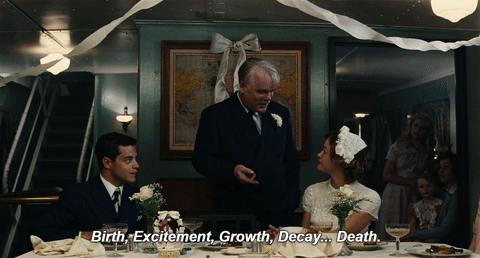
Although, Lancaster loves Freddie’s booze and, again, secretly asks for some after the speech. Freddie’s process of procuring this solution is somewhat like a mad alchemist and shown multiple times in the film. To me, this could metaphorically point to some type of alchemy forming between the two opposite characters considering the psychological and metaphysical tone of the film. It is also revealed the next morning by Amy Adams’ character, Peggy (Dodd’s wife), that Freddie inspires something in Dodd and he has been writing much more since Freddie showed up. Peggy has asked Freddie to sit with her at breakfast, possibly to see what it is about him that could possibly spark this insight in her husband.
Despite this, I don’t think Peggy sees anything special in Freddie and doesn’t understand their relationship for the remainder of the film. Actually no one, besides maybe Elizabeth, sees anything worthy in Freddie at all other than Dodd. I believe this is because Freddie fills a unique gap within Dodd.
I will expand on this more later, but to me it’s obvious Freddie is filling the gap of the id.
Freddie is a scoundrel, an open drunk, a philanderer and a wanderer. These are things Dodd isn’t. He forbids himself of being this and Freddie is counter to this persona of Dodd’s, who is a leader, married and always ON. He is relied upon by his followers, always maintaining his status as prophet for the cult...perhaps the superego.
Soon it is revealed there are “processing” sessions occurring on the ship, recording “past lives”. Everything is being put on tape of what people are saying during these sessions. Freddie humorously navigates the ship during all of this. At one point he sits at a table and puts on some headphones and it’s Lancaster’s voice deliberately stating,
“We are not animals.”
“We are not a part of the animal kingdom.”
Simultaneously, Freddie looks across the table at a young woman and passes her a dirty sexual note. She goes back to work as Freddie watches her. The sun behind him shines through the window and perfectly peaks behind Freddie’s head.
This is what I meant at the beginning of the post...the film is showing you something regarding the ideas it is trying to express. In this moment it’s not necessarily just in the face of the character, but in what Dodd says in the headphones in direct opposition to Freddie’s sexual note and then the sun winking at us from behind.
For some reason, it makes me cringe to analyze some of these moments... demystifying and deflating the “magic” of these details.
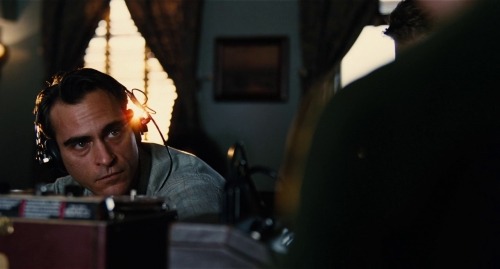
The distinction of “animal” pops up periodically a few more times in the film on the account of Dodd. Again, Freddie (the animal) and Lancaster (the divine) forming a fully whole being.
Now, at the 36 minute mark, the best scene between two actors sitting across from each other at a table I’ve ever seen. It reminds me a bit of the scene in Persona where the two women sit across the table from one another when they meld. They also repeat the dialogue here like in Persona and Dodd dresses down Freddie similar to Alma’s dressing down of Elisabet. The face lighting in this scene is also similar, half-lighting the characters but in a dark Charlie Rose-like room directly counter to the white background in Persona.
The scene begins by Freddie being processed after a drink with Lancaster. Lancaster asks him probing questions about his life and records it. The scene is funny, dark, raw and nuanced. I can’t say enough about this scene, there is so much here. Phoenix moves and looks around. Hoffman stays still, centered, not breaking eye contact.
The first time around, Freddie doesn’t take it seriously and farts in the middle of them talking. Lancaster playfully calls him a “silly animal” and ends the processing session soon after by turning off the recorder.
Freddie seems disappointed and wants to do it again.
Lancaster sets up the rules this time and tells him he is not allowed to blink during the questioning.
Freddie agrees.
In somewhat Mesiner-like fashion they continue the exercise in a long closeup on Freddie. Phoenix is amazing here and at one points slaps his face multiple times after he blinks.
They start over.
Tears roll down his face.
Apparently Freddie is severely troubled by his family past and recalls a sexual relationship he had with his Aunt. Then he reveals he was in love with a girl in his hometown named Dorris. It beautifully cuts from the black, heavy room to a bright sunny day and the white house where Dorris lives with colorful flowers in front. This is a beautiful contrasting cut by Anderson transporting us.
Also, worth pointing out, is the contrast of how silly the scene started with farts and laughter, then taking us to this this deep, heavy pain within Freddie.
youtube
This is a unifying scene for Freddie and Lancaster. And despite what we think about the legitimacy of the cult, some type of deep psychological progress with Freddie is being made here...a progress that was not even close to being accomplished with the military psychologists.
Or is this “progress”?
Feels like it.
As Freddie comes back from the flashback, it cuts to the aqua blue water again, similar to the opening shot of the film, perhaps personifying Freddie’s current mental state. The color of Freddie’s shirt also matches the color of the water.

Again, there is a charming naivety within Lancaster regarding “The Cause” during his far-fetched final questioning lightening the mood before the two have a drink and smoke a Kool together.
youtube
Funny outtakes at the end of the scene.
Obviously, Dodd is modeled after L. Ron Hubbard, but I don’t think it's a nasty rebuke or hit piece, nor is it an exact replica. I read Anderson and Tom Cruise remained friends after Anderson showed it to him. If one thinks it’s mainly a film about Scientology then they are absolutely wrong. It’s evident Anderson loves these characters in spite of all their flaws and complications. Dodd remains a believer of his own philosophy throughout the film, which I think keeps him likable. You also believe throughout he wants to help Freddie, even though some of that motivation may be ego-based or material for his writing.
He is misguided at times but cannot be broadly painted good or bad and does not come off as maliciously pumping out nonsense solely for monetary gain. You believe he believes.
Sea-Legs to Landlocked
The ship now arrives at New York City and the group attends a fancy party at a home. You get the feeling this new spiritual movement is in vogue. Freddie goes straight for the booze and also begins stealing random stuff around the house. Lancaster schmoozes, then is shown performing a processing exercise for a woman laying on the couch for the party crowd.
This last time watching, I got the feeling Dodd was curious what she would say and that every session he conducts he secretly sees as an experiment, collecting more data for himself rather than having a fully realized philosophy or completed methodology.
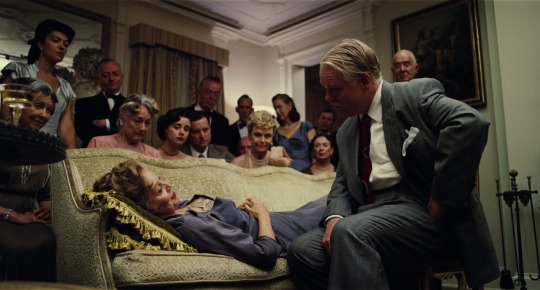
I’ve read Dianetics, so I do believe I have more insight into what’s going on in some of these scenes than a regular viewer. Although, I also believe the information is already there in the scenes if one pays close enough attention. And I’ll say it again, “The Cause” is not a carbon copy of Scientology. But, to generalize, the quest of both seems to be the same...to reach a state of “perfect” (or “clear”) by cutting through past traumatic memories and lifetimes (when the “analytic mind” was unconscious) in order to tame the current reactive mind.
After processing, the woman on the couch talks about her past life and Dodd answers some of her questions. Then, a naysayer from the party verbally challenges the legitimacy of Dodd’s claims. "The Cause” is no longer confined to the vacuum chamber that is their boat. Dodd raises his voice in anger and Peggy looks visibly rattled as well. Lancaster eventually loses his cool after the naysayer continues to not back down and calls him a “Pigfuck”, which makes me laugh every time. This is the first time we see Dodd lose his composure in the film. Freddie is observing off to the side and throws a tomato at the guy, probably something Dodd wishes he could do. The party guest is obviously convinced there is no way to have a logical discussion regarding “The Cause” with Dodd and he’s right.
A quick aside and personal story...the actor playing the Party Guest Naysayer is named Christopher Evan Welch. I briefly worked backstage at the Mark Taper Forum in Downtown Los Angeles and Christopher was one of the actors in a play when I was working there. During one of the shows, while waiting for his time to go back on stage, he sat with me for a while and asked me questions about what I wanted to do in the business and where I was from, etc. I was still pretty green. I remembered him being very nice and authentic. This must have been around the time he worked on The Master because it was in early 2012.
The next year I found out that he died suddenly of Cancer. Hoffman died not too long after.
Very sad.
The full scene is below with Welch and Hoffman:
youtube
Dodd and Peggy are upset now in their room after this fiasco. Dodd writes furiously as Peggy speaks, putting words to their anger, completely flabbergasted by this mild rebuke. The whole group is bent out of shape, shaken by this challenge. Freddie, next door, elects to take Rami Malek’s character (Clark) to the naysayer’s room to rough him up and they do (or Freddie does).
The next day Dodd pretends to scold Freddie, but it’s obvious he’s glad he did it. Again, Freddie being the id that is unrestrained and not held down by social convention in direct opposition to Dodd’s persona. This is where something similar comes in comparable to Scientology, because Scientologists are known to go after naysayers, sometimes aggressively.
The group nows arrives at a large house in Philadelphia belonging to Laura Dern’s character, Helen. Everyone gets out of the car like a big happy family visiting relatives and you really feel the warmth of their community here.
Different courses and talks are being held at the home. Dodd’s daughter, Elizabeth, makes a move on Freddie during one of the talks and Freddie resists. She is a redhead just like his past sweetheart Dorris.
In the previous scene, Freddie was ready to go find the naysayer and Clark seemed apprehensive until Elizabeth gave him a look to go. She seems to like Freddie’s aggression. Plus, perhaps, her father’s closeness with Freddie has something to do with this attraction.
There are moments when Freddie’s face, with all it’s interesting lines, drifts to another place and the sound completely fades as Anderson holds the shot on Phoenix in closeup.
Anderson does tons of planning and research, but you get the feeling on the day during filming he’s constantly looking to catch moments of spontaneity and it seems this choice to hold on Phoenix during this particular moment is a good example.
Freddie continues to get completely wasted alone amongst the others, shown during a party as Lancaster sings and holds court.
The scene afterwards always makes me laugh really hard (no pun intended) when Peggy jerks Lancaster off in the sink while making him agree not to drink anymore of Freddie’s booze. She continues to jerk and tells Lancaster if he’s going to cheat on her to not let her or anyone else she knows find out. Lancaster eventually comes and doubles over as he lets out a few violent pleasurable yelps. This is the closest to the animal side we see of Dodd, and this spirited release may point to the pressure build-up.
Peggy then walks into the dark room where Freddie is passed out and tells him there will be no more boozing. He reluctantly agrees upon waking.
Yet the next scene (the next day) shows Freddie continuing to drink heavily on the sneak.
The Philadelphia Police show up at the house suddenly to arrest Dodd for running a medical school without a license. Dodd gives himself up relatively calmly and in contrast Freddie fights wildly with several police who violently wrestle him to the ground and handcuff him.
Then there is a wonderful scene following, setting up the two protagonists’ contrast in temperament even more when Freddie is hauled in and put in the cell next to Dodd. Dodd is cooly standing still and calmly leaning on his bunk. Freddie is abruptly being dragged in by four officers, and immediately starts DESTROYING his cell as Dodd just observes. Dodd possibly feels this rage inside but has elected to consciously watch his rage rather than react as Freddie is.
Then the two get in a hilarious, childish yelling match after Dodd tries to explain to Freddie why he is how he is. He tells Freddie the cause of his affliction is due to an implant from millions of years ago and that he is asleep (lining up with Scientology). Freddie isn’t having it and says he’s just making it all up as he goes along, echoing what Dodd’s son said to Freddie on the porch right before the police showed. Dodd yells back that no one likes Freddie except for him. Both of the characters have told each other a truth. Dodd then says he’s done with him and begins peeing in his cell toilet. Yet Freddie has no pot to piss in because he’s destroyed his cell, including his toilet. In fact, he may have also destroyed his relationship with Dodd, which would likely mean he will not have a pot to piss in for quite some time.

During a quick arraignment scene with Dodd, the Judge orders him to repay the $11,000 he took and gives him this look that has so much character and makes me smile every time. He cuts his eyes up in this humorously scolding way as he simultaneously hits the gavel. With these great films and directors and actors, you learn that even the smallest scene is packed with so much richness and detail and not wasted!
Dodd is now at the dinner table with his family. Freddie is still in jail. The family open up to Dodd voicing their concerns regarding Freddie. They want him gone. Dodd says they must try and help Freddie get well, perhaps Dodd trying to find a way to keep him around.
Now a wide shot outside of the Philadelphia house. Dodd is sitting up on the porch with several others and there is a little girl on a tricycle in the foreground below the steps. Freddie sheepishly approaches the house after being let out of jail like the prodigal son. Dodd cooly embraces him. The little girl runs up the steps into the house. The two men then start wrestling like little boys in the yard, the two halves reconciled, laughing hysterically.

Freddie Quell, Patient of The Cause
Freddie is now being “treated” and/or administered tests in front of about 30 people in the house to “cure” him. Dodd tells him to go from one end of the room to the other, to feel the wood wall and describe it, then walk over to the glass window, feel it and describe it too. He continues this over and over.
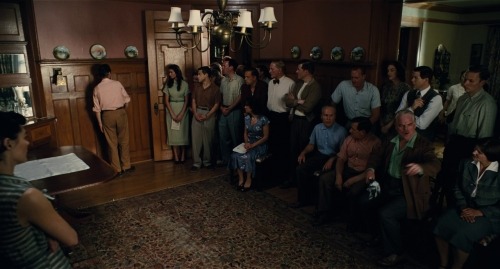
Paul Thomas Anderson is a filmmaker that walks in front of you and you have to catch up. He does this by overloading your mind with scenes that just start and don’t have a lead-up. You have to wait, then you find out. The strength of the music, cinematography and acting lays so much subtext in front of you, it can keep you from following what’s actually happening...which, oddly, I feel is part of what great cinema is.
It’s a great distraction...a created atmosphere so thick that one can be swept away by it if they don’t watch out. For example, the first time I watched this film I thought I had an idea what was happening, then I realized I was wrong, but I had already overthought in the wrong direction so far I became completely lost and just sat there asking myself even more wrong questions in my head about what was going on until the credits rolled. I did the same thing in the same theater with Inherent Vice a few years later.
In the next scene there is another exercise where Freddie sits across from Clark and is not to react to anything he says, including personal insults. He cannot react in any way (laugh or talk, etc) or Dodd will start over the exercise.
This reminds me of the Synanon Cult and their ”Attack Therapy”. The cult used to be located in Santa Monica where the hotel Casa Del Mar is now and I’m sure Anderson had heard of them growing up in LA.
Clark immediately says “Dorris” and Freddie breaks right away, looking to Dodd knowing Dodd told Clark to say this. Dodd replies, “Fail” and they have to start over.
In my opinion (and I think I’m right) Dodd wants Freddie to get to a point of non-reactivity, possibly closer to a state of “clear”.
All the individual’s insecurities are placed in the forefront consciousness (also why they record everything) and then the individual has to face these thoughts head-on until the past is dealt with and the former traumatic memories no longer abscond the self, opening the individual to infinity. The individual must face the shadow in other words, becoming whole by “mastering it”...taming the reactive mind or “dragon” as mentioned in Dodd’s speech at the wedding. Once the dragon is tamed then one can teach it to “roll over and play dead”.
Am I being indoctrinated too??
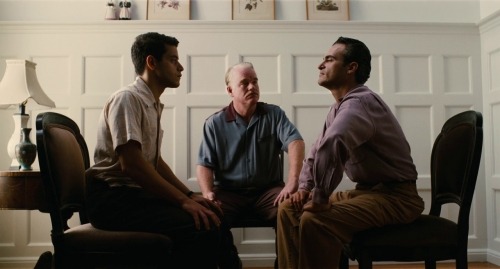
Next, Peggy reads Freddie sexually explicit passages from a book in a Demme-like closeup and Freddie is not supposed to react or say anything.
Dodd excludes Freddie from eating lunch with the group and makes him stay inside the house continuing the exercises where he continually has to walk back and forth and feel the wood wall and window over and over again. Freddie is at a point now where he names the wall and window random things like “moss”, “rocks” and “barbed wire” as he touches them.
My guess is this is an exercise to break down his sense of language....or just break down his mind, because it’s obvious to Dodd he needs to be broken down. I also think Dodd is using this as an experiment for his methods to see what “works”.
He watches from outside as Freddie, alone, continues to walk back and forth. The camera pushes in on Dodd and his expression is one of curiosity as well as remorse, yet still barks out orders, “Back again!”.
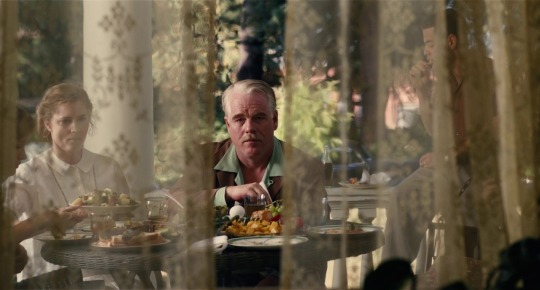
Shortly after, he explains to Freddie that it is a slow, hard process and Freddie looks mentally exhausted.
But, eventually, Freddie starts making progress and is becoming stronger.
Is it really working?
Rami Malek (Clark) is so monotone and annoying here, it really shows Freddie has to be strong to take his insults during the exercises. Peggy even shows compassion for Freddie at one point, one of his biggest naysayers throughout the film.
To shift to something technical for a second, I love how the flicker of the film looks in these closeups on Joaquin Phoenix! You can really notice it in the 4K Version. I also remember being very aware it was shot on film while watching the 70mm version at the Egyptian. I know it’s very cool to like film, but I really do authentically enjoy the look of it.
Freddie now does the wall/window exercise with manic energy. There is one moment when Joaquin Phoenix is jumping up and down and almost hits his head on the chandelier’s metal point...and it looks as though Hoffman gets out of character for a sec to block Phoenix’s head that narrowly misses it.
Freddie is back feeling the wall like he has hundreds of times, then goes over to the glass again, feels it and deeply says he can touch the neighbor’s plants...the stars...anything he wants...
This is not a big moment magnified by a music cue or closeup, but Dodd says enthusiastically “End of application!”
Freddie has succeeded in completing the exercise.
Perhaps Freddie has now transcended and touched infinity in Dodd’s opinion, realizing he can touch anything he wants (mental freedom), seeing the infinitude in something simple and ordinary like a glass window. Perhaps he has gone through the iterations of the exercises enough to become “clear” (the word “clear” is never used in the film).
Dark, foreboding music now comes in during a shared hug between Lancaster and Freddie.
In my opinion, the music foretells the bleakness of certainty Freddie is 100% cured.
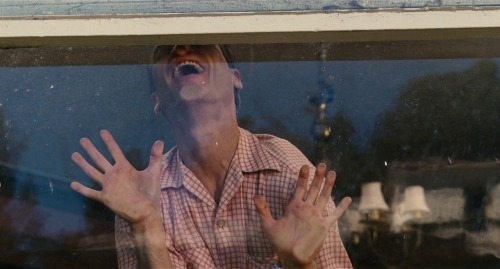
In the next scene, Peggy announces that Dodd’s new book will be presented in Phoenix, Arizona. After watching a few times, you realize that the work done with Freddie was most likely the catalyst for Dodd finishing the book after administering all the exercises. The film obviously doesn’t come out and say this directly, but we know Freddie has inspired Dodd’s writing, his son earlier revealed that Dodd is just making it up as he goes along and this announcement about a new book comes directly after Freddie “successfully” completes the tests. Also, is it a coincidence the city picked for the new book event is the last name of the actor playing Freddie, as well as the symbolic mythological bird that rises from the ashes after a rebirth?
Dodd and Freddie now are at a remote, desert location I assume is outside of Phoenix. They dig up Dodd’s unpublished work that had been buried. Lancaster carries a gun and looks around to make sure no one’s watching or, maybe, if a magic event might manifest. The score by Johnny Greenwood here is amazing. Again, with the two characters in this scene there is a wonderful naivety regardless of the ridiculousness of digging up this essential manuscript for “The Cause”. They are like two kid soldiers out in the great beyond full of wonder and purpose. And the shirt Dodd is wearing in this scene is hilarious.
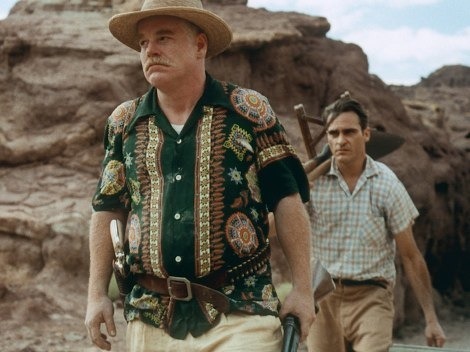
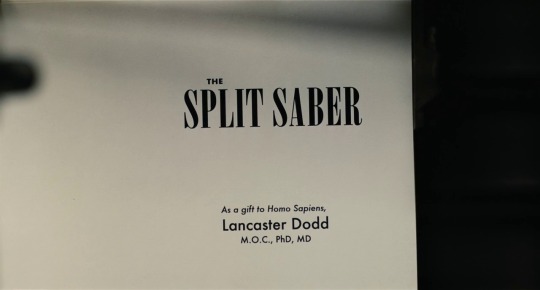
“The Split Saber” is printed on the press.
Freddie takes pictures of Dodd, which are funny and sweet.
I’ve included a pair of photos below that look to be influenced by photos taken of L. Ron Hubbard.
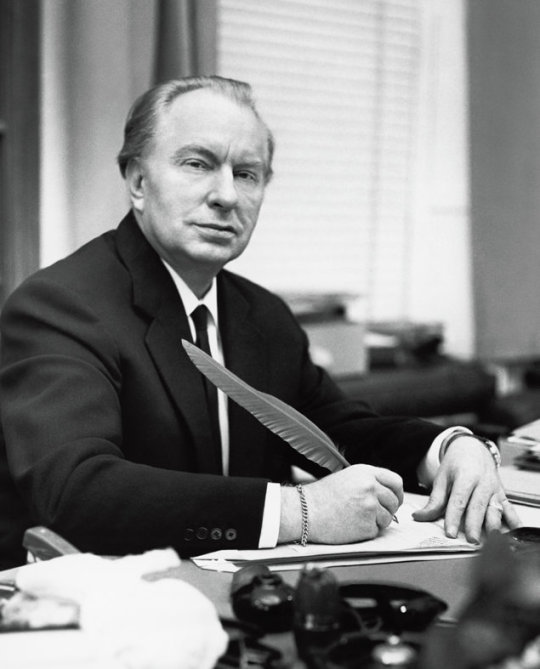
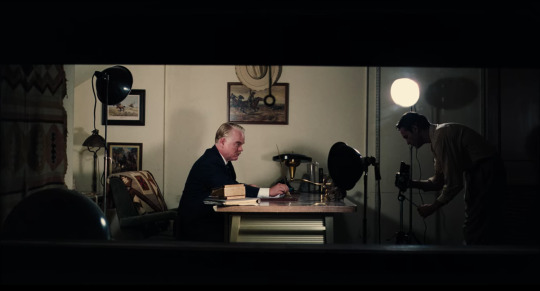
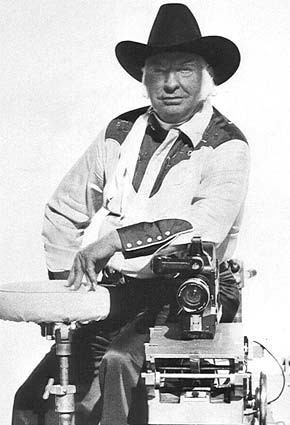
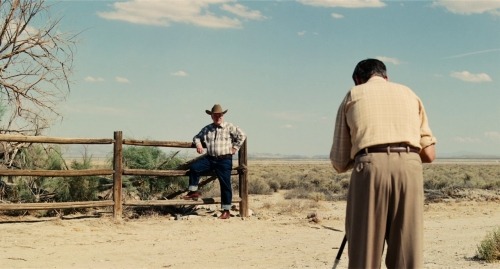
Everyone is gathered at the book event in Phoenix now. Dodd sits in a side room and is visibly nervous. There is a church vibe to the event. The Master (Dodd) comes out on stage to cheers from the crowd. Freddie sits in the middle listening intensely with a yearnful look on his face, perhaps hoping Dodd has a huge secret to reveal. Unfortunately, Dodd just basically says some of the same stuff he’s said before and Freddie looks let down.
Anderson’s closeups on Phoenix in shallow depth of field continue to be revealing and look magnificent!
Freddie paces afterwards behind the stage, looking lost, angry and confused. As you look at him, his pants, shirt and shoes are way too big. Maybe because he had to borrow some decent clothes from Dodd. Phoenix walks with Freddie’s unusual gait like a wounded clown. A friend of The Cause from New York, Bill, who we’ve seen before, reveals to Freddie he thinks the book stinks. Freddie asks Bill to go outside with him and just completely snaps and slaps Bill hard multiple times. There is something comical about this. It’s as if Freddie’s been holding this monster at bay and then just releases it all on poor ole Bill. Freddie has a history of lashing out at naysayers of The Cause but I don’t believe this is the main reason for the attack. I think Freddie now knows he is not “cured” or “clear” like previously thought. I think the lack of answers he felt he was going to get from Dodd’s speech and book pushed him to this, knowing deep down Dodd doesn’t have all the answers like he expected.
In the following scene, Laura Dern’s character sweetly approaches Dodd sitting alone on stage after the event. She confronts him about something he has changed in the book regarding the processing and seems very confused. Dodd has a comically loud, insecure outburst displaying his lack of patience and also his unacceptance of criticism.
Obviously, Freddie and Lancaster both simultaneously react harshly when The Cause is questioned despite the contrasting prior exercises practicing non-reactivity.
Freddie Runs
Now Freddie, Lancaster, Clark and Elizabeth drive a car and a motorcycle out to a deserted lake bed.
On a personal note, I shot my latest short film’s biggest scene in a lake bed very similar...so similar I had to look it up online to see if it was the same one.
It was not.
Anyway, I remember in Roger Ebert’s review he seemed to be perplexed by this scene and what it represented. I just think Dodd decided it would be a good idea to get away and blow off some steam with a motorcycle after the stressful book event.
I personally really like this scene. It’s funny, it’s visually interesting and there is a danger to it.
Dodd explains the game is to pick a point and then drive the motorcycle to that point.
Dodd does this first.
Now it’s Freddie’s turn.
Freddie takes off and speeds away. Dodd does this funny thing in closeup where he puts his hand up to block the sun, watching Freddie ride, then goes to say something, stops himself, then eventually ends up yelling, “Freddie!!”
It’s something so small but Hoffman makes it so interesting and humorous and it’s hard to explain why.
In my Short Film, I start my scene at this similar location with my hand up looking in the distance, as a nod to this scene with Hoffman (3rd photo).
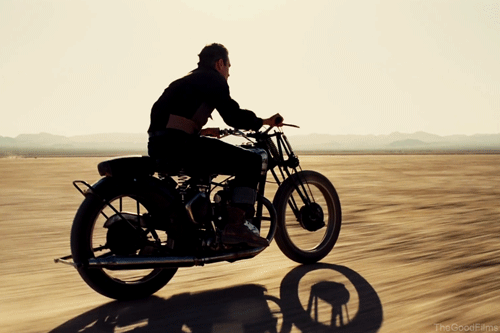
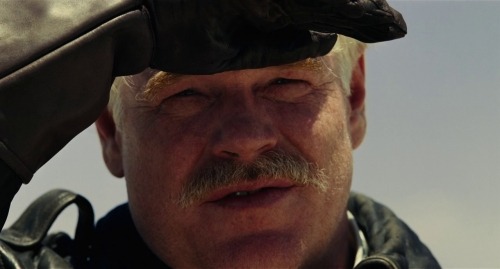

Freddie is long gone with the bike.
Dodd’s best friend has left him.
“No Other Love” by Joe Stafford comes in perfectly here. It’s such a melancholy end to the scene and I just feel the song compliments it so eloquently. It’s my favorite song of the film because of this and is in the trailer.
Freddie goes to the house of the girl he loved before going to the war. He finds out Dorris is married now with kids and lives in Alabama. He finds this out by talking to Dorris’ mother.
Freddie missed his shot.
The scene is slightly comical due to the dichotomy between the sweet, mannerly mother and Freddie’s pressing roughness and gnarled face. It’s something I always notice and enjoy watching.
We are transported now to Freddie asleep alone (most likely drunk) in a movie theater. You can hear Casper the Friendly Ghost in the background and see the flicker of the big screen on the sleeping Freddie and the empty seats around him. There has to be a reason for the choice of Casper the Ghost, but I have no interesting theory why.
A theater concierge brings a phone to Freddie after waking him up.
It’s Dodd.
Either this is a supernatural moment in the film in which Dodd just happens to know where Freddie is (because they’re “tied”) or Freddie is being followed Scientology-style. Freddie nor us know how Dodd knew he was there.
This made me think of an interview (somewhere) with PTA saying sometimes details in a film don’t have to make sense or have a definite answer.
Dodd asks Freddie to come to England where he currently has a school. He says he misses Freddie and says he can cure him.
My guess is he’s had someone find and follow Freddie...unless the Casper the Ghost reference somehow hints at the supernatural spiritual “tie” Dodd mentions between him and Freddie and Dodd just “knew” he was there...but my theory connecting this may be too far of a stretch.
On a Slow Boat to China...
Freddie is once again traveling on a boat, which has become a motif...
Freddie adrift.
We see the recognizable deep aqua water paired perfectly with Greenwood’s score. The music, once again, adds so much here, producing a sense of longing and beauty.

Freddie arrives at the school looking haggard and gaunt. Jesse Plemons’ character (Dodd’s son) greets him with a wry smile of familiarity which soon turns to concern after examining Freddie’s appearance. They walk down the burgeoning school hallway to Dodd.
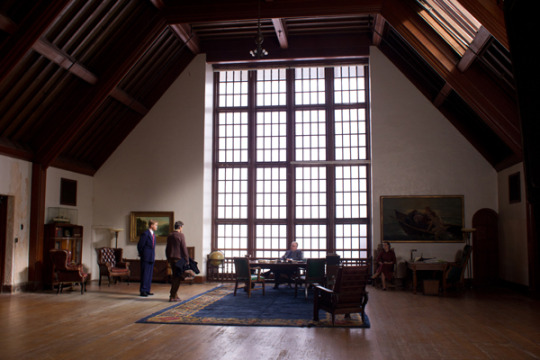
Freddie enters with wild eyes to Dodd’s grand office. Peggy sits off to the side and Dodd at his desk. Freddie hands Dodd some Kool cigarettes and they hug. Peggy immediately asks Freddie if he’s drunk, says he looks sick and says he’s not interested in getting better. She storms out. The two men share a smile after she leaves, but Dodd’s hands are tied.
It’s worth mentioning Amy Adams (as Peggy) was also nominated for an Oscar for her role and plays a sort of antagonist to Freddie. Dodd’s book was not well received by close peers and perhaps this was due to Freddie’s influence and she saw this, maybe encouraging Dodd to cut ties because of Freddie’s negative influence and lack of dedication to The Cause.
You can see here Dodd loves Freddie very much.
This is scene is so good!
There is a lot of heart and power here in these closeups. Dodd loves Freddie’s freedom. Freddie depends on Dodd for structure and meaning and a place to stay.
Dodd then says my favorite lines of the film,
“For if you figure a way to live without serving a master...any master...then let the rest of us know, will you?”
With the risk of over-explaining, I’ll dive in with my thoughts...
Dodd seems to think everyone has a Master...an obligation, a social role and something transcending mammalian daily life to quench existential and spiritual need. But does Freddie have a Master? I think Dodd thinks if anyone might know how to live without one then it would be Freddie.
Would this make Freddie “The Master” and not Dodd?
Who is the prophet?
Dodd calls him “a man navigating the seas, going wherever he pleases, paying no rent” and you realize Freddie’s steadfast gaze reveals a mastery of something...especially according to Dodd.
The culmination here of bringing to consciousness the pair of opposites in character form proves to be the thesis of the film. This is not a film with a traditional story (perhaps that Ebert hoped to understand clearly) but a special situation between two men and how they fit together like puzzle pieces...two sides of the same coin...to the point where one might think it’s possible they did in fact know each another in a past life. Dodd mentions this upon meeting Freddie for the first time and Freddie agrees there is a mutual recognition.
Two inverses folding into one another creating something whole, for better or worse.
Dodd goes on to explain that he finally figured out where they met in a previous lifetime and says if they meet again in the next life they will be sworn enemies. Again, there is a lovely naivete here...and said with such earnestness. And as mentioned before, it is easy to like Dodd because you believe that he believes what he says, even though we, the audience, are speculative. Again, this is not a film about trying to figure out the legitimacy of a cult but about two men trying to navigate the world the best they can.
Dodd goes into great detail about their past life association.
In appearance, Dodd is so regal, reserved and groomed...so certain!
Freddie is mangled, gaunt and lost.
Dodd now begins to sing, which is funny and heart-breaking at the same time. It’s as if this is the best way he knows to express how he feels in the moment.
I remember the first time I watched this film in the Laemlle Theatre and there were a few laughs here. I also remember watching this part when I was staying with my Dad and Stepmom one Christmas on HBO. I just flipped through the channels and saw this scene and stopped to watch. My Dad had never seen the film but watched this part with me and also chuckled a bit...not in a “that’s ridiculous” way, but in a concentrated way due to the intensity of Hoffman’s performance here.
As the scene carries on, I again begin to wonder if these two really did meet in a previous life. Or maybe it’s just so powerful because they both BELIEVE this past life was real, believing in a pre-destined reason for their association in this lifetime.
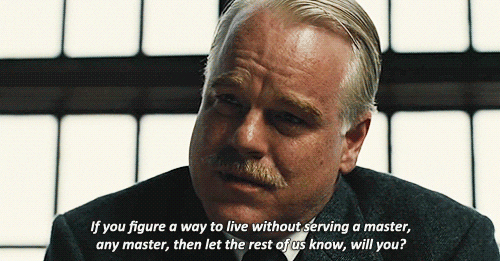
Freddie has now left Dodd.
He is out of the office walking alone in a row of trees leaving the school. He goes to a bar, meets an English woman and they go to a room and have sex. Both are fully naked in a very human way lit in natural light. Two hominids in an animalistic act following the parting of Dodd who rejects the animal side for the fully divine.
He playfully tells the woman he has to ask her some questions and she can’t blink. The processing scene is obviously still with Freddie and obviously PTA is aware of the power that scene held to call it back. She plays along for a little bit but laughs quickly and breaks.
Now waltz music plays, circling back to Freddie on the beach where he was at at the beginning of the film, laying next to the sand woman in oedipal longing.
Did he dream all of this??
I have watched the film around 10 times and have never thought about this as much as I have this time around. Of course, it’s ambiguous, but it could very well be true. And he did mention to Dodd in the England office he had a dream, but never got a chance to explain what the dream was. Dodd then went on to talk about their past life association.
Anyway...the interpretation that I had come to previously was that Freddie has gone on this journey, but has ended right back where he started, meaning no amount of processing or methods to change his behavior can change his determinism.
He is what he is.
In fear of repeating this too much (which is never overtly stated in the film) humans cannot escape the fact that they are also of the animal kingdom. I believe the first shot of Freddie in the film mimicing the monkey introduces this idea. And Anderson doesn’t seem to care if the audience gets this first, coded, specific detail, but I believe there are enough clues throughout the film to make the animal comparisons to come to the same interpretation, as I’ve pointed out above multiple times to really bring my point home.
Also, Freddie cannot escape how he may have suffered in the war, nor the trauma of his childhood, nor the loss of his sweetheart, Dorris, as he lays next to the breasts of the manufactured woman made of earth as the tide rolls in and out.
This is still with him in his memories, shaping his present, whether he deals with it or not.
And, more broadly speaking, perhaps all of this striving us humans engage in for self-mastery, and the constant modifications to ourselves to reach some pinnacle of “perfection”, we have built in our own minds is futile. We just go in this big circle, this journey and we end up right where we started.
Are we “better”? Are we different? Are we “cured”?
Maybe.
Maybe not.

To conclude, I’d like to mention that I’ve discovered pre-determination has loomed large in all three films I’ve written about on this page. I’m not sure if it’s me or the films, but it has been the big picture idea I’ve come to on all three. It also makes me think how cinema itself is made possible, by showing and shaping a world, often overtaking the individual characters’ will.
I believe this tells us something vital about our reality...cinema expressing transcendent ideas that can swallow up egoic identification, which is why films like this stick with you, pointing to something larger at play within the individual rather than solely the idea we have of ourselves.
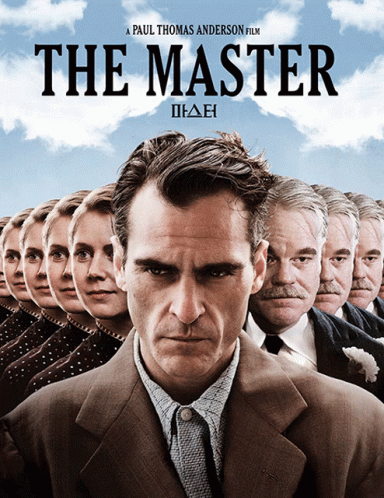
#the master#paul thomas anderson#phillip seymour hoffman#joaquin phoenix#70mm#film analysis#film essay#favorite film#cinema#citizen aycock
0 notes
Text
Throw a Watching to your Witcher.
So it has come to pass, another Netflix Drama series: The Witcher. For those unfamiliar, this new venture comes courtesy of one Andrzej Sapkowski, a polish writer best known for (drum roll please…) The Witcher series! The Witcher is a kind of dark fantasy series, like Lord of the Rings if it caught a venereal disease from a prostitute and also had an old, nagging injury from some old battle, like say, an arrow to the knee? The Witcher follows the adventures, or misadventures, of one Geralt of Rivia, a Witcher, as he travels the lands seeking to just live his life and do what he can to survive. If you are unfamiliar, a Witcher is a monster hunter, not a witch hunter, who has extraordinary abilities that have been granted to them via a forced mutation, they’ve basically been created to be roam the lands and kill various monstrosities for coin. But let’s get to the point, is Netflix’s The Witcher any good? I have played one of the games, read the books, seen the show(which apparently not all reviewers could be bothered to do but hey, why bother to fully work on something you’re paid for right?!) and after consuming all that media, I can’t say I’m totally a fan, but I can say that the show does indeed make for an entertaining watch for newcomers, and it’s at least better than season 8 of Game of Thrones so there’s a win right there.
As I have said, I’m not a devoted fan of The Witcher, I played the Witcher 3: The Wild Hunt, I couldn’t really play the others because I don’t have a PC. I was interested in reading the books after playing the game and found them intriguing and a nice change of place. But with both the game and the books, I found myself really searching for a starting point which didn’t really exist. The show does actually have a much stronger jumping off point, giving the viewer a good baseline for the series to continuously build around. That’s not to say that it doesn’t have some issues and problems, especially to a newcomer I’m sure. There were plenty of times where I took a trip to the wiki page for clarification or to just understand what some character had said that everyone seemed to think was important, and there are still things that I’m not sure the significance of. The Witcher does succeed at doing some pretty good world building, the monsters and magic system are especially well thought out, though a little hard to grasp. But you can really see that care has gone into this series, the team behind the camera, and indeed the team in front of the camera, really do care about this world and the story that is being told, which is rare for a Netflix series I feel.
*Spoiler town ahead so if you want to know what I feel overall, jump to the end!*
If we want to talk gripes, I have a few but let’s start positive first, this is a rich story! There are so many things going on and multiple layers (like an onion) and the show really doesn’t stumble over itself too badly. A few things that did trip me up was the beginning of Yennefer’s story, why she sucked and then didn’t suck with magic, the girls who turned into eels for what feels like a test, etc. There were some minor quibbles but as the story progressed the true depth of each of the characters shone though. Now, acting wise, I didn’t think I would like Henry Cavill as Geralt of Rivia, I can’t really tell you why, I guess because I just couldn’t see his face as a Geralt but he has a strong opening performance that only gets better the more we see him. Henry is obviously the actor that has read the books beforehand and absolutely loves them, and that pays dividends. I’m not sure if he did all his own fight choreography but man, it looks like he did and during those moments his love for the character shines through in the most minute of details. While I don’t see the same love for their characters as I do from Henry, Anya Chalotra’s portrayal of Yenefer is amazing. The fact that she manages to play Yenefer with a literal crookedness about her before casting that aside shows just how great she is. Anya does a great job owning many of her scenes but I feel like the character kind of stopped getting understandable character development after she met Geralt and her actions become increasingly more contrived. The side actors are all pretty decent, some kind of phone it in, knowing they’re in a fantasy setting where they can say “fuck” repeatedly and not have it seem out of place, while some play to their strengths and deliver really good nuanced performances, although the Ciri storyline has got to be up there for most useless storyline around. Hardly anything answered and really not much gained besides having her occasionally see that everyone sucks in the “real” world.
A weird but for me, ultimately pretty charming aspect of the series that may or may not be a deal breaker for you is the fact that the whole series is told a little out of order. It’s not as tricky to follow as Westworld, but it does make you do some work, and you know what? That’s fine! Working to discover something is kind of a nice feeling, especially when your guesses come true, even halfway so. It doesn’t block everything off behind this grand, final reveal , it just feels a little odd to be seeing events and have characters refer to passages of time in large blocks. The Witcher also succeeds in this by making sure that if you didn’t pick up on some or all of the hints, you don’t feel like a dummy, something which Westworld had no shame beating into me. I certainly think it could’ve been a little more complex with its narrative structure and I know a large group of reviewers and viewers will moan about how it’s unnecessary and that they just want to watch something and turn their mind off and enjoy but you know what? Art isn’t an anesthetic, it’s not supposed to lull you in and put you asleep, it’s supposed to tell something that gets your brain jogging, and while this isn’t a jog, it is a brisk pace for the brain.
Now, time for some proper looking at what may not in fact be too great with The Witcher series and there are certainly a couple things. As I previously said, the Ciri storyline feels very superfluous to me. We don’t learn much beyond the fact that she’s some kind of kid who harbours ancient, primal, magic, which sounds cool until you realize that there’s no payoff for that. Shit never goes down. Sure, Ciri screams and trees blow down, stuff happens but it doesn’t affect the world, I don’t care about that as much as I feel like I should. The Ciri storyline I feel could’ve been saved for the opener of the next season, to show and fill us in on what happened to her between the beginning and end of the first season, then you can throw away as many characters as you want. Dragging her story out without any payoff feels incredibly lacklustre. Another problems is in fact something that I did touch on as saying it was good, the side characters. While the acting involved is good for the most part, I don’t find myself caring about any of them Sure, a couple of them are good and memorable, but on the whole? They all feel like they don’t serve a grander purpose. Whenever characters reappear, they still haven’t changed much and it feels like using them to hide little bits into the hidden narrative layer would’ve been the way to go. The exception to this is Jaskier, who is always brilliant but also helps to give us, the viewer, a character we can relate with who actually does things in this world that change and affect others. It’s disappointing that even my favourite side characters for their amazing acting, like Stregobor, Tissaia, Mousesack, and Calanthe, never really bring something into the fold that I feel gives weight to the narrative, which brings us to my final complaint. The story feels a little dry and meandering, and while that can be acceptable for some episodes and others do help give a better view of the narrative, the episodes toward the end just really bumble about. Geralt hunting monsters or interacting with royalty is interesting and telling, watching Geralt have some kind of fever dream not so much, even if the fever dream is very emotional. Same with Yenefer, when she’s learning magic and fighting off assassin’s and interacting with Geralt? A+, good going, conversely, whining about wanting a choice that SHE made and saying she wants to take it back because she was forced to make it? Not so much. Worse than that, she goes on to protect what she wants to burn down for really no reason that I can gather. Things are interesting but also tedious with her and the world she inhabits.
So, at the end of all this, what are my feelings on the show? Should you watch it? YES! Absolutely. There’re only a couple things issues and they’re all pretty minor in comparison to other shows. The writing and pacing is a little sporadic and while the acting on the whole is good, with the except that some of the minor actors phone it in so they can say “fuck” in the same sentence as saying “the elves” or “butcher of Blaviken”, then you’ll be fine. Sure, a lot of those characters have weird motives or no motives and people bitch and complain about things that I really don’t think is relevant but that’s fine. My two biggest gripes are with a lot of the characters just being absolutely unlikable for the sake nothing or something I don’t understand, even after delving into the wiki, and the Ciri plot which could’ve been touched upon in the season 2 premier and it would’ve had more weight. The acting is fairly rock solid with notable love going out for Henry Cavill, Anya Chalotra, Joey Batey, and Anna Shaffer. The fight choreography is some of the best I’ve seen and I really hope some kind of behind the scenes look at that is shown. So, all-in-all, I’d say a 7/10 to 7.5/10, and since a lot of people will generally think that’s bad, I’ll add this: I’m definitely gonna rewatch The Witcher, probably 2 more times (despite the “Netflix drama time commitment”) and I don’t think I’ll be bored or won’t enjoy myself! Give it a watch and let me know what you think!
0 notes
Text
What’s missing from our list of 2018’s best TV?
As we wind down 2018, our best-of coverage continues with the following question:
What’s missing from our list of the year’s best TV?
Kyle Fowle
There’s hardly reason to argue with almost any year-end list these days because of the sheer number of good TV shows out there, but I’m genuinely surprised that HBO’s High Maintenance didn’t make our list. The second season of the HBO run keeps with the anthology-esque spirit of the show, but it goes deeper in ways surprising and touching. So, there’s still the random characters that populate New York and The Guy’s life, but what’s different this time around is a narrative through-line involving The Guy’s ex. That character arc, one of pain and jealousy and moving on, adds so much to a season that’s already achingly honest. Add in the fact that one of the year’s best episodes—“Globo,” reckons with the election of Donald Trump, and the completely indescribable feeling of moving through the world on the morning of November 9, 2016 in a smart, poignant, and stirring way—and you have a season of TV that’s more than worthy of any year-end list.
Myles McNutt
It’s difficult for an established reality show to make it into a best of TV list: Beyond the fact that critical conversation privileges scripted programming, reality shows are built on iteration, and that feels less novel or memorable when we reach the list-making time of year. And I’m part of this problem, because I failed to put CBS’ Survivor on my own list despite the fact that its fall cycle has been absurdly enjoyable for a show in its 37th—not a typo—season. Yes, the David Vs. Goliath theme is profoundly dumb. No, I couldn’t tell you a single thing that happened during the season that aired in the spring, so 2018 wasn’t all great for the series. But something about the alchemy of casting and game-play has created a season with a succession of satisfying twists and turns, reminding us that although we may not instinctively think of it as list worthy, a reality show 18 years into its run can still create some of television’s best drama and comedy. (I’ll never hear the name “Natalie” without laughing now.)
Eric Thurm
Making reality TV really pop is an artform: There are hundreds of hours of interactions to film, comb through, and precisely edit into a narrative that will make sense, delight viewers, and feel just slightly off, like humans hanging out too many years in the future to quite make sense to us. So every year, I become more and more impressed with the reigning queen of the genre: Vanderpump Rules. The sixth season is one of the show’s best; over half a decade in, Vanderpump Rules remains an examination of fame, misfired charisma, and the terrors of tenuous social status that would put any 19th century novel to shame. Whether it’s Jax Taylor maybe falling in love with his reiki master Kelsey while his relationship with Brittany Cartwright festers like an untreated sore, Stassi Schroeder’s then-boyfriend creating a new god tier of social faux pas by grossly hitting on Lisa freaking Vanderpump, or the slow-moving car crash of James Kennedy ignoring the “best friend” he was clearly sleeping with (not that anyone else cared), Vanderpump Rules remains mesmerizing. The cast of past, present, and future SUR employees are stuck with each other forever, and it’s incredible. It’s not about the pasta; it’s about dread.
Clayton Purdom
Aw, come on—am I the only person who thought Maniac was one of the year’s best? Well, apparently. Cary Joji Fukunaga’s 10-parter was far from perfect, but it aimed admirably high, wrangling spy action, elven fantasy, late-capitalist malaise, intense family dynamics, corporate psychotherapy and more into a freewheeling caper across several levels of reality. It also got career-best comedic performances out of Emma Stone and Justin Theroux and a fine, sad-sack turn from Jonah Hill. And Ben Sinclair! Not all of its ideas stuck, but it was messy, smart, and light in a way I’d love to see more sci-fi attempt.
Dennis Perkins
I’ll admit, I was worried going into the new, Mary Berry-less (not to mention Mel- and Sue-less), Great British Baking Show era, but I am pleased as rum baba to say that this enduringly endearing and delightfully stressful baking competition series has marched on just as sweetly. Sure, there’s a lingering bitter aftertaste to the great British baking show schism that led to those departures, but not on the Great British Baking Show itself, which rides remaining judge Paul Hollywood’s gruff charms alongside new judging partner Prue Leith and celebrity goofballs Noel Fielding and Sandi Toksvig without missing a trick. The key ingredient to this series’ success has always been the utterly generous heart that goes into every episode, and Fielding and Toksvig, if anything, seem more emotionally invested in the fates of the contestants they have to expel, one-by-one, from the show’s famous tent. And if Hollywood and Leith continue the necessarily merciless judging of soggy bottoms, overworked and under-proved doughs, and the occasional collapsing confectionary disaster, they, too, provide warmly constructive criticism rather than the traditional reality show scorn. A series—as the departed Berry was wont to say—“cram-jammed” with delights, The Great British Baking Show remains one of the most cozily exciting TV experiences going. [Dennis Perkins]
Alex McLevy
Maybe it’s the curse of distance that comes from being released way back in January, or maybe it’s simply a victim of the era of Too Much TV, but I’m bummed out to find the Steven Soderbergh-helmed Mosaic failed to crack our top 25. The miniseries is everything you could want in superlative television: a sharply nuanced and well-written mystery, performed by a coterie of uniformly strong actors at the top of their game (longtime character actor Devin Ratray deserves to be getting award nominations for his star turn), and an ace director brilliantly shooting and editing the whole thing into an intriguing puzzle? It’s the one thing I have felt comfortable recommending to anyone all year long who’s asked me what great show they should check out, regardless of individual tastes, and sadly, not a single person to date has responded with, “I’ve already seen it.” (Feel free to ignore the accompanying multimedia app as an experimental lark on Soderbergh’s part.) You’d think an HBO series from an Oscar-winning director wouldn’t need underdog-status championing, and yet here we are. Give it a watch if you haven’t yet—and odds are, you haven’t.
Caroline Siede
Come on you guys, Netflix’s Queer Eye gave us two full seasons and a special in 2018, and we couldn’t even give it a spot on our list?! I get that it can be hard to stump for reality TV when there’s so much great scripted stuff out there, but Queer Eye at least deserves a special award for being one of the most unexpected joys of 2018. The new Fab Five offered an updated spin on the early ’00s Bravo original, emphasizing self-empowerment, confidence, and empathy along with styling tips and home makeovers. Karamo used his vague “culture and lifestyle” assignment to deliver some really thoughtful therapy sessions, Tan invented a whole new way to wear shirts, Jonathan established himself as an instant icon, Antoni put avocado on stuff, and Bobby did five times as much work as everyone else while getting barely any credit for it. Whether we were bonding over tear-jerking transformations or mocking Antoni’s complete inability to cook, Queer Eye was the rare cultural unifier based on something lovely and uplifting, rather than dark and depressing. I’m guessing we’re still going to need that in 2019, so it’s a good thing the show has a third season on the way. Until then, I’ll just be rewatching A.J.’s episode on a loop.
Lisa Weidenfeld
I watched and loved a lot of TV this year, but it’s possible Wynonna Earp is the show I looked forward to the most, and also the one I wish I was seeing on more best-of lists this December. It’s a Western, a procedural, a Buffy descendant, a horror comedy, and probably a few other things as well. But mostly it’s fun. Its wildly entertaining third season was the strongest yet, and featured a potato-licking mystery, a Christmas tree topper made out of tampons, and one of TV’s sweetest ongoing romances—the usual stuff of great drama. The show’s mythology keeps expanding into an ever larger battle between forces far more powerful than its scrappy team of heroes, but it’s the writing and character work that make the show shine. Wynonna may be tough and merciless in her pursuit of victory, but it’s her sense of humor that keeps her human and compelling, and the bond between her and sister Waverly has provided a grounding emotional force on a show with an increasingly complex central plot. There just aren’t enough shows on TV that would work a Plan B joke into their heist sequence.
Vikram Murthi
Even correcting for James Franco’s involvement, which might put people off for legitimate reasons, it blows me away that The Deuce didn’t crack AVC’s main list. David Simon and George Pelecanos’ bird’s-eye view of the inception and proliferation of the sex industry in the United States represents some of the most mature, compelling television of the year. Simon’s detail-oriented, process-focused approach comes alive when examining a side of American culture that functions as a metaphor for everything: gentrification, the rise of cultural conservatism, urban renewal, late capitalism, and, most potently, the filmmaking process. This season, Simon and Pelecanos pushed their subjects toward broader freedoms that quickly revealed themselves to be traps in disguise. Not only does all social progress come with a price, but also it’s limited to those pre-approved by those controlling the purse strings. Yet, Simon and Pelecanos never forget that the tapestry of human experience is neither exclusively tragic nor comprehensively optimistic. Some people discover happiness, and others lose their way. Rising and falling in America has always been a permanent state because social environments and political context circumscribe life-or-death choices. It’s been a decade since The Wire ended, but its worldview lives on through Simon’s successive work: everything’s connected, follow the money, and bad institutions fail good people every damn day.
Danette Chavez
Although the show’s title addresses a certain demographic, Dear White People has so much to say beyond calling out the oblivious and privileged. Yes, Justin Simien’s adaptation of his 2014 film of the same name wears its politics on its sleeve, but they’re right next to its heart. The show is much more a winning coming-of-age dramedy than it is a polemic, and even then, it’s still miles ahead of most college-set series in both style and substance. Simien’s created his own visual language to capture both the intimacy of the relationships among the core cast, as well as the microscope they’re under as black students at an Ivy League school. And I really cannot say enough about the dialogue, which crackles and informs. Season one had such a moving coming-out storyline, made all the more so by DeRon Horton’s vulnerable performance; the new season follows Lionel’s adventures in dating and dorm sex, with hilarious and poignant results. Really, the whole cast should be commended, from Logan Browning, who provides a wonderfully complex center as Sam, to Antoinette Robertson, who may have given the series’ best performance in season two’s “Chapter IV.” Dear White People still makes a point of punching up—at racist and sexist institutions, tangible and otherwise—but many of its most extraordinary moments have come from characters like Sam, Gabe (John Patrick Amedori), and Reggie (Marque Richardson) recognizing their personal foibles. Thankfully, Netflix has already renewed Dear White People for a third season, giving you all a chance to get it together.
Gwen Ihnat
The odd Amazon sitcom Forever had a lot to say about the monotony of monogamy and marriage: Can you really stay with someone happily for the rest of your life? (Or afterlife, as the case may be.) With anyone but Fred Armisen and Maya Rudolph cast as that main couple, Forever might have slowly slid into bland drudgery. But the two gifted comic actors injected a lot of life into the monogamy question, aided by a spirited supporting cast including Catherine Keener, Julia Ormond, and Noah Robbins. Sure, there are some days when you want to talk to anyone but that person sitting across from you at the breakfast table. But who else would discuss with you, ad nauseam, banal topics like the perfect way to spend a half-hour, or the best way to sit in a chair? The standalone episode “Andre And Sarah” makes achingly clear how much finding (or not finding) that person who makes you shine steers the path your life will eventually take, all in a mere 35 minutes.
Allison Shoemaker
While I’d love to praise one of the many things that aired this year that I’m sure to revisit in future—someone else is going to mention Wanderlust, Salt Fat Acid Heat, and the dazzling Jesus Christ Superstar Live In Concert, right?—I feel compelled to bring up a program I’m almost certain I’ll never watch again. It’s unlikely that when HBO snapped up The Tale at Sundance this year, the network was thinking of the benefits of the pause button. Yet it’s a benefit all the same. The debut narrative feature from documentarian Jennifer Fox follows a fictionalized version of the director (played by Laura Dern) as she re-examines a traumatic childhood experience she’d filed away in her mind as loving and consensual, managing to be both gentle and almost unbearably upsetting all at once. Dern’s simple, seemingly relaxed performance belies the nightmare which fuels it, and that pause button may prove invaluable to some—it certainly was for me. The Tale is a film which seems to demand that you witness, rather than merely watch it. Should you need to walk away for a minute, it’ll keep.
Noel Murray
I know, I know: At least once or twice a year someone tells you about some cool animated series you should be watching, and talks about how trippy and ambitious and strangely deep it is. But guys, trust me: You need to catch up on Cartoon Network’s Summer Camp Island. Only half of season one has aired so far (20 10-minute episodes, mostly non-serialized), with the rest of the first batch reportedly set to debut before the end of the year. It’s a show parents can watch with grade-school-aged kids or on their own—a treat for animation buffs, and for anyone who enjoys a the kind of surrealism that’s more adorable than upsetting. With its snooty teen witches, dorky monsters, and never-ending parade of anthropomorphic clothes, toys, plants, and foodstuffs, Summer Camp Island is like a weird old Disney cartoon crossed with an ’80s teensploitation picture. And it is glorious.
A.A. Dowd
Mike Flanagan is a Stephen King guy. You could guess that from his adaptation of Gerald’s Game and from the news that he’s doing King’s Shining sequel Doctor Sleep next. Or you could just watch his work and marvel at how plainly influenced it is by the author’s, at how well it captures that signature King touch—the division of perspective among multiple characters, the interest in history and trauma, the graceful juggling of timelines. There’s much more King than Shirley Jackson in Flanagan Netflix take on The Haunting Of Hill House. The miniseries didn’t scare me as much as it seemed to scare a lot of my friends and colleagues—while well-executed, its jolts were mostly of the familiar James Wan spirits-slithering-up-walls variety. But I loved the intricacy of the storytelling, the way Flanagan moved fluidly from the childhood scenes to the adulthood ones and back again, mapping the entwined lives of these damaged siblings to suggest the way that our past and present remain in constant conversation. (It’s memories, of course, that are really haunting the Crain family.) In the end, I found Haunting Of Hill House a better, more spiritually faithful adaptation of It than the real one from last year. Guess that makes me a Mike Flanagan guy.
Erik Adams
The contents of The Big List demonstrate that it’s a great time for television comedy of all stripes: Animated, musical, workplace, detail-oriented genre parody, surrealist examination of the agony and ecstasy of existence. And while I would’ve liked to have seen some notice for the humble charms of NBC’s Superstore or a nod to that episode of Joe Pera Talks With You where Joe hears “Baba O’Riley” for the first time, I’m surprised that we didn’t heap more praise on another Michigan-set cable show co-starring Conner O’Malley. Like Myles with Survivor, I’m willing to accept that I’m part of the problem: Detroiters didn’t make my ballot’s final cut, despite all the hearty laughs, shoddily produced TV commercials, and General Getdown dance routines (“He’s a general—he’s the best”) the Comedy Central series gave me this year. Sam Richardson and Tim Robinson’s love letter to their shared hometown will always be powered by the stars’ explosively silly onscreen connection, but season two did some stellar work at fleshing out their characters as individuals, whether it was Sam reuniting with an ex to record a sultry grocery-store jingle or Tim (loudly) grappling with the family legacy of Cramblin Duvet Advertising. If nothing else, these episodes proved that when it comes to comedic news anchors, sometimes the inspiration for Ron Burgundy outstrips the legend himself.
Source: https://tv.avclub.com/what-s-missing-from-our-list-of-2018-s-best-tv-1830979080
0 notes